The Zimacube NAS, a Crowdfunded Beast of a NAS
UPDATE – Since this video was first published, I was able to send over most of the questions below in the comments directly to the creators, IceWhale, about the Zimacube (covering PCIe, 10GbE, ECC Memory, Price and more). You can watch the Q&A video HERE or read them in full HERE )
The Zimacube NAS Kickstarter Project is now LIVE and you can find out about it HERE
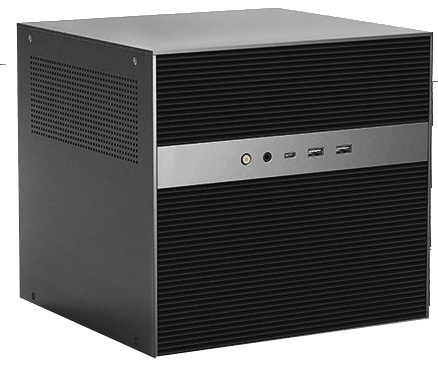
With the ever-growing market between turnkey solutions and complete DIY home service growing even larger, the expanding number of pre-built server solutions arriving in the market has become noticeably vast in 2023/2024. For a significant period, expensive and comparatively underpowered solutions from brands like Synology have faced competition from new players entering the private server scene. These newcomers are offering pre-built, server-grade solutions to consumers and small businesses, complete with software flexibility. We’ve discussed many of these in the past 12 months here on NAS compares. Today, however, I want to discuss possibly the most intriguing of all: the ZimaCube from IceWhale. Slated for launch on Kickstarter later this year, the ZimaCube follows the successful campaigns of the Zimaboard and Zimablade hackable solutions, both of which received considerable praise across various platforms. The ZimaCube dramatically enhances architecture, hardware, scalability, and power, promising potentially one of the most fully equipped pre-built solutions on the market. IceWhale mentions that this system will debut in two versions: the Zimablade quad and the Zimablade octa, targeting different users, budgets, and deployments. This approach ensures varied targeting but means that the campaign is managing two distinct products—something that has occasionally been challenging for other campaigns. We are discussing a crowdfunded NAS server, so expectations should remain grounded. However, this turnkey NAS solution (with its proprietary OS and support for open-source third-party systems) makes some incredibly ambitious claims. Let’s delve into the hardware and capabilities of the ZimaCube and assess whether this future Kickstarter NAS is worth your data.
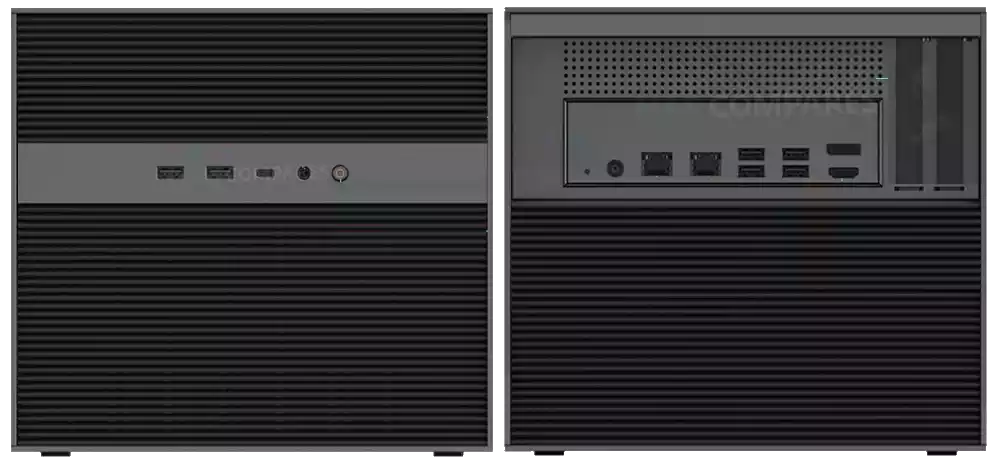
The Zimacube NAS Chassis Design
The first thing to note about this crowdfunded device is that the ZimaCube bears a striking resemblance in its hardware design to the popular Jonsbo N2 and N3 enclosures. This isn’t necessarily negative, as compact server cases have been a topic of interest over the past five years. Many would concur that Jonsbo has earned a formidable reputation in the NAS market for its enclosures. From the placement of individual SATA storage bays to the modular design of the ITX motherboard and port placement, there’s a clear similarity between the ZimaCube and Jonsbo N2 and N3 enclosures.
Psst.. Watch my Jonsbo N2 NAS Build Video HERE and my Jonsbo N3 Hardware Review HERE.
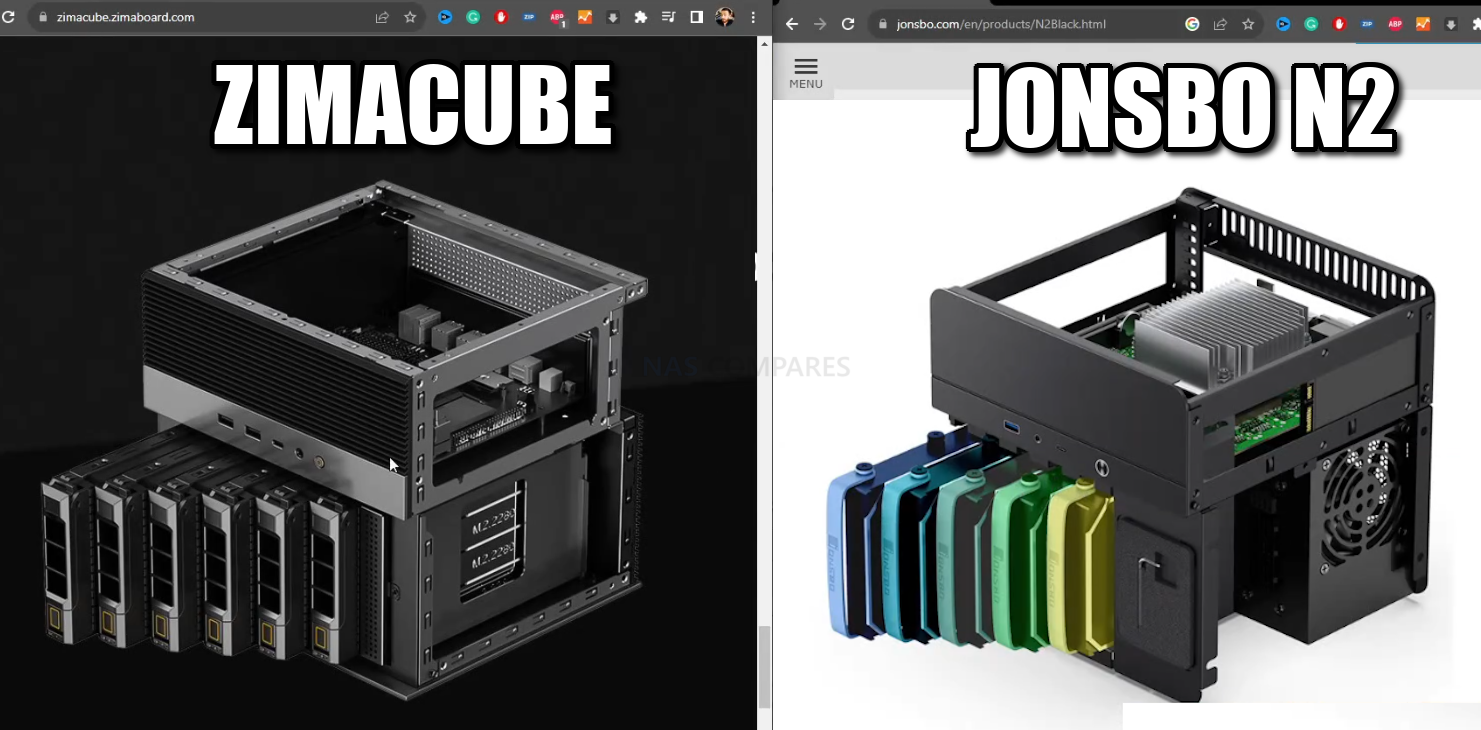
However, we should give IceWhale and the ZimaCube their due credit. Notable layout changes are evident. For instance, this system features six SATA storage bays, each accessible via a click-and-load tray, contrasting with Jonsbo’s slightly quirky and sometimes annoying rubber handles and plugs. Along with the six storage bays, there’s an added m.2 NVMe module that seemingly occupies what might have been a standard storage slot. Current designs don’t clarify whether these m.2 NVMe slots are accessible via the front panel or only through a removable side panel, linked to the motherboard’s underside via a subsidiary board. (UPDATE – IceWhale have confirmed that the M.2s are injected via a 2x/4x PCB that is loaded into a U.2/U.3 slot on the backplane, which can be removed to add/remove M.2 SSDs as needed). Still, in essence, you’re observing 10 mixed media storage bays. Depending on the device’s configuration, the architecture of those m.2 NVMe modules will likely differ based on the CPU and lanes allotted to the quad and octa versions. Both systems also seem to feature two additional m.2 NVMe bays on the main controller board, though their exact usage—whether occupied by SATA adapters or an OS drive for Casa OS—remains unconfirmed. With the extra PCI lanes the ZimaCube octa offers, there’s a good chance this model will support gen 4 compatibility, providing increased bandwidth for those m.2 NVMe modules.
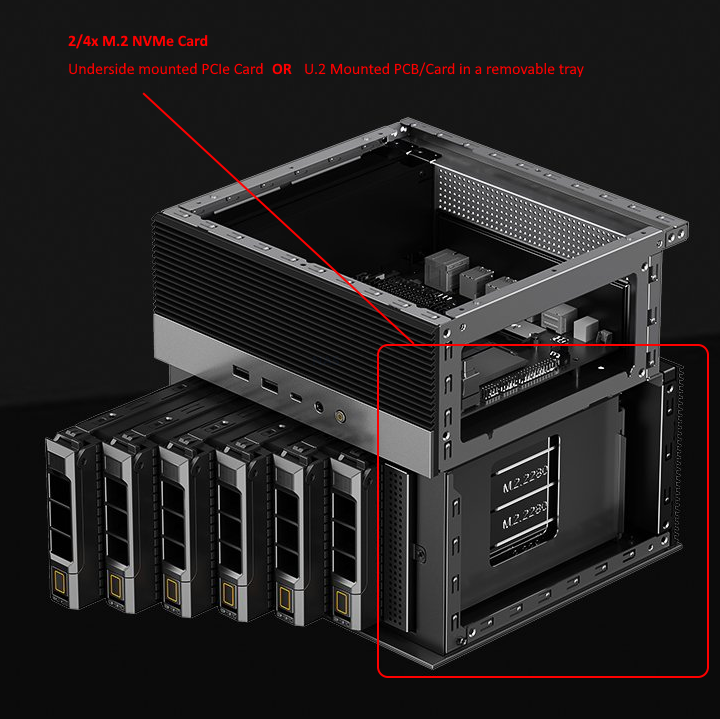
Like the Jonsbo case, the ZimaCube boasts extensive ventilation—and it certainly requires it. The system showcases a double ventilated front panel, ventilation on both sides, and 80% ventilation on the case’s rear. Information on active cooling with fans and their sizes isn’t confirmed yet, but there will undoubtedly be at least two fans on the case’s back. However, space seems limited for extra fans at the top rear panel. Considering the high-end CPU and hardware in this device, the choice of CPU fan will be debated. There’s ample hardware packed into this device. Given its relatively compact size, the heat it will generate is a concern. For instance, it wouldn’t be shocking if the four m.2 NVMe modules in such a tight space were limited to x1 or x2 speed, given the potential heat generation. We should reserve final judgment until we have a physical unit, but the substantial hardware within a limited space means that efficient cooling, both active and passive, will be crucial. It’s challenging to find flaws in the ZimaCube promotional materials. Although we don’t have the physical device, the case appears exceptionally well-designed. However, there’s a lot of hardware packed inside. Let’s dive deeper into the known hardware with which the ZimaCube will be equipped
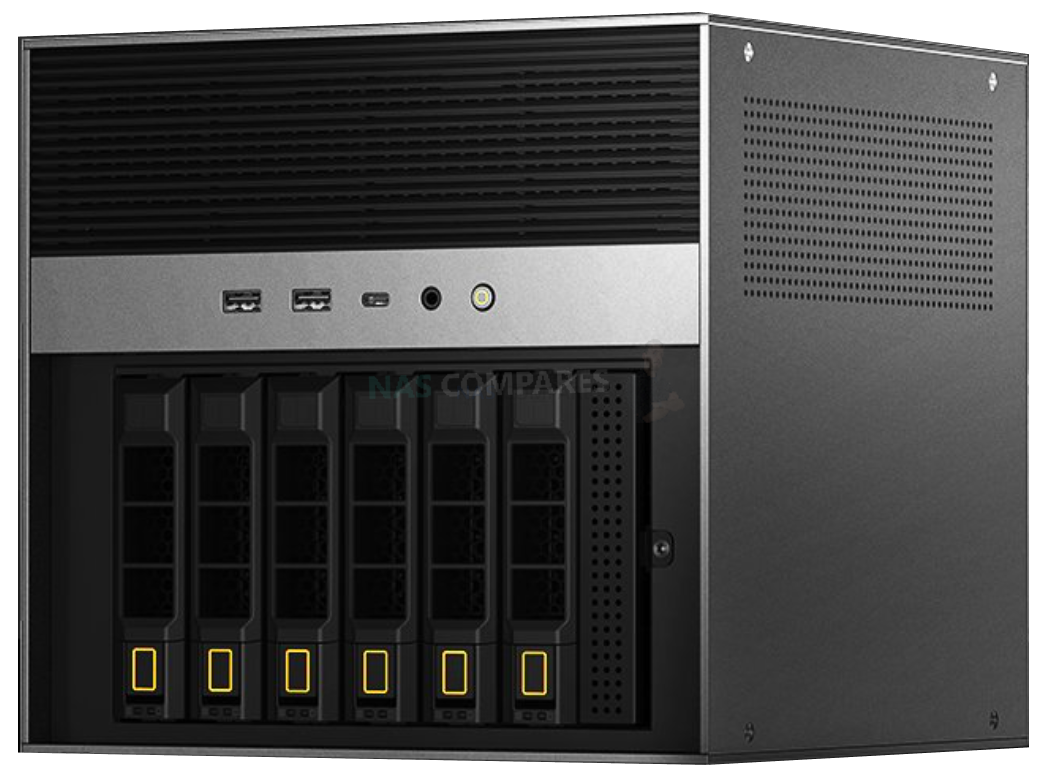
The Zimacube Hardware Specifications
Right off the bat, credit must be given to IceWhale for how they’ve presented the two available options proposed for the ZimaCube NAS. They offer a home and very small business option powered by the Alder Lake Intel N100 processor. Alongside this, they’re presenting a powerhouse option with a comparable 12th generation i5 version of the hardware. Dubbed the ZimaCube Quad and ZimaCube Octa, these systems will likely come with different price tags to reflect their distinct hardware architectures. While we’re discussing a crowdfunded NAS project still in development, it’s commendable that IceWhale recognizes the appeal of a powerhouse system for some users, while others may prioritize power efficiency and a more modest setup. However, this means we’re looking at a campaign promoting a single product in two different versions, and it’s crucial not to confuse the hardware capabilities of one with the other. It is still very early to make any kind of judgement on this system’s 24×7 operation, but (especially in the case of the Zimacube Octa) there is ALOT of hardware getting crammed into this comparatively small case and how this si going to be managing ventilation and cooling on the 4 (technically 6) M.2 NVMe SSD slots is going to be CRUCIAL! Here’s a brief overview of the specifications known so far:
| Model | Zimacube Quad
|
Zimacube Octa
|
| CPU | Intel N100 | Intel i5-1235U |
| Cores | 4 Core | 10 Core (2P + 8E) |
| Threads | 4 Threads | 12 Threads |
| Clock Speed | 1.0-3.4Ghz | 0.9-4.4Ghz |
| Integrated Gfx | Intel UHD Graphics, 750Mhx Max | Intel Iris Xe Graphics eligible, 1.2Ghz Max |
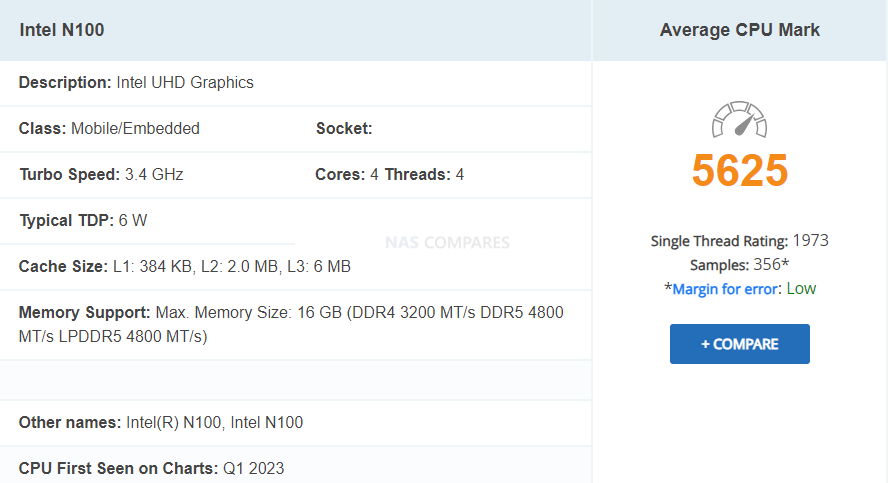 |
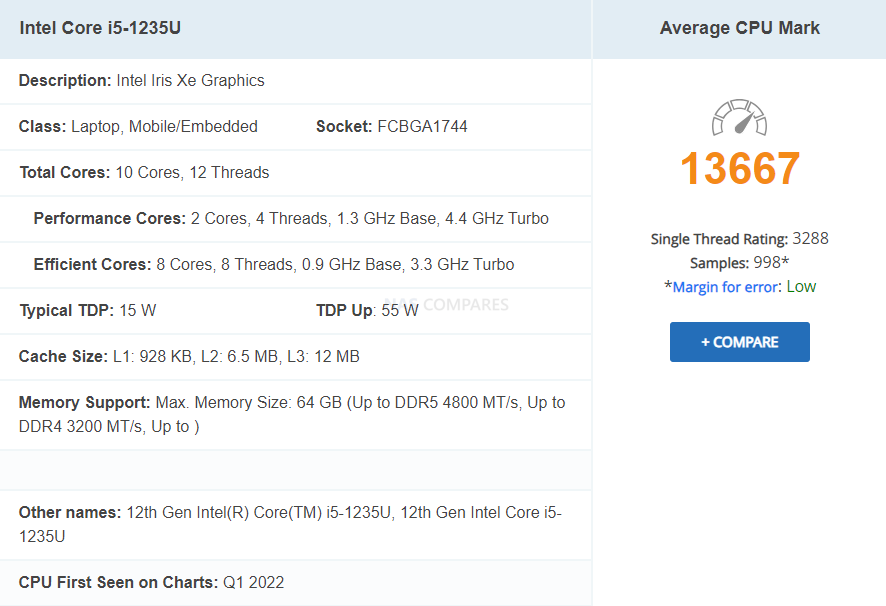 |
|
| Memory | 8/16GB* | 64GB |
| Memory Type | DDR4 | DDR5 |
| SATA slots | 6x 3.5”/2.5” | 6x 3.5”/2.5” |
| M.2 NVMe Slots | 4+2 | 4+2 |
| PCIe Slots | 1x Gen3x4 | 1x Gen4x16 |
| Network Ports | 2x 2.5GbE | 4x 2.5GbE |
| Thunderbolt | No | Yes, 2x Type-C |
| USB Type A | 4x USB 3.2 Gen 1 | 6x USB 3.2 Gen 1 |
| USB Type C | 1x USB 3.2 Gen 1 | 2x (TB4) |
| USB 2.0 | 2X | 0 |
| Visual Output | HDMI 2.0 and Display 1.4 | HDMI 2.0 and Display 1.4 |
| Chassis Size | 240 x 221 x 220mm | 240 x 221 x 220mm |
| Power | External 220W 19V PSU* | External 220W 19V PSU* |
The specifications are genuinely impressive, with some aspects unique in the current NAS market. Comparisons will likely be drawn to the ongoing StoreAccess Kickstarter NAS project that has been active throughout 2023. This project also promoted a unique mixed storage media build, with capabilities extending beyond a traditional NAS, encompassing a prosumer server, video editing station, and network management solution. Let’s delve into the highlights of these specifications. First and foremost, the network connectivity has both strong points and areas for improvement. The ZimaCube Octa, being the more potent system with a more capable CPU, provides more internal lanes and bandwidths and comes with more network interface ports. The ZimaCube Quad boasts two 2.5G network ports, and the Octa has four 2.5G ports. As promising as this sounds, some users eyeing the advanced specs of the Octa might feel the lack of 10GbE. However, this system allows for a 10GbE upgrade via a PCIe card, which isn’t unusual. There are also potential 10GbE to USB-C adapters to consider. Still, given the Octa’s robust hardware, it’s somewhat surprising that it didn’t include 10 gigabit ethernet out of the box.
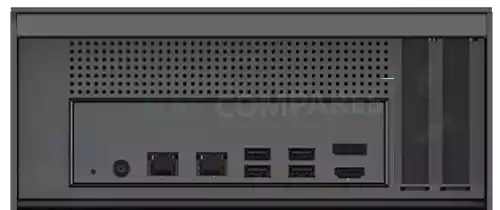
What genuinely stands out in these specs is the inclusion of Thunderbolt 4 connectivity. Given that the ZimaCube NAS is built on a more standard PC builder architecture, it’s unlikely to offer Thunderbolt NAS technology comparable to the QNAP Thunderbolt NAS series. QNAP has dominated this niche, allowing users to connect via ethernet and directly interface with the system over Thunderbolt. It’s doubtful the ZimaCube will provide this type of connectivity; more likely, these Thunderbolt ports are designed with the ZimaCube as the host, making them as usable as Thunderbolt ports on a typical PC or Mac system. If accurate, this means you could potentially connect expanded storage to this system at 40 gigabits per second bandwidth when needed. Additionally, external GPU cards via Thunderbolt expansion chassis and even Thunderbolt to 10GbE adapters might be supported, provided the necessary drivers can be integrated into the OS or the open-source operating system of choice. A Thunderbolt 4 NAS is rare outside of QNAP and their IP over Thunderbolt architecture, so this feature could make the ZimaCube NAS particularly appealing for some editors.
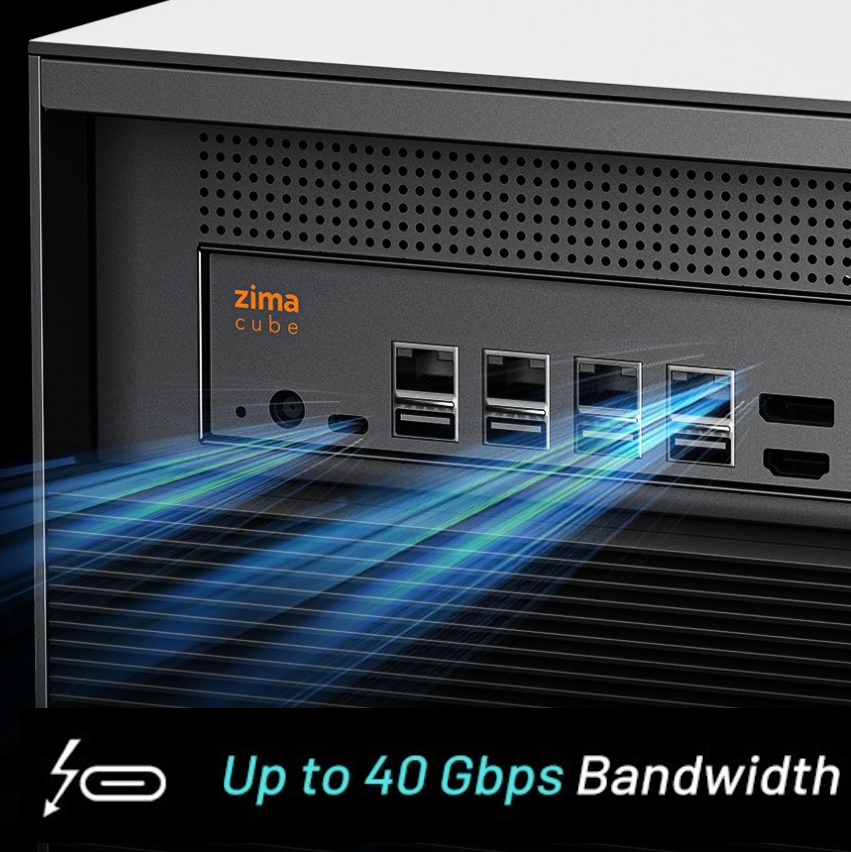
In terms of long-term expandability, the ZimaCube Octa sets its sights higher. Though both systems have a PCIe upgrade slot, they differ significantly in bandwidth and speed. Largely due to the CPU distinctions, the ZimaCube Quad comes with a Gen 3 x4 speed slot. This will permit moderate PCIe card upgrades for network performance and lighter storage cards, but the x4 speed could be limiting for more robust cards. On the other hand, the ZimaCube Octa features a Gen 4 x16 slot, offering a significant performance potential. Such a PCIe slot could be utilized for extensive M.2 NVMe storage upgrade cards, combination cards with vast gigabit network interfaces, or even high-end graphics cards. The height and length of supported cards within this chassis remain to be confirmed, but both systems offer substantial upgrade potential.
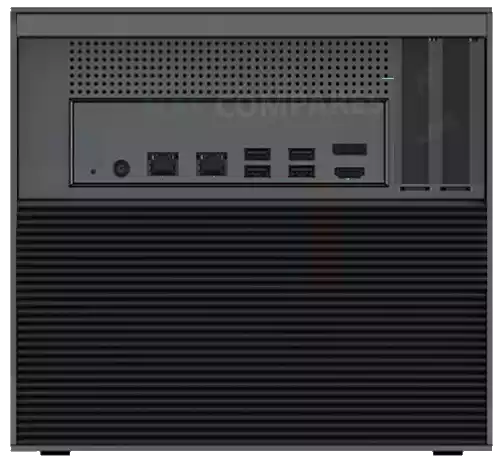
Given the system’s modular PC builder architecture, it’s unsurprising that it includes visual output. Both systems come with a 4K 60 frames per second HDMI 2.0 and DisplayPort 1.4 interface, facilitating local direct output for tasks like surveillance, multimedia, or even a local PC. Whether you’re configuring VMs or using tools like Proxmox to run multiple VMs, this system not only provides direct interfacing for daily tasks but also has the potential to run these operations alongside 24/7 storage when necessary. However, the output capabilities will largely depend on the chosen operating system. Still, having these options is always a boon. One aspect not yet confirmed is the power supply. All images of the ZimaCube NAS indicate the need for an external PSU. It’s possible that the system uses a front-loaded internal PSU, but the external power jack suggests the system might either use an internal extension or rely on a sizable external power brick. The ZimaCube won’t be unique in requiring an external PSU—many similar-sized NAS devices from established brands have external PSUs. Given the ZimaCube’s hardware architecture, an external PSU would need to be substantial. Instead of a small power brick, a heftier external power block, usually seen with high-end gaming laptops and Thunderbolt docking stations, would be required to maintain the high power input. Until full details emerge, the method and location of delivering the 220-watt power supply remain somewhat mysterious, potentially still in development by IceWhale during this Kickstarter NAS campaign’s early stages. All of these features result in a remarkably powerful NAS system that could challenge current expectations of NAS value. 2023 has seen numerous NAS devices bridge the gap between turnkey solutions and full DIY server building, ensuring users can utilize open-source software without the hands-on hassle. Given the global economic recession, the appeal of these hardware-optimized and budget-friendly solutions is likely to grow, with or without crowdfunding platforms facilitating their creation.
The Zimacube Casa OS Software
The landscape of personal cloud solutions is rife with options, each offering unique selling points. The Zimablade, entering this highly competitive space, packages its offering with CasaOS – a solution poised to redefine the relationship between hardware and software in the NAS ecosystem. But how does CasaOS fare, especially when set against stalwarts like Synology DSM, TrueNAS, and UnRAID? It’s tough to say at this stage. Objectively, it is always going to be a plus that a pre-build NAS solution arrives with it’s own first-party software (therefore making it truly Turnkey, as this device should work straight out the box), plus IceWhale state that the Zimacube will arrive with an improved version of CasaOS to better harness the hardware in this newer and more powerful system (as opposed to the comparatively light version of CasaOS included with the more modest Zimablade and Zimaboard). This updated firmware revision, is scheduled to roll out on ZimaOS-ready devices from late October/Nov 2023 and will have many of the same features as CasaOS, but it will also have remote backups, Thunderbolt optimization, RAID support and GPT AI-powered chat functions.
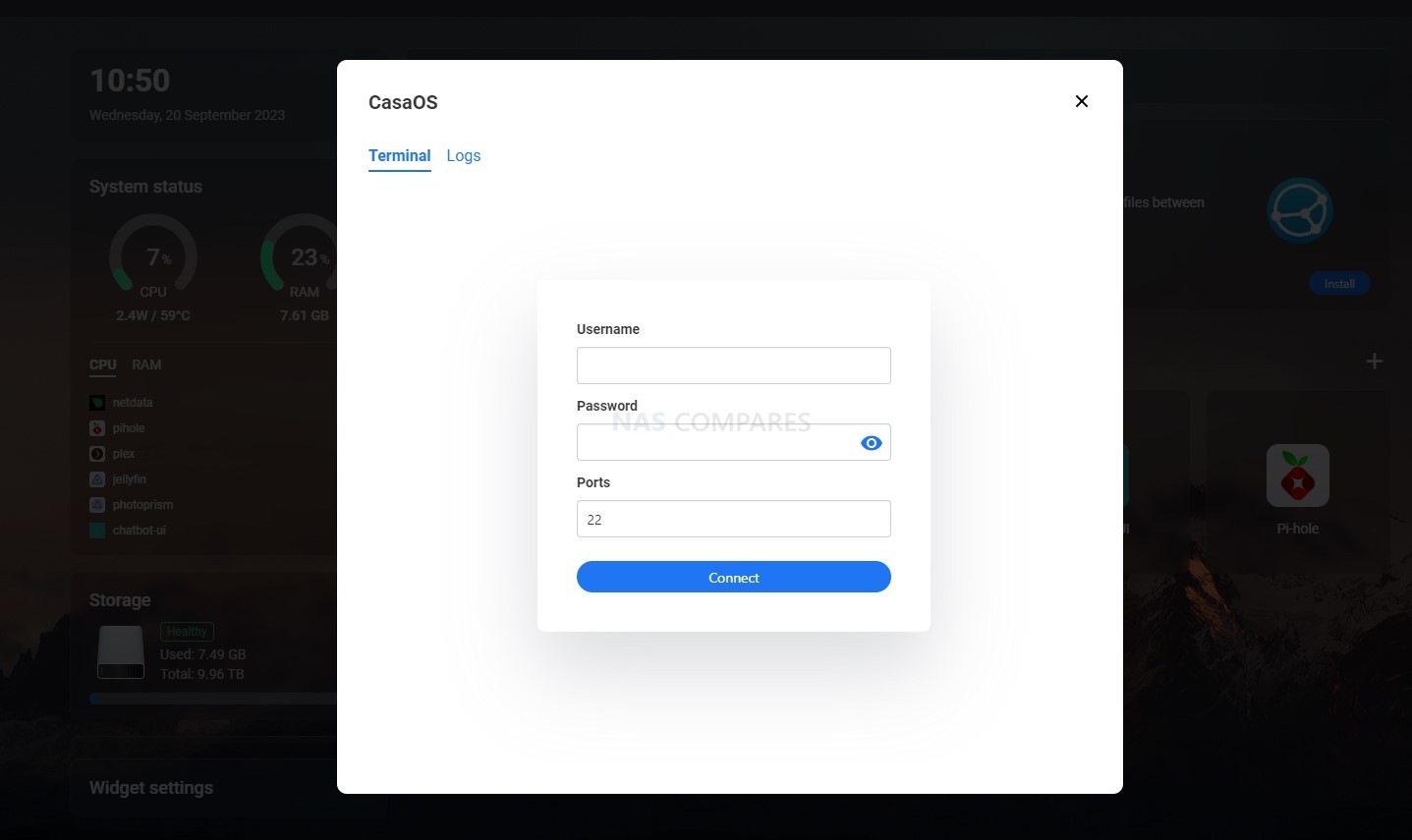
We were able to test a great deal of the features of CASA Os in our Zimablade review, as well as covering them more ‘bullet-point’ style in our before you buy video HERE, but some highlights came from the simplicity of container deployment and ease/speed of accessing the GUI, as well as switching to command level SSH when needed. (the following comes from our Zimablade review)
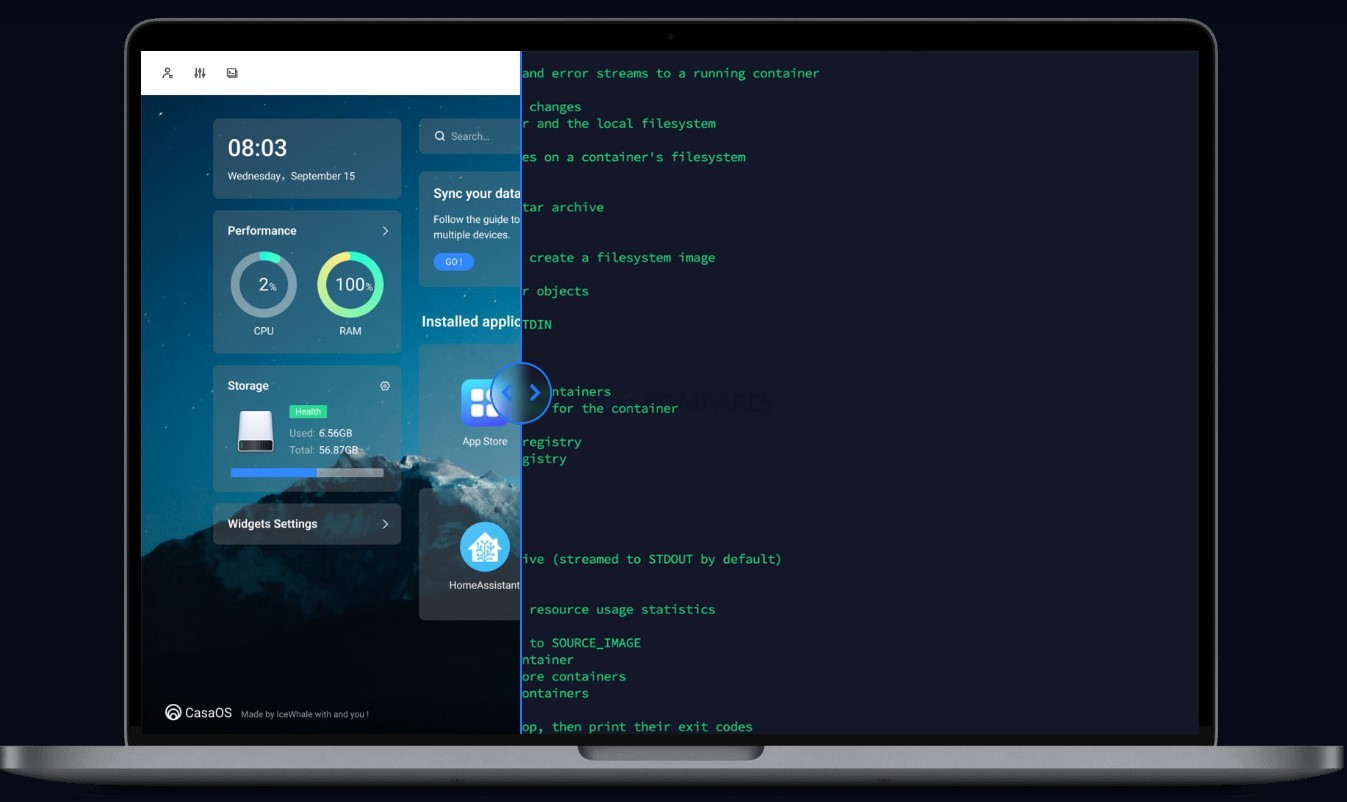
- Digital Privacy at the Forefront: CasaOS, developed by the visionary team at IceWhale Technology, centers its design philosophy around safeguarding family data. Offering tools for encrypted communications, centralized multimedia storage, and smart home device management, CasaOS prioritizes digital safety in an age where data breaches are commonplace.
- Expansive Application Universe: With over 20 pre-installed docker-based apps and 50+ community-verified ones, CasaOS provides users with a veritable buffet of digital tools. Whether you’re into home entertainment, require VPN solutions, or are seeking quality streaming apps, CasaOS has you covered.
- Holistic Data Management: CasaOS consolidates data storage, eliminating the need to juggle between platforms like Dropbox or Google Drive. With a promise of rapid 10x syncing speed and no associated data traffic or subscription fees, CasaOS champions efficient data management.
- Comparative Lightness: While CasaOS supports a plethora of container applications, when benchmarked against established players like Synology DSM, TrueNAS, and UnRAID, it does come across as lite. Features such as ZFS support and 1st party mobile applications are conspicuous by their absence, leading to a heavier reliance on 3rd party container/docker apps.
- Gradual Transition to More Established Platforms: CasaOS, while robust in its offering, might be seen by many as a nascent stage in their NAS journey. As users grow accustomed to the intricacies of NAS operations, there’s a likelihood they may transition to a more comprehensive NAS OS. Platforms like UnRAID, with similar ease in container deployment but richer in 1st party features, often appear more attractive in the long run.
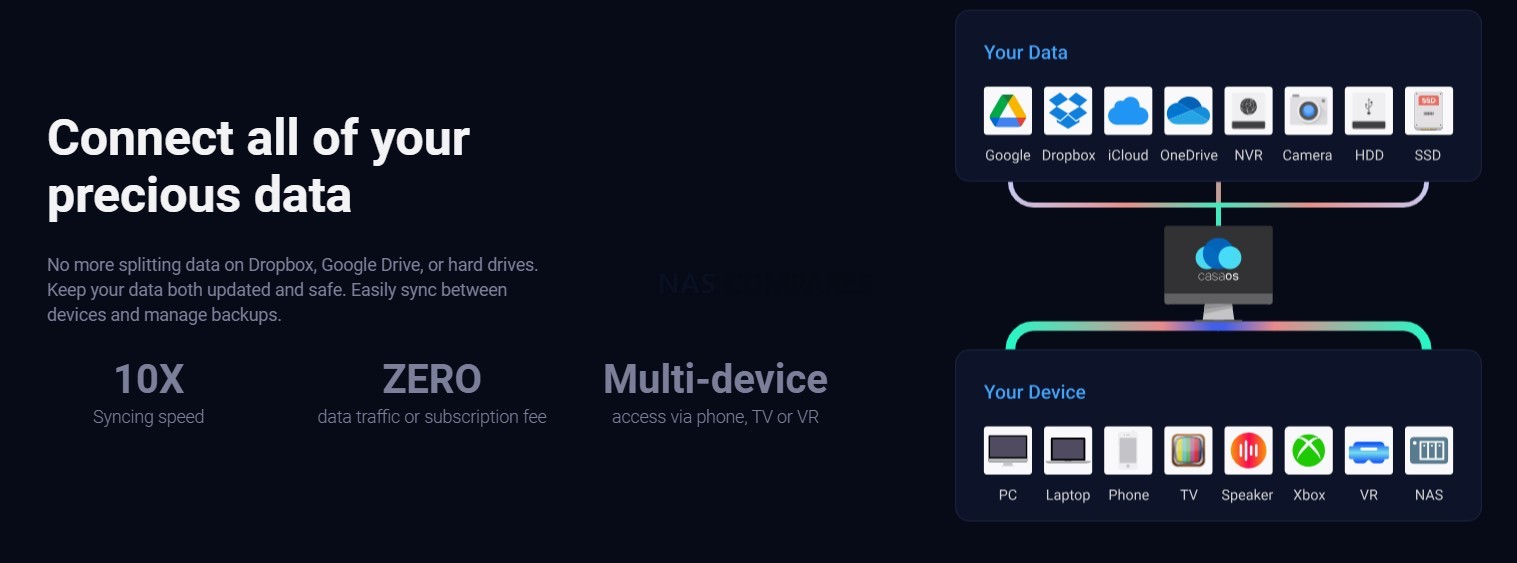
- Value Proposition: The inclusion of CasaOS with the Zimablade, zimaboard and now Zimacube, especially at its introductory price range during its crowdfunding launch, is commendable. The synergy of hardware and software at this price point offers exceptional value for beginners. However, seasoned NAS enthusiasts might crave the depth found in mature OS offerings in the market. That said, it does allow for both local easy GUI access in a web browser AND terminal level access easily:
The Zimablade, paired with CasaOS, makes a compelling entry into the personal cloud solution domain. CasaOS, with its focus on user-centric design, data privacy, and a wide array of applications, sets a solid foundation. However, as with many products in their infancy, there’s potential room for evolution and growth. Users looking for a lite, budget-friendly introduction to the world of NAS will find Zimablade and CasaOS an excellent starting point. Yet, as their needs expand and mature, migration to more established platforms might be on the horizon. Still, better to have a great ‘out-the-box’ OS included for day 1, than not!
Also, the Casa OS will immediately boot on day 1, so no need to muck around with Bios with a visual output+Keyboard+mouse on day 1, as it will immediately appear on the network on your first boot in a few mins and be accessible via your web browser. All in all, especially at this price point, incredibly impressive, if a little lite. If you want to test out the CasaOS software before you purchase a system to run it on (Zimablade or otherwise), you can use the link below to test the software out in your web browser:
Click Below to access Casa OS Software Demo in your web browser
When Is the Zimacube NAS Being Released?
As of now, the ZimaCube Kickstarter campaign hasn’t started, but you can register your interest via the email box on the product’s official page. Pricing remains unconfirmed, but if the Zimaboard and Zimablade crowdfunding campaigns run by the company in the past 18 months are any indication, we can expect competitive pricing for both systems. While IceWhale doesn’t employ a loss leader strategy, they’ve successfully offered early access to their last two releases at incredibly affordable rates (recall the Zimablade priced at just $64?). Thus, it’s anticipated that these systems will be priced just slightly above the cost of individually sourced components, at least during the crowdfunding phase. The timeline for product delivery, inherent to many crowdfunded NAS systems, can be somewhat ambiguous, often adopting a “done when it’s done” approach. However, given IceWhale’s past success in crowdfunding, it’s reasonable to anticipate an early to mid-2024 launch for the ZimaCube. Be sure to register your interest on the official page to stay informed about the Kickstarter’s launch. We’re eager to review the ZimaCube on NAS Compares when it becomes available!
(The Kickstarter link below will open in a new Tab and direct you to the ZimaCube Official Page)
📧 SUBSCRIBE TO OUR NEWSLETTER 🔔
🔒 Join Inner Circle
Get an alert every time something gets added to this specific article!
This description contains links to Amazon. These links will take you to some of the products mentioned in today's content. As an Amazon Associate, I earn from qualifying purchases. Visit the NASCompares Deal Finder to find the best place to buy this device in your region, based on Service, Support and Reputation - Just Search for your NAS Drive in the Box Below
Need Advice on Data Storage from an Expert?
Finally, for free advice about your setup, just leave a message in the comments below here at NASCompares.com and we will get back to you. Need Help?
Where possible (and where appropriate) please provide as much information about your requirements, as then I can arrange the best answer and solution to your needs. Do not worry about your e-mail address being required, it will NOT be used in a mailing list and will NOT be used in any way other than to respond to your enquiry.
Need Help?
Where possible (and where appropriate) please provide as much information about your requirements, as then I can arrange the best answer and solution to your needs. Do not worry about your e-mail address being required, it will NOT be used in a mailing list and will NOT be used in any way other than to respond to your enquiry.

|
 |
Minisforum G7 Pro Review
CAN YOU TRUST UNIFI REVIEWS? Let's Discuss Reviewing UniFi...
WHERE IS SYNOLOGY DSM 8? and DO YOU CARE? (RAID Room)
UniFi Routers vs OpenWRT DIY Routers - Which Should You Choose?
WHY IS PLEX A BIT S#!t NOW? IS 2026 JELLYFIN TIME? (RAID Room)
Synology FS200T NAS is STILL COMING... But... WHY?
Access content via Patreon or KO-FI
Discover more from NAS Compares
Subscribe to get the latest posts sent to your email.


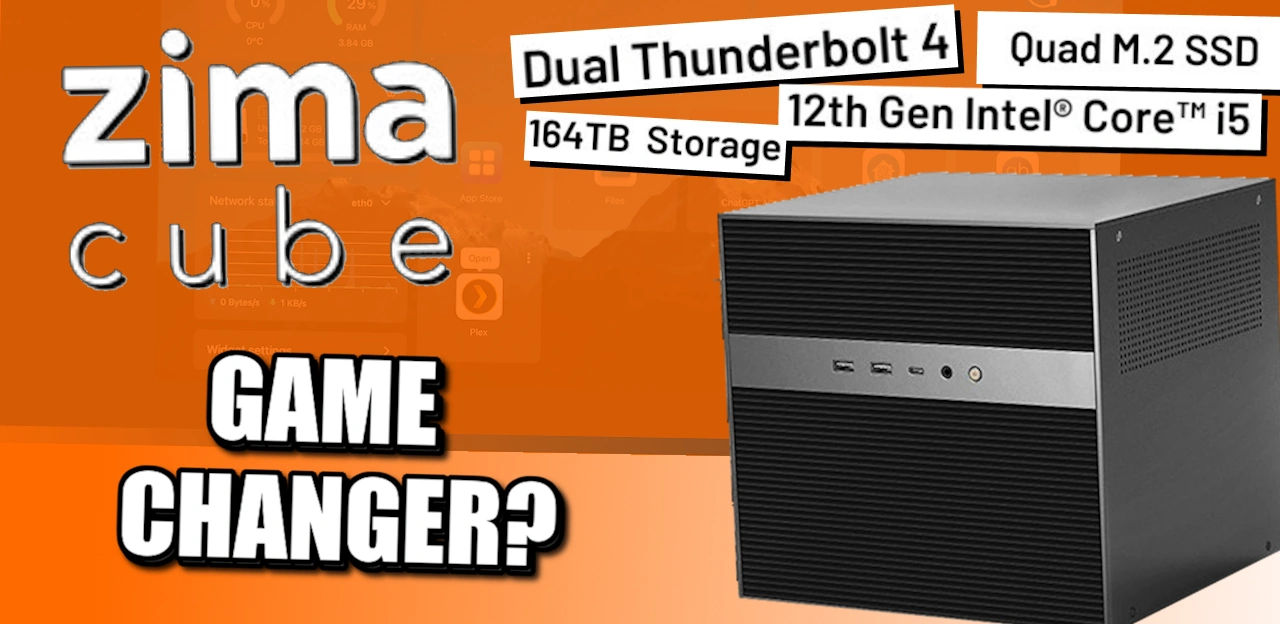
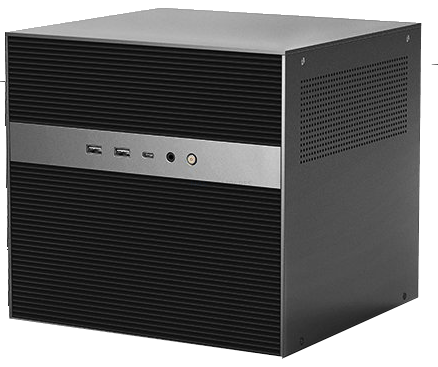
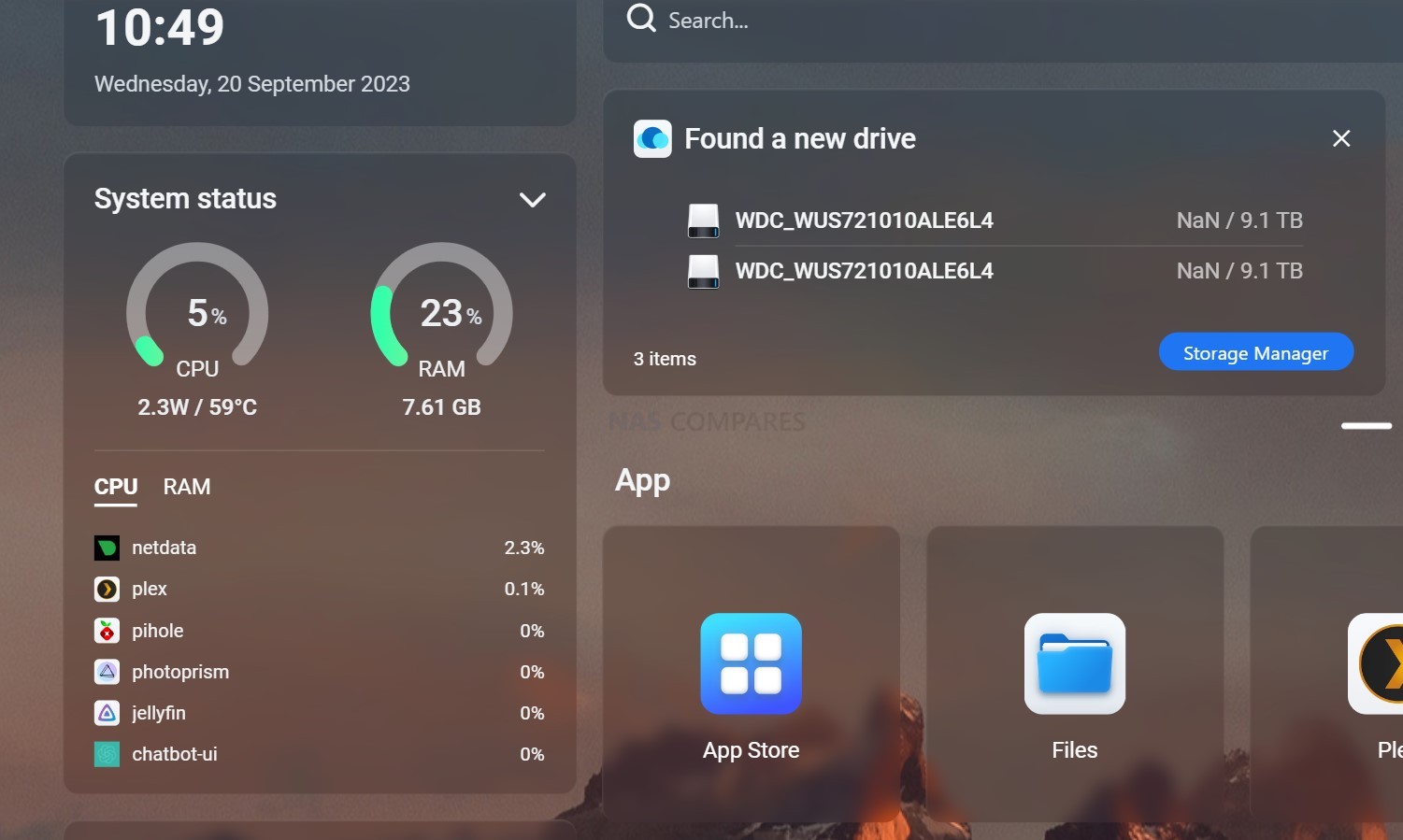
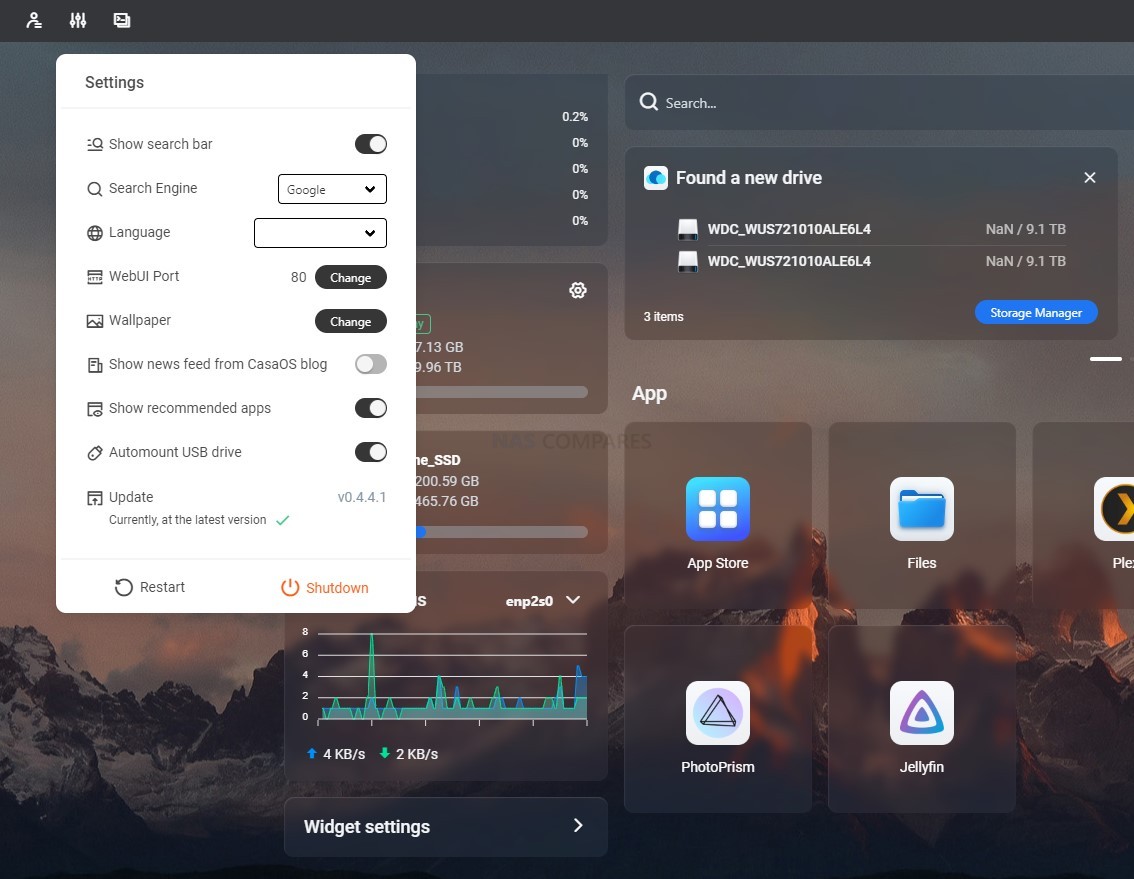
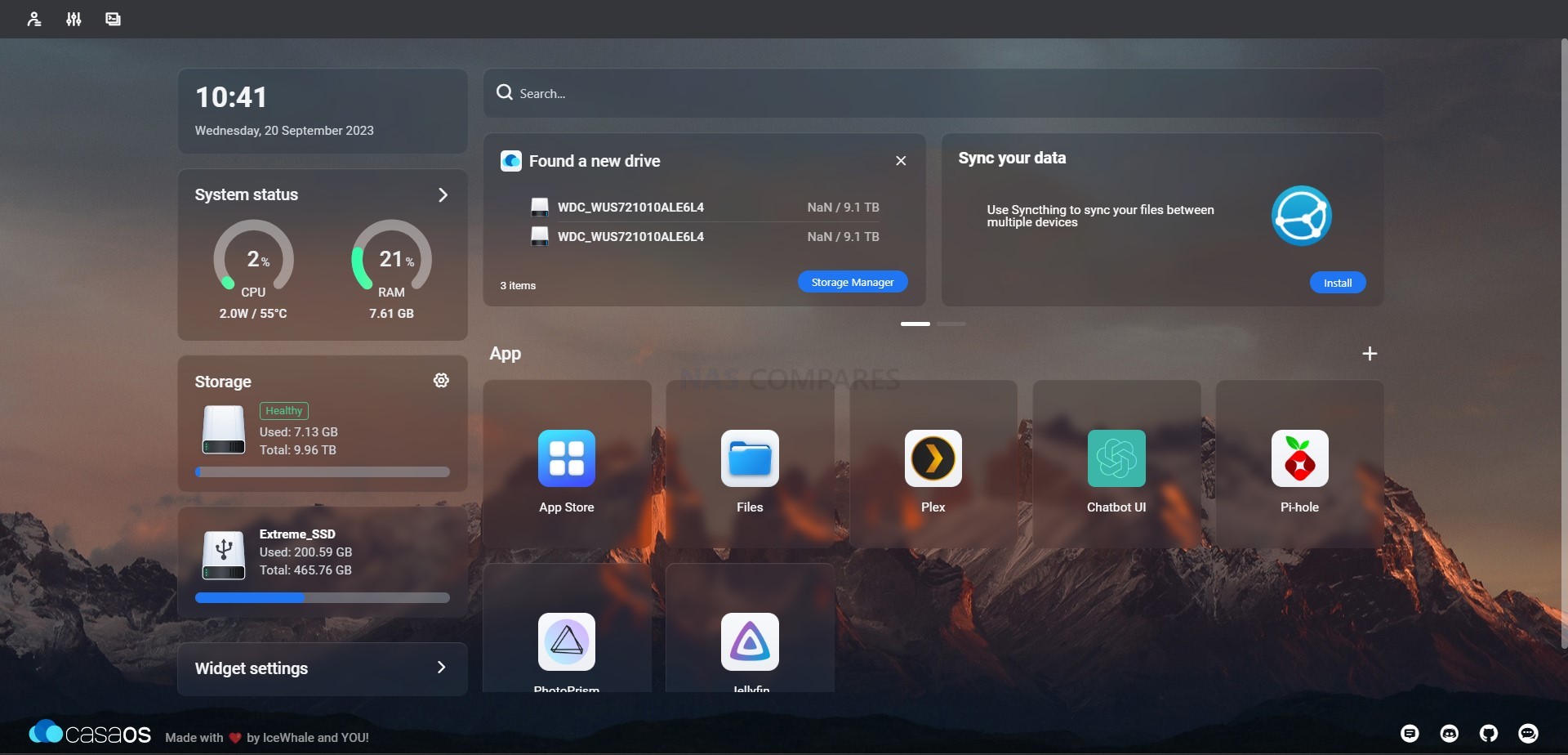
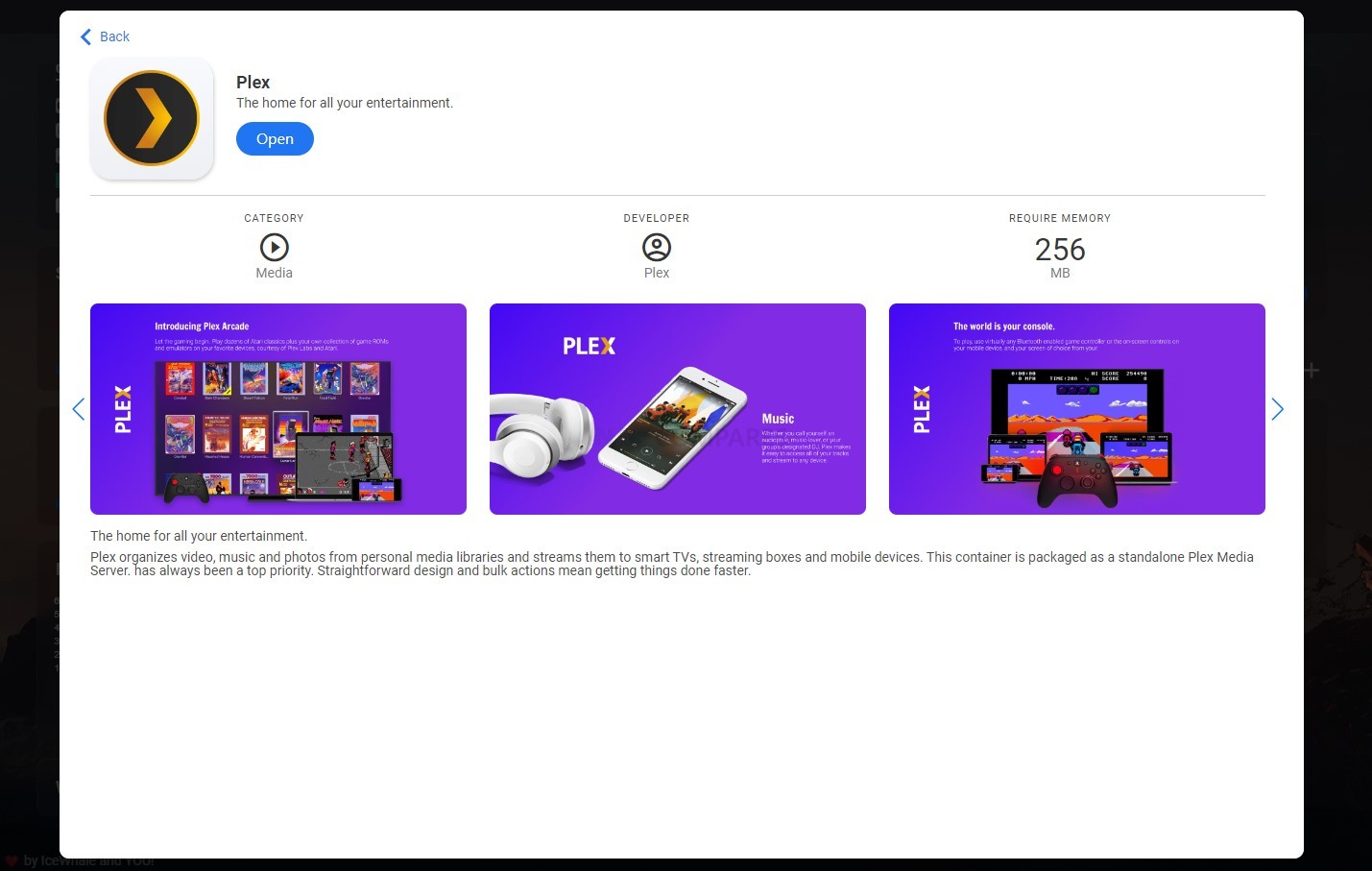
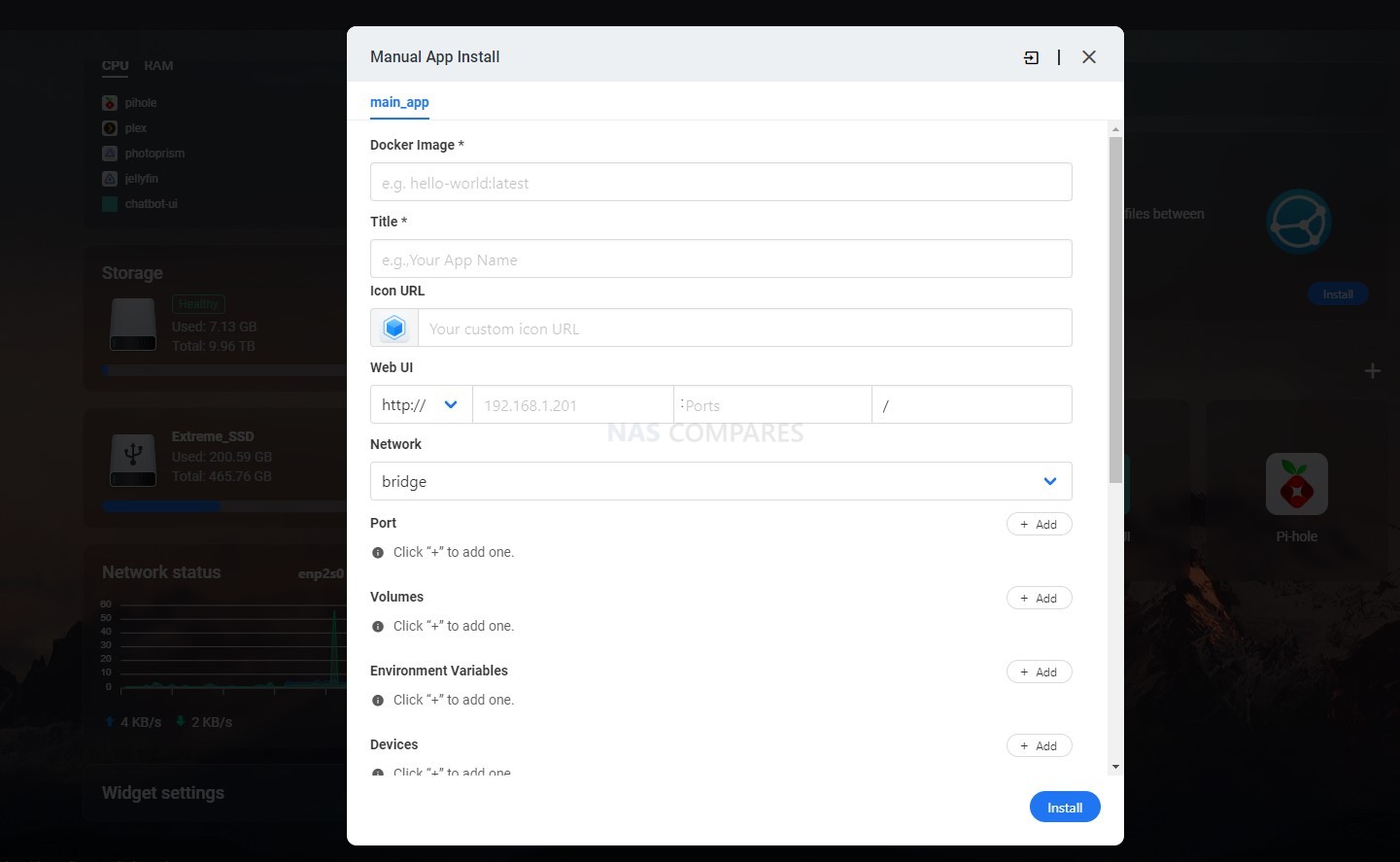
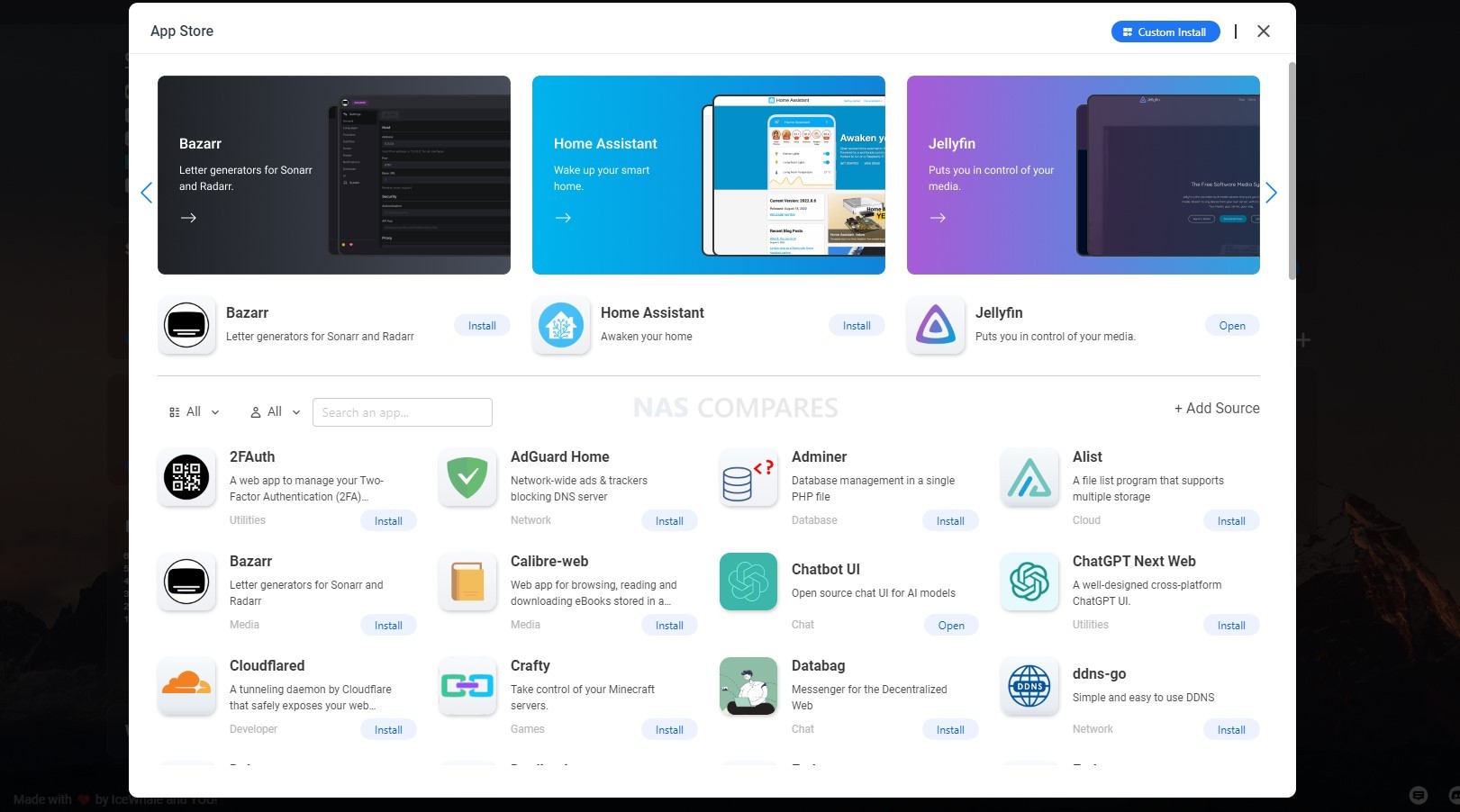
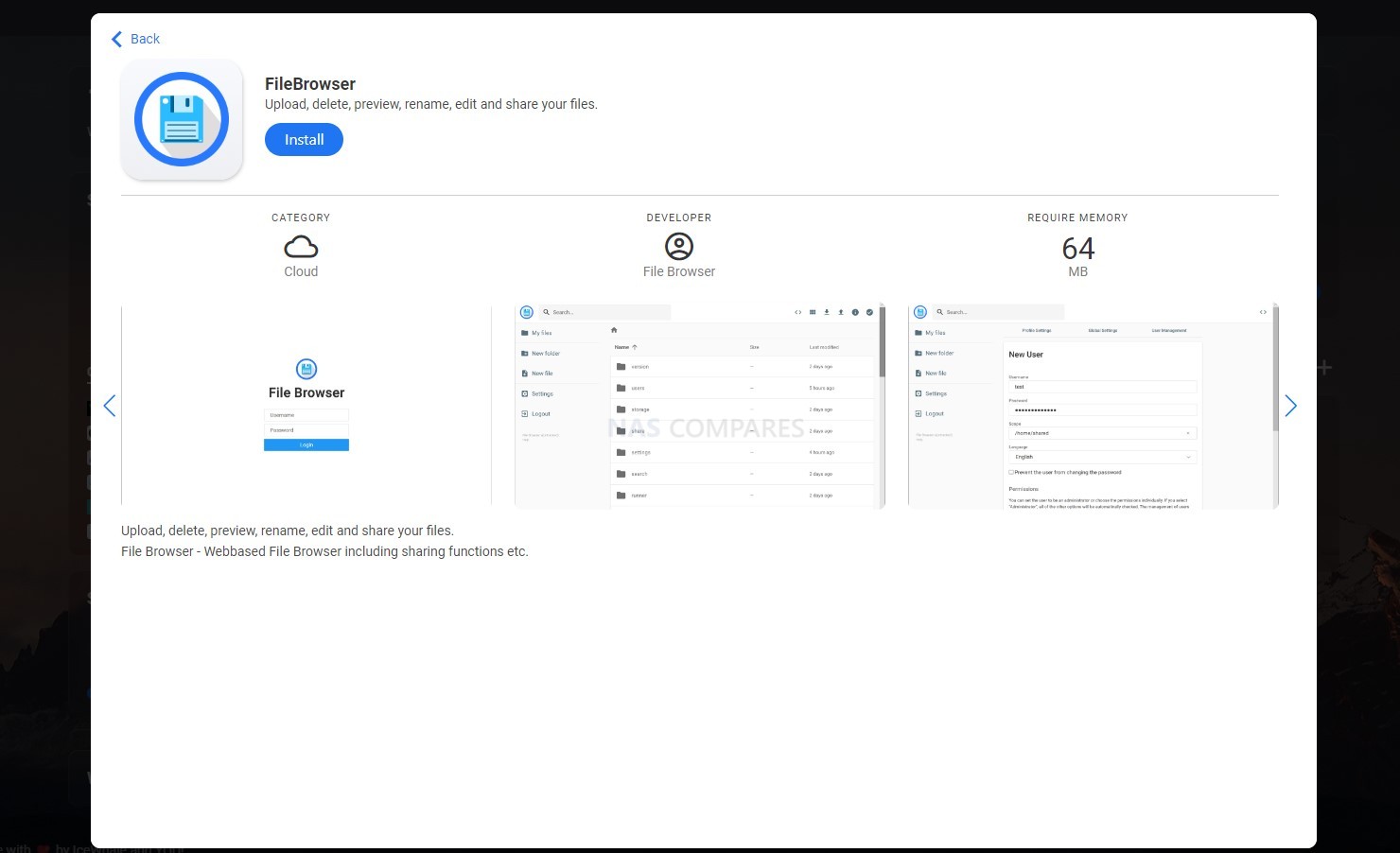
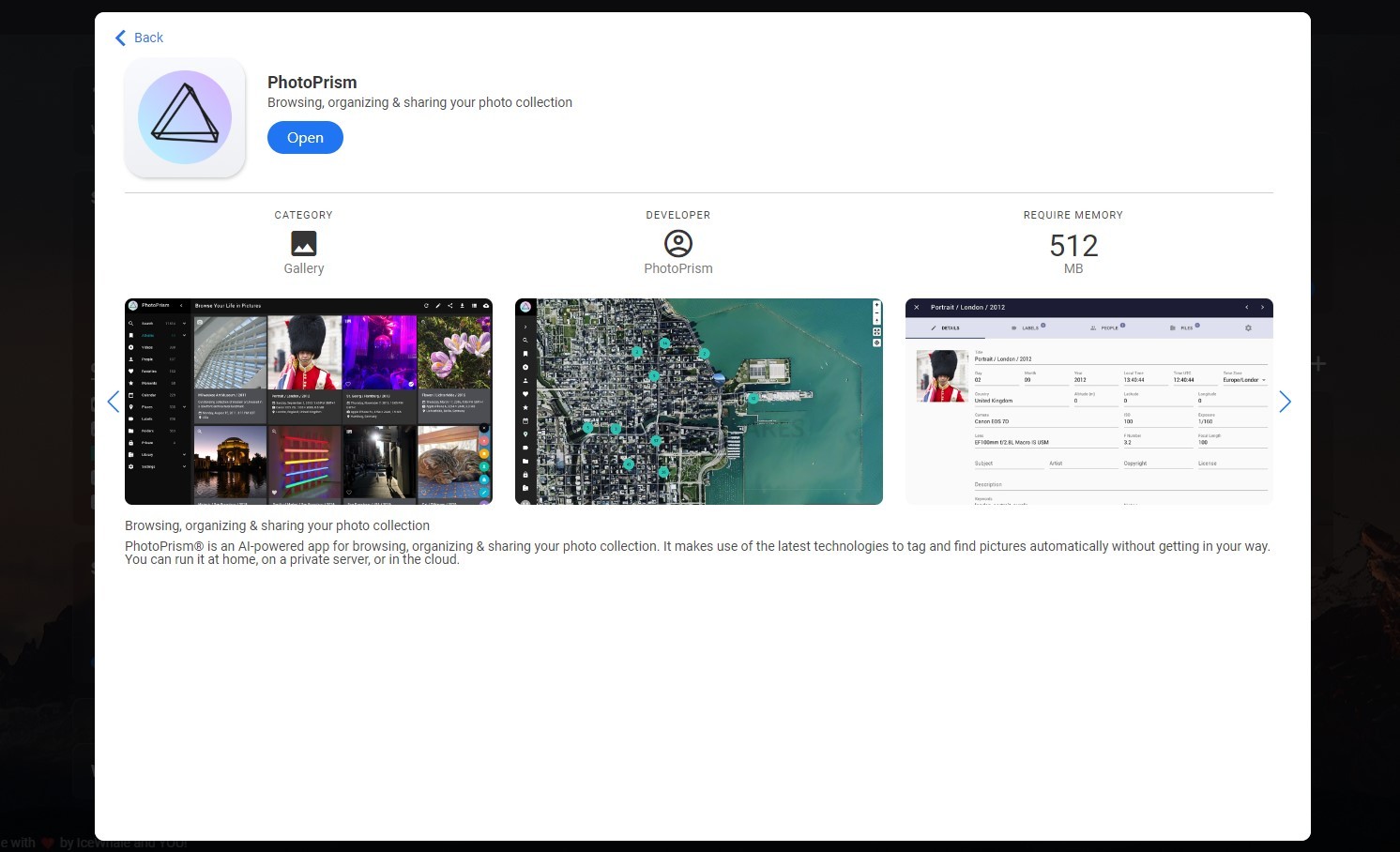
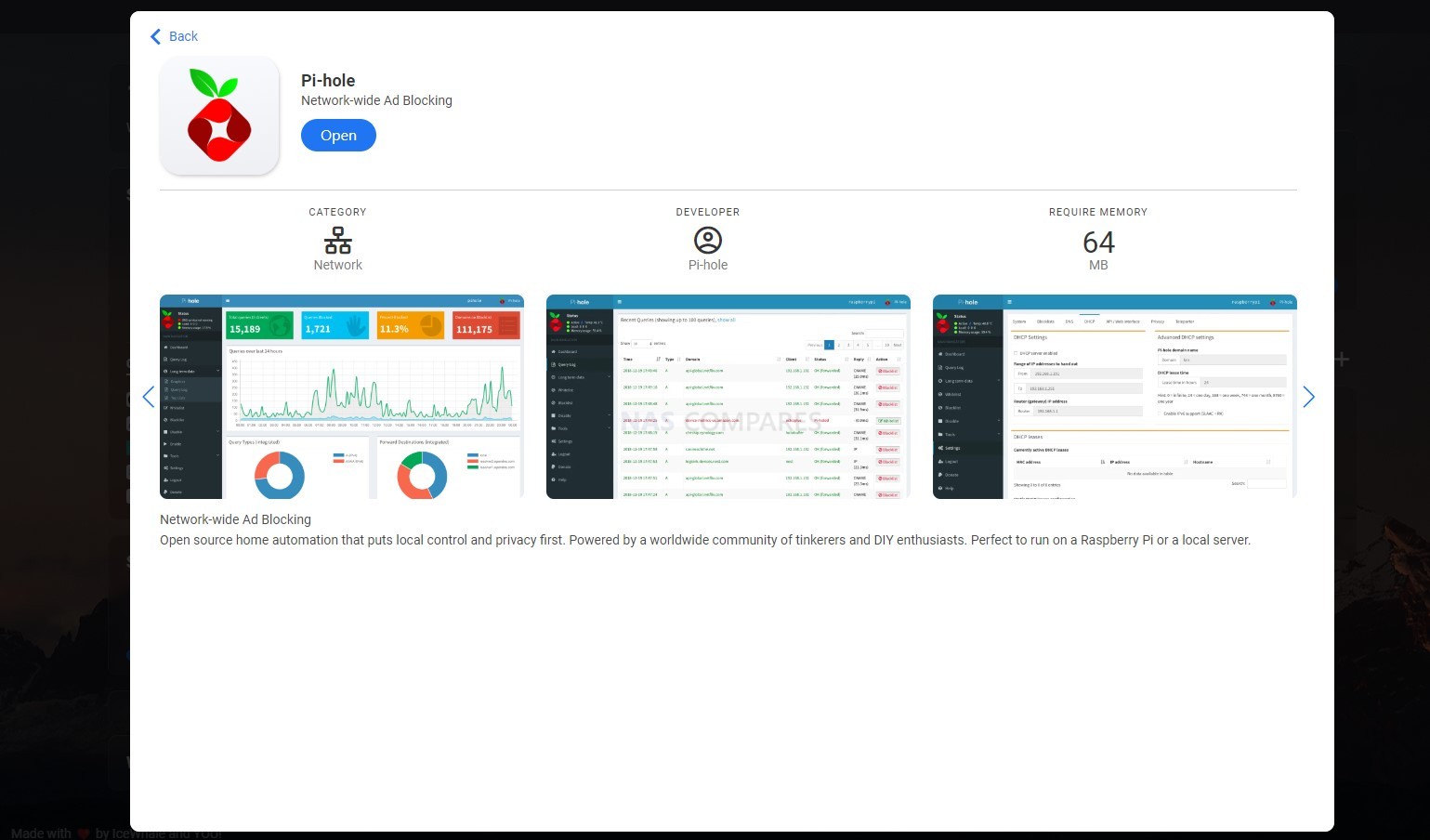
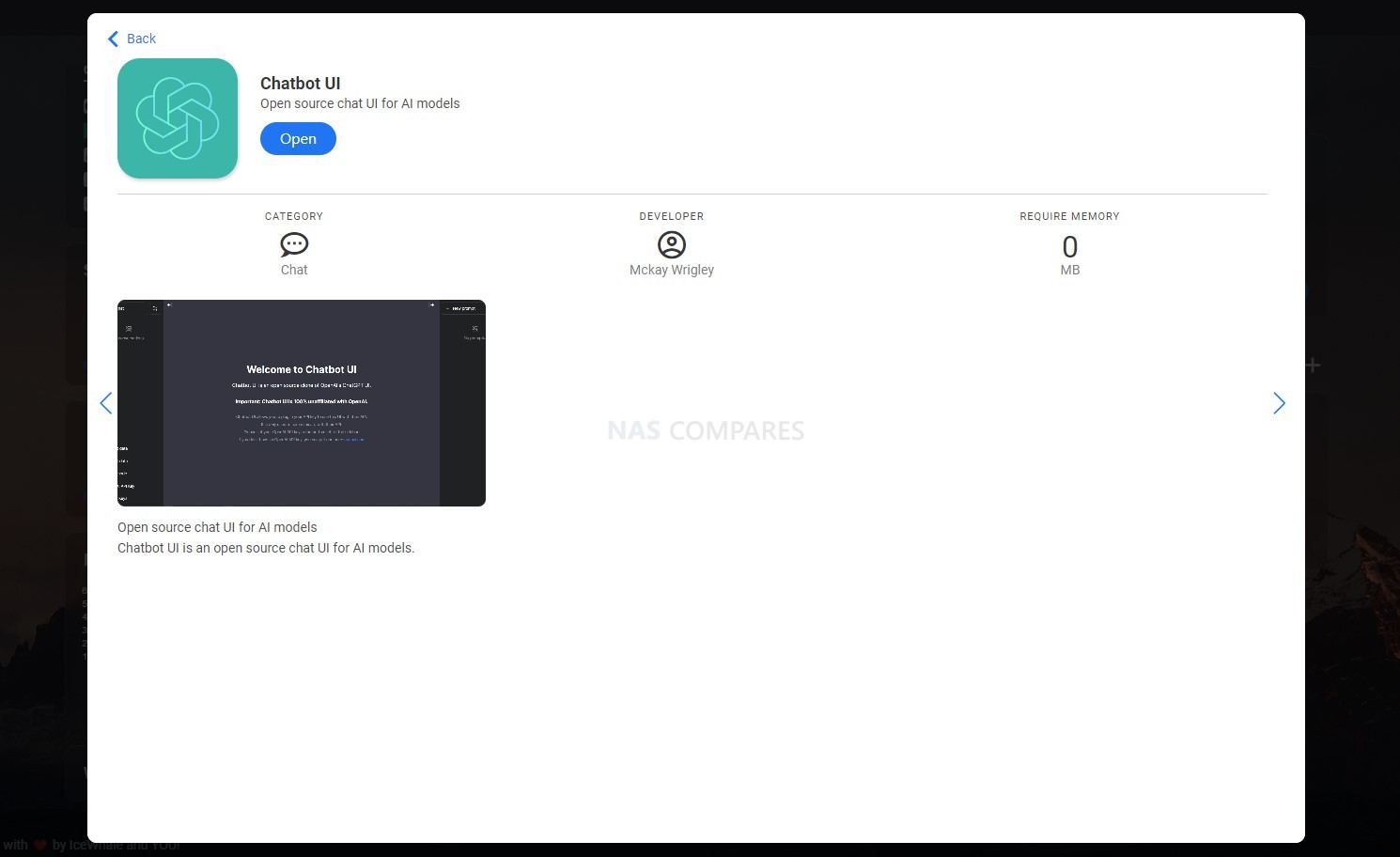
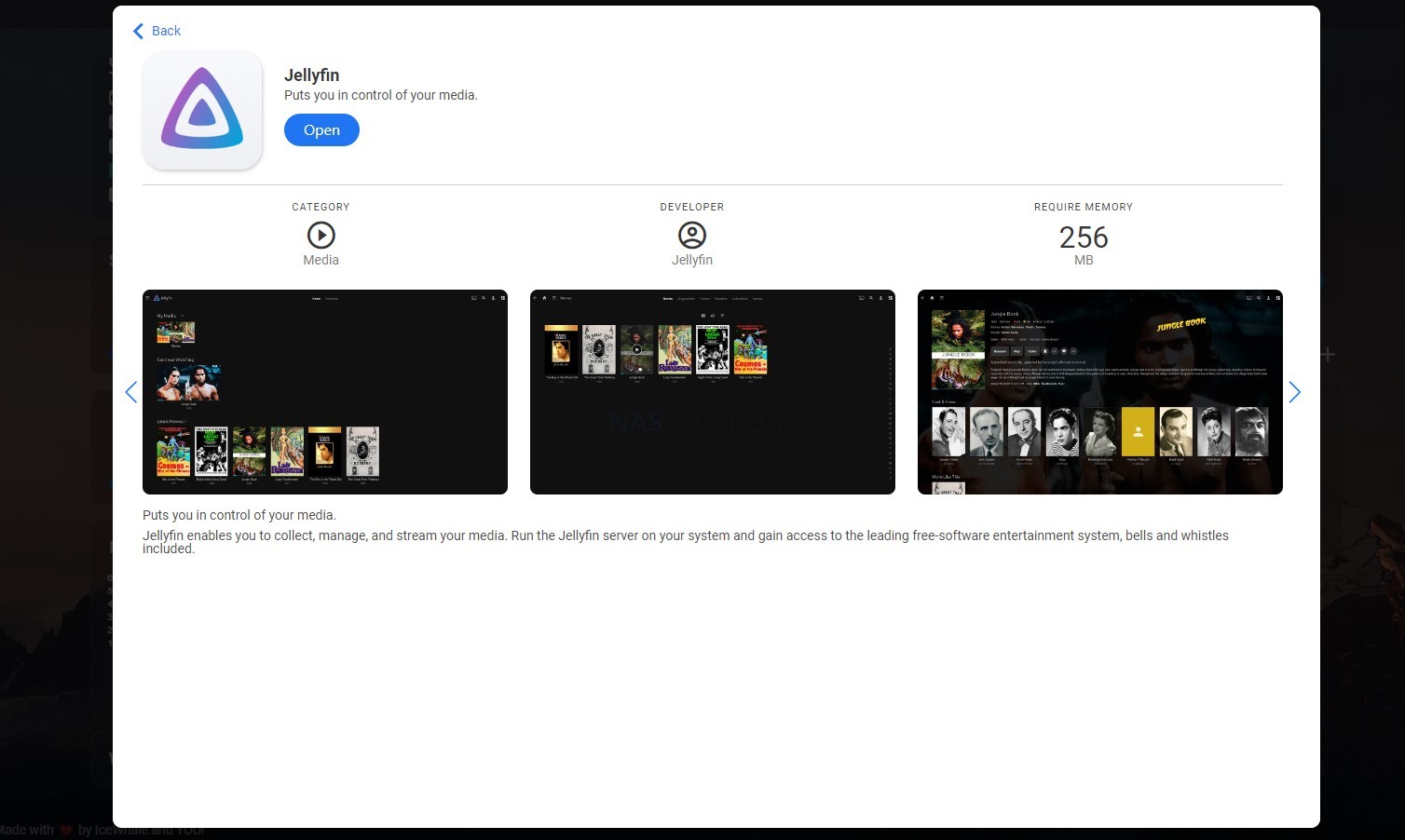
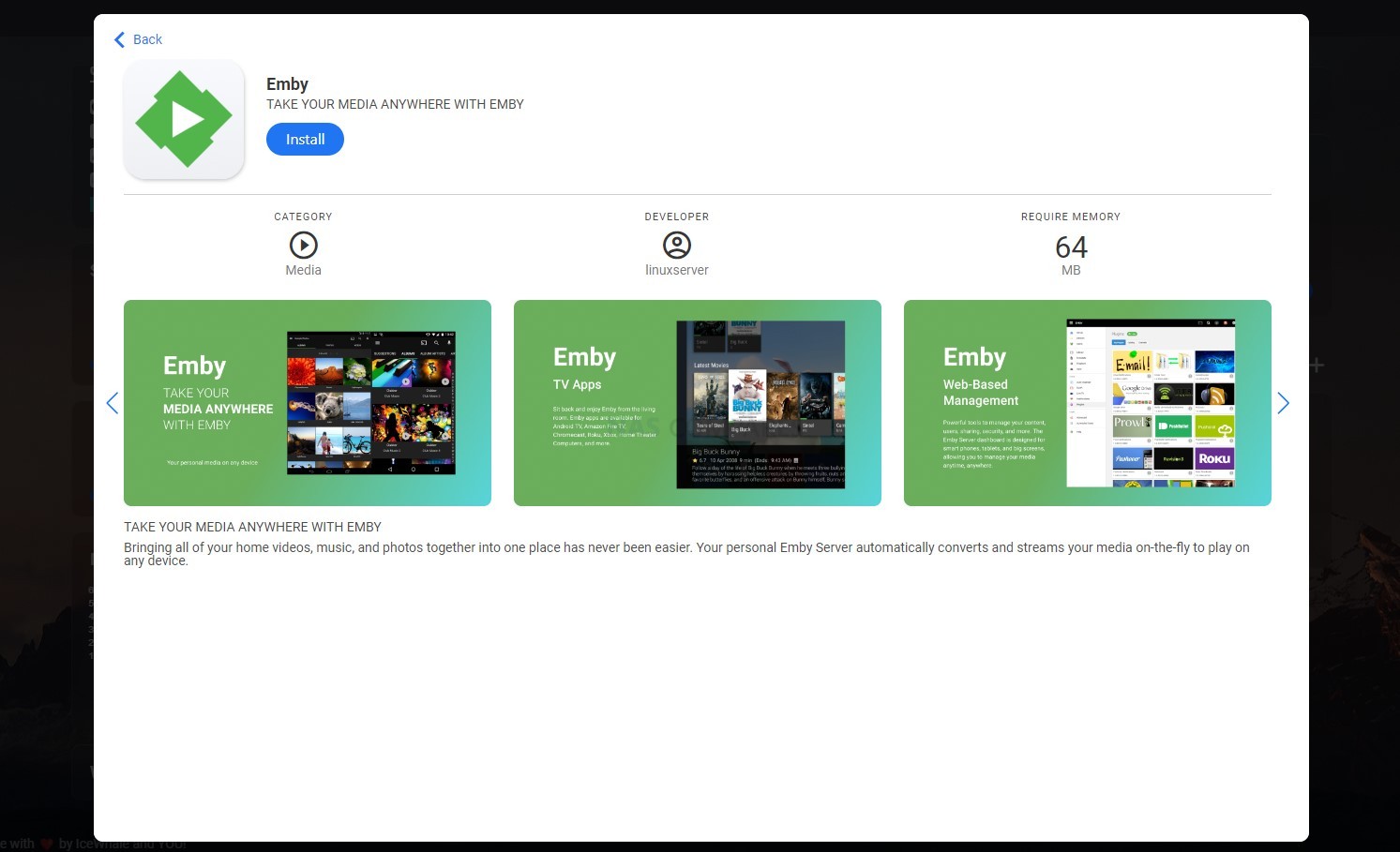
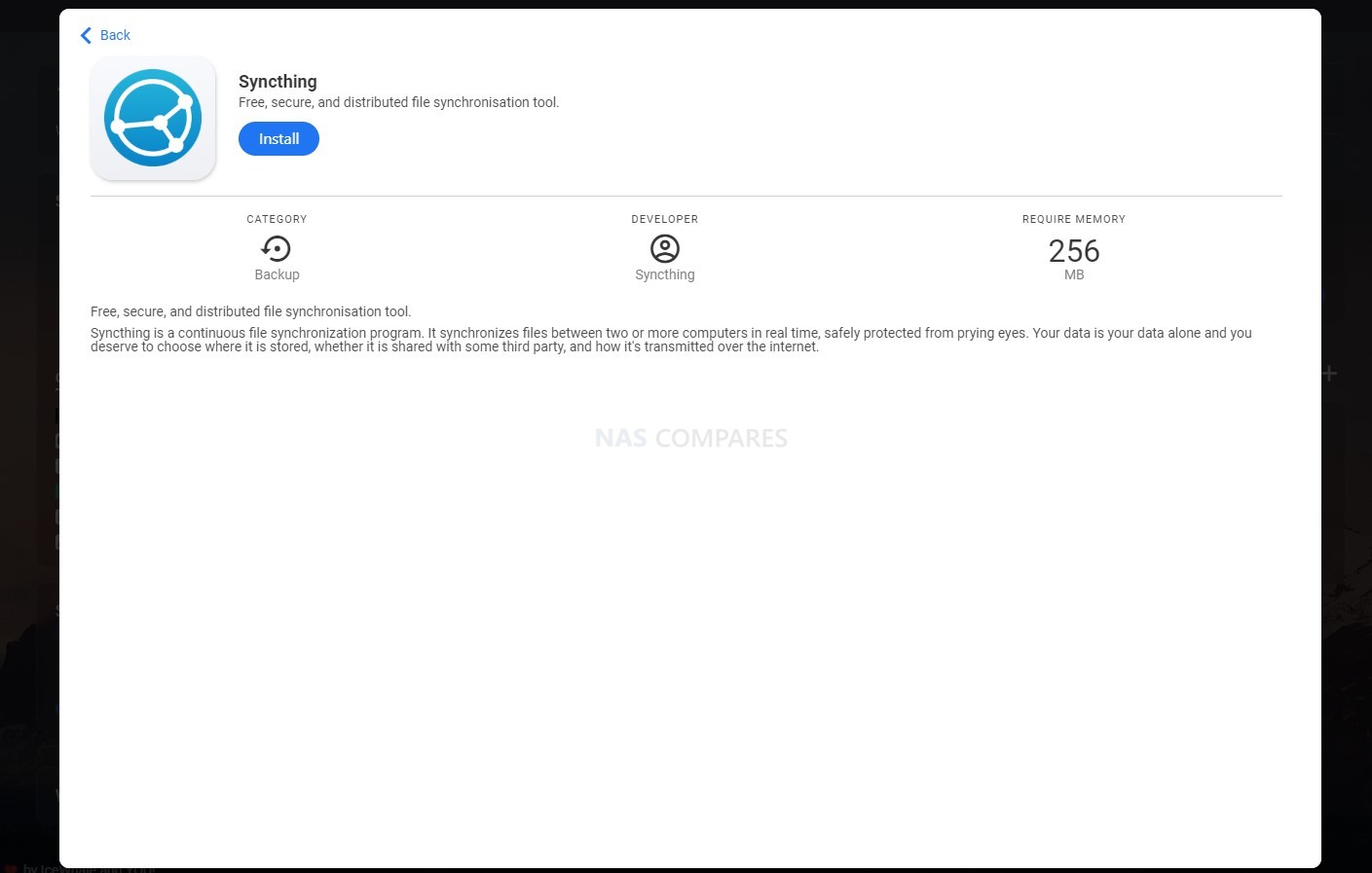
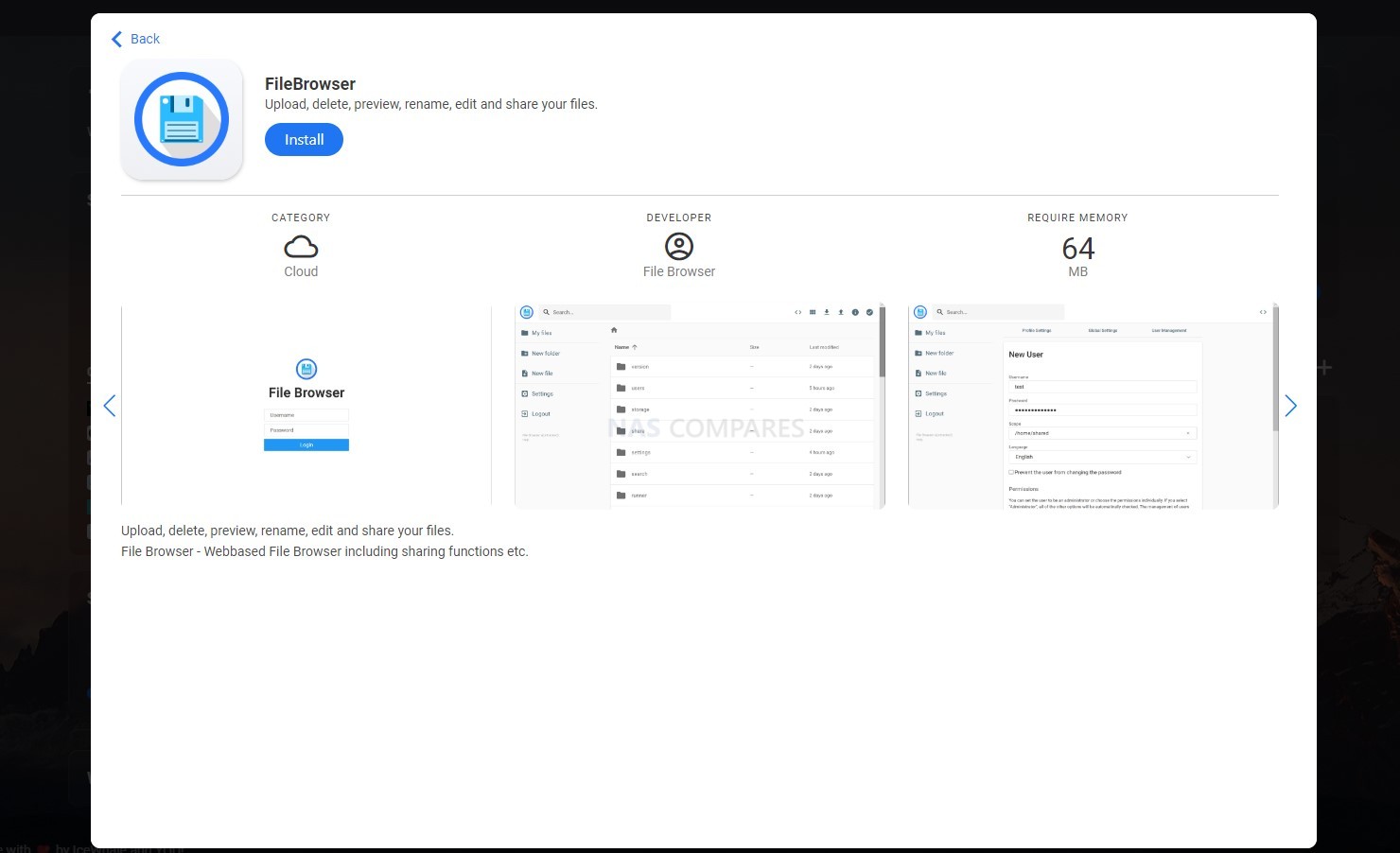
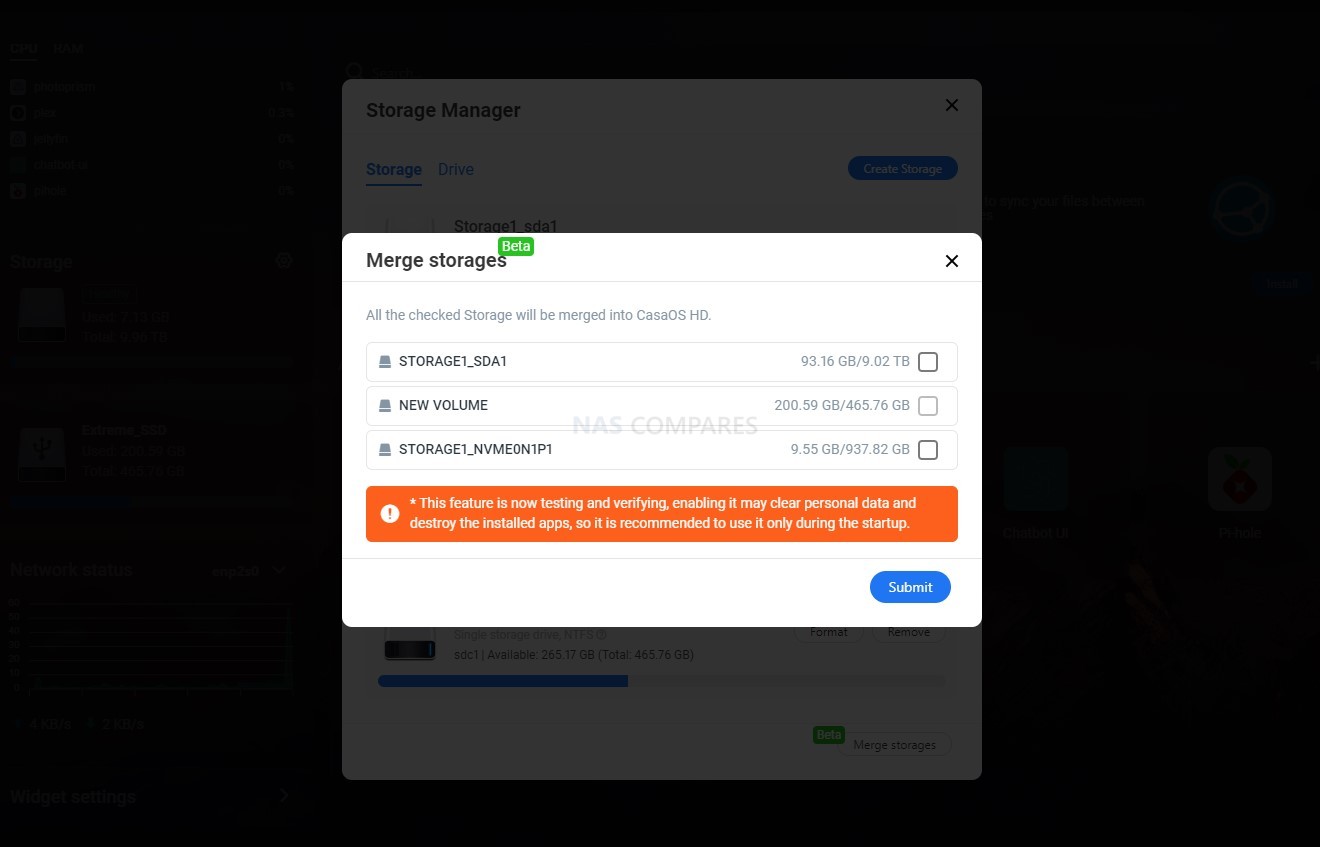
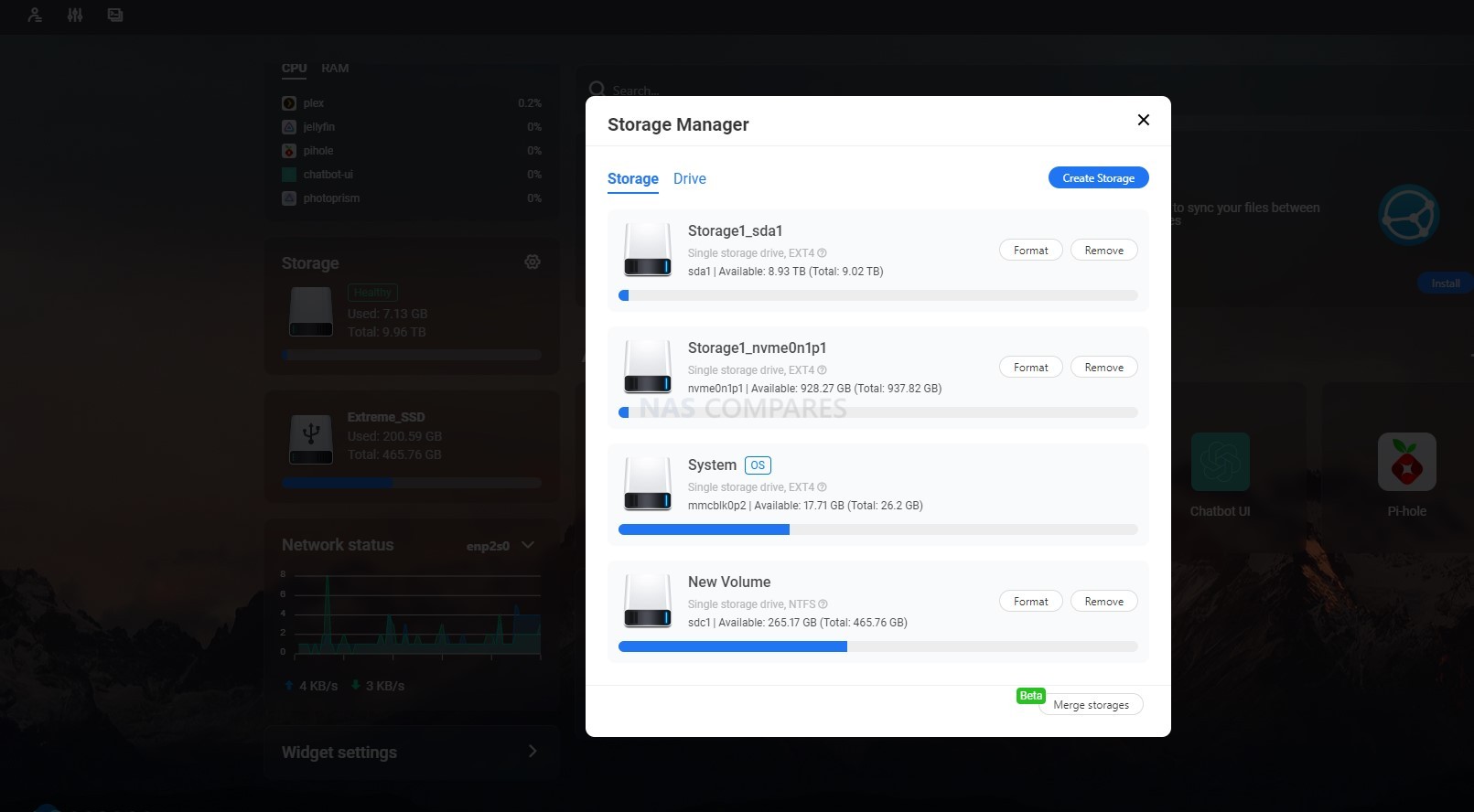
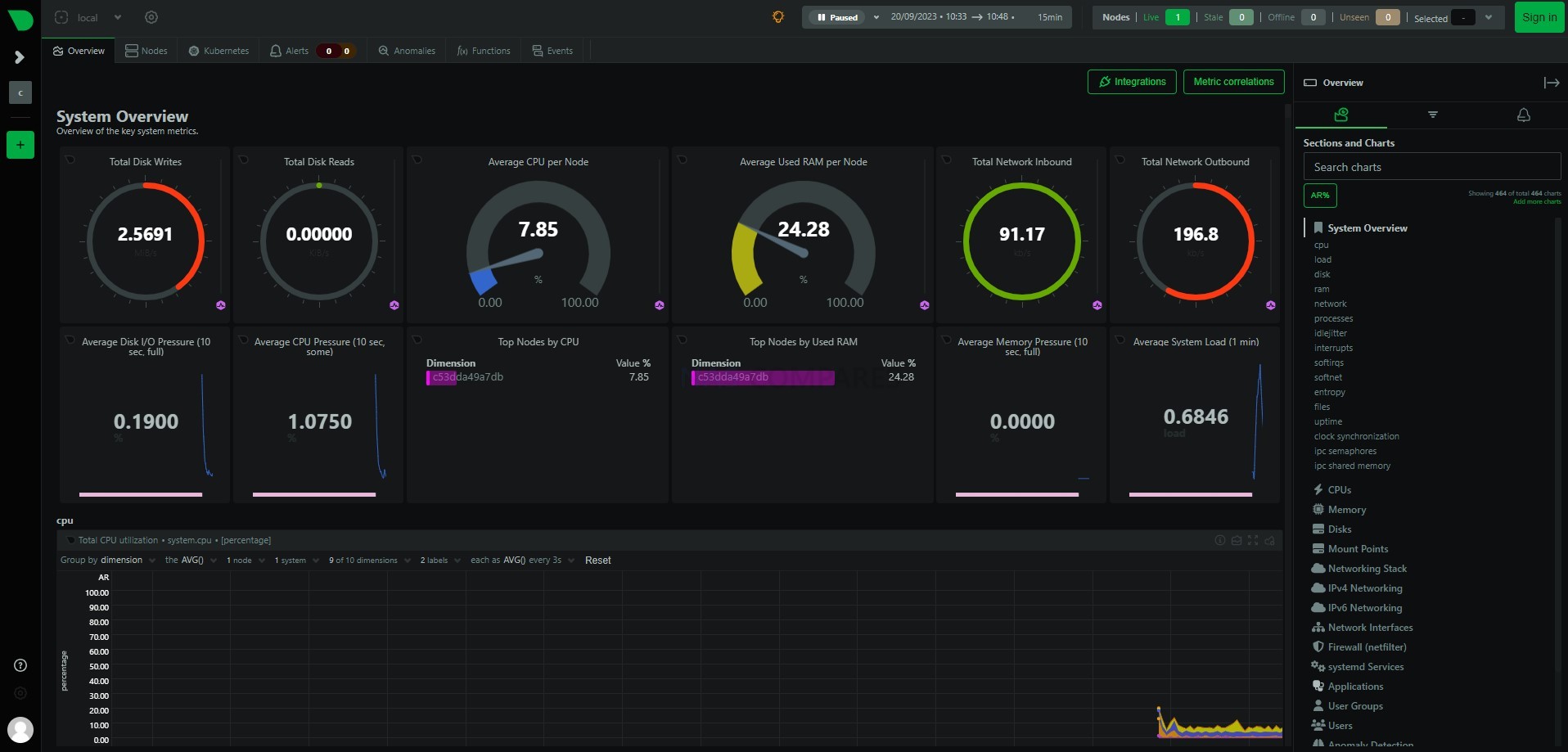
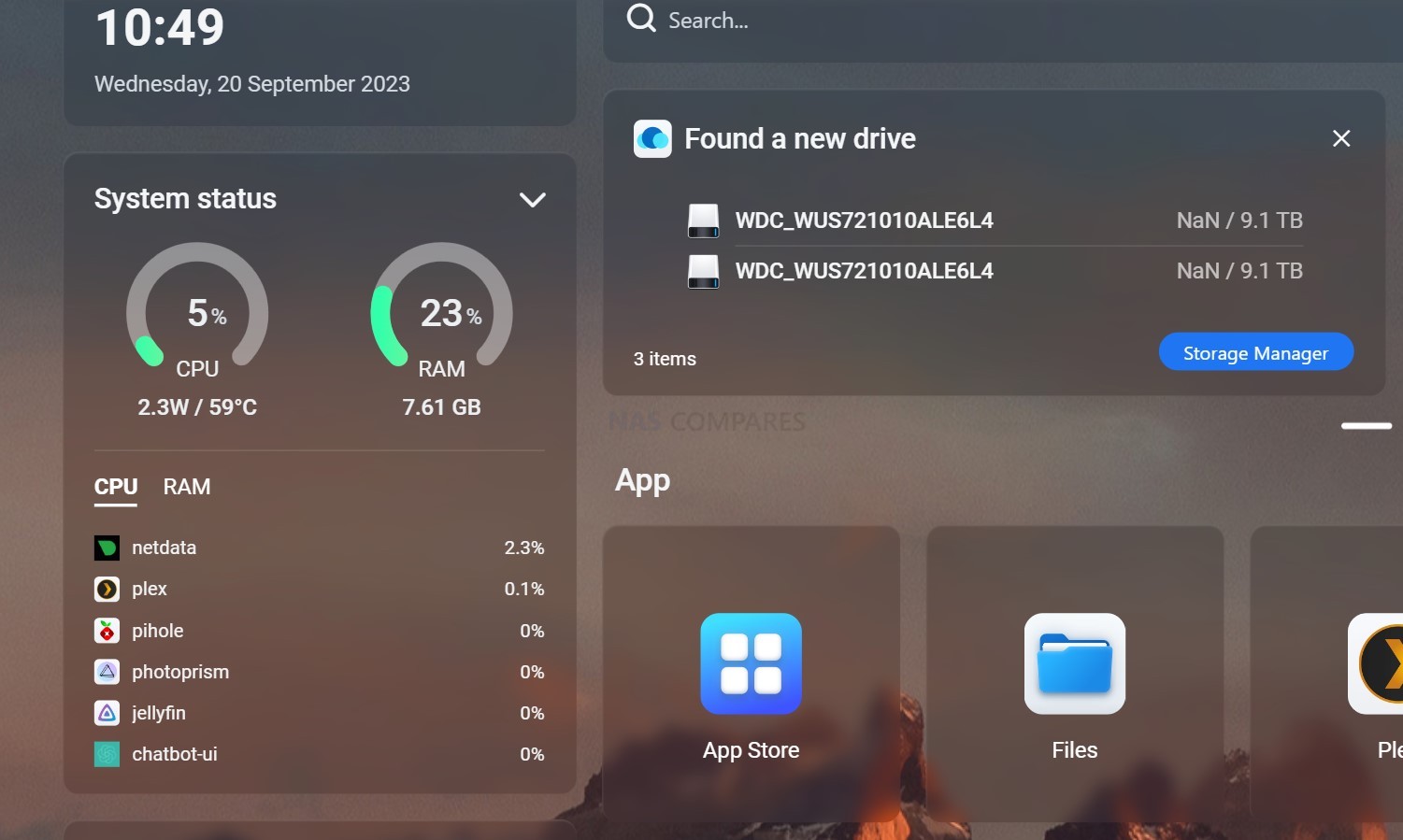
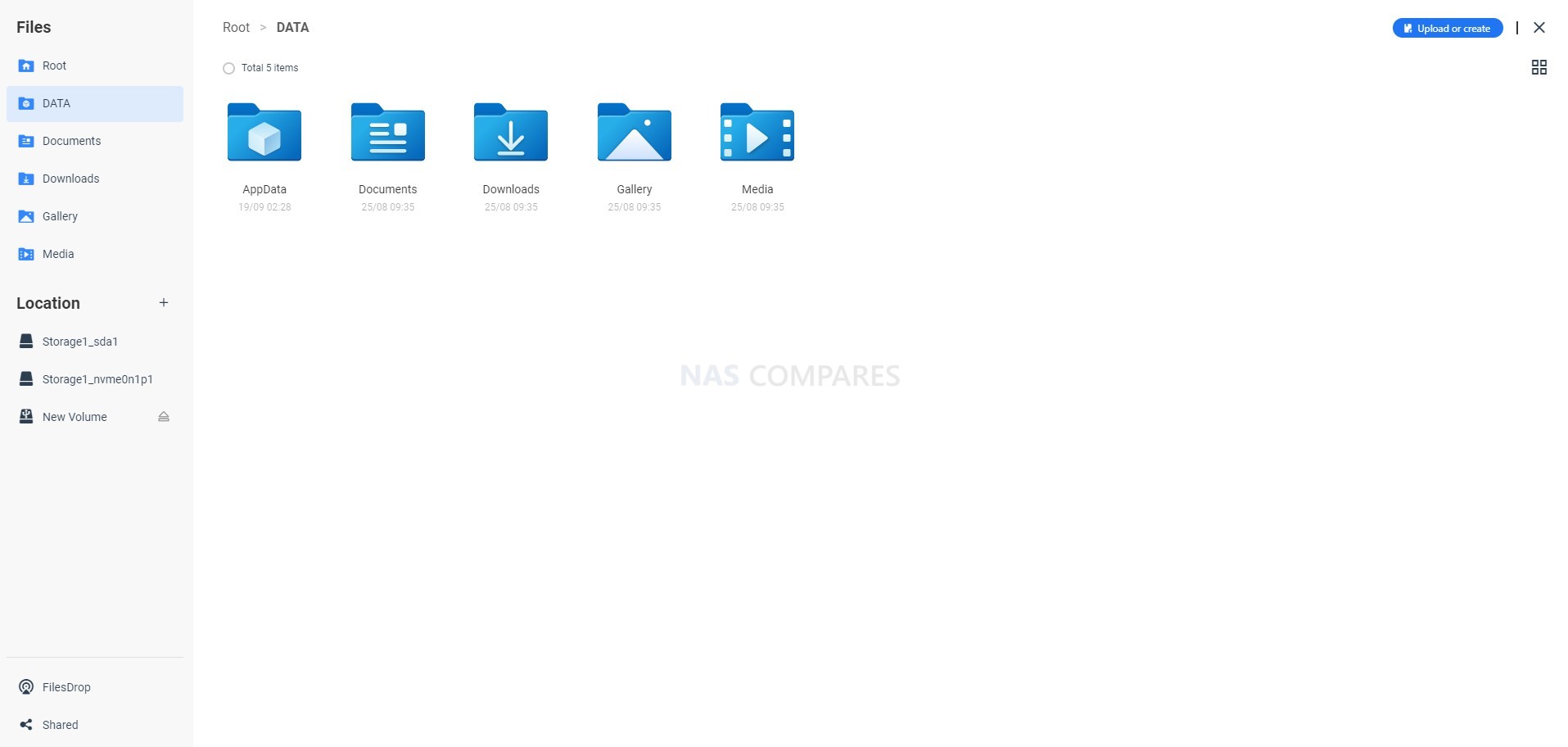
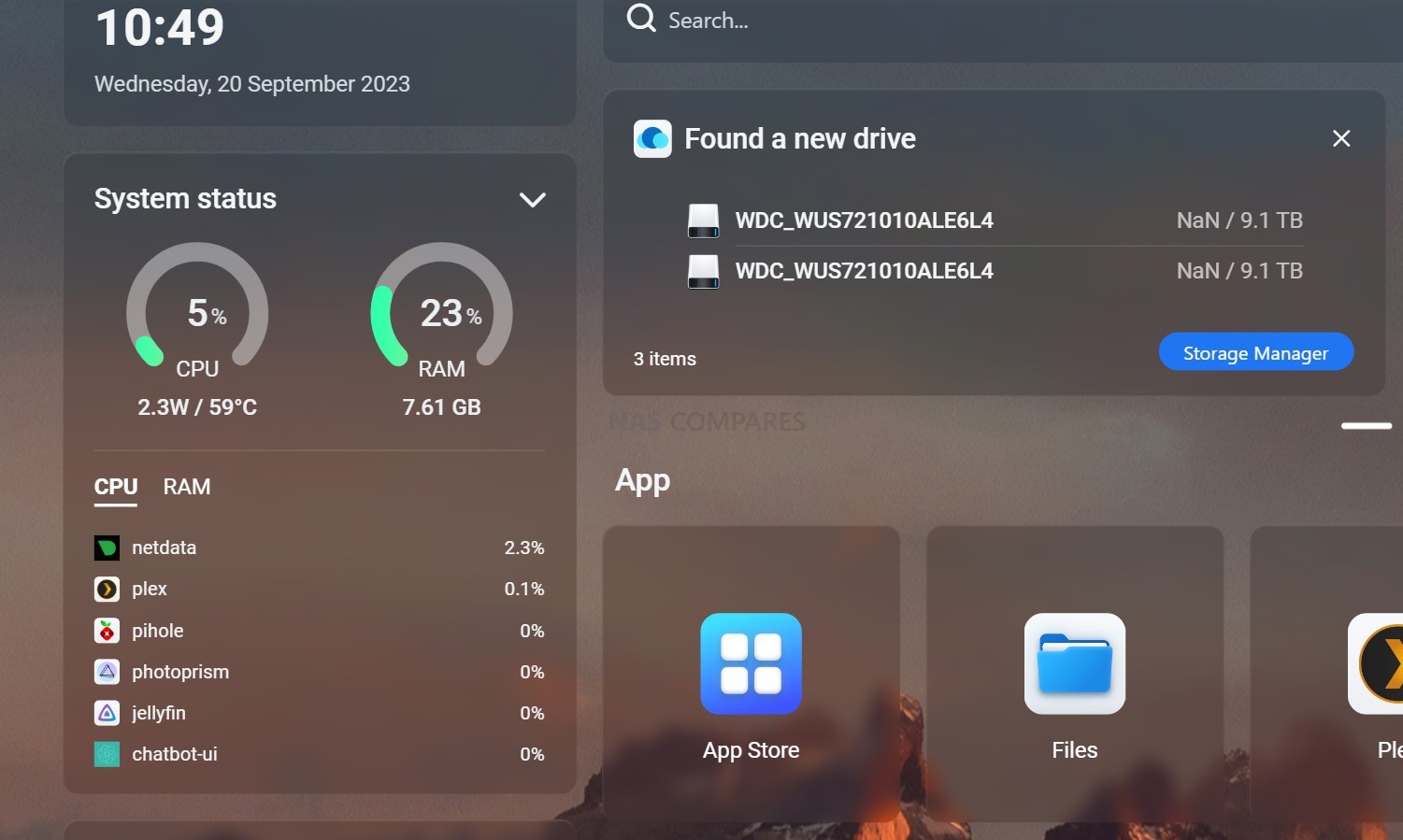
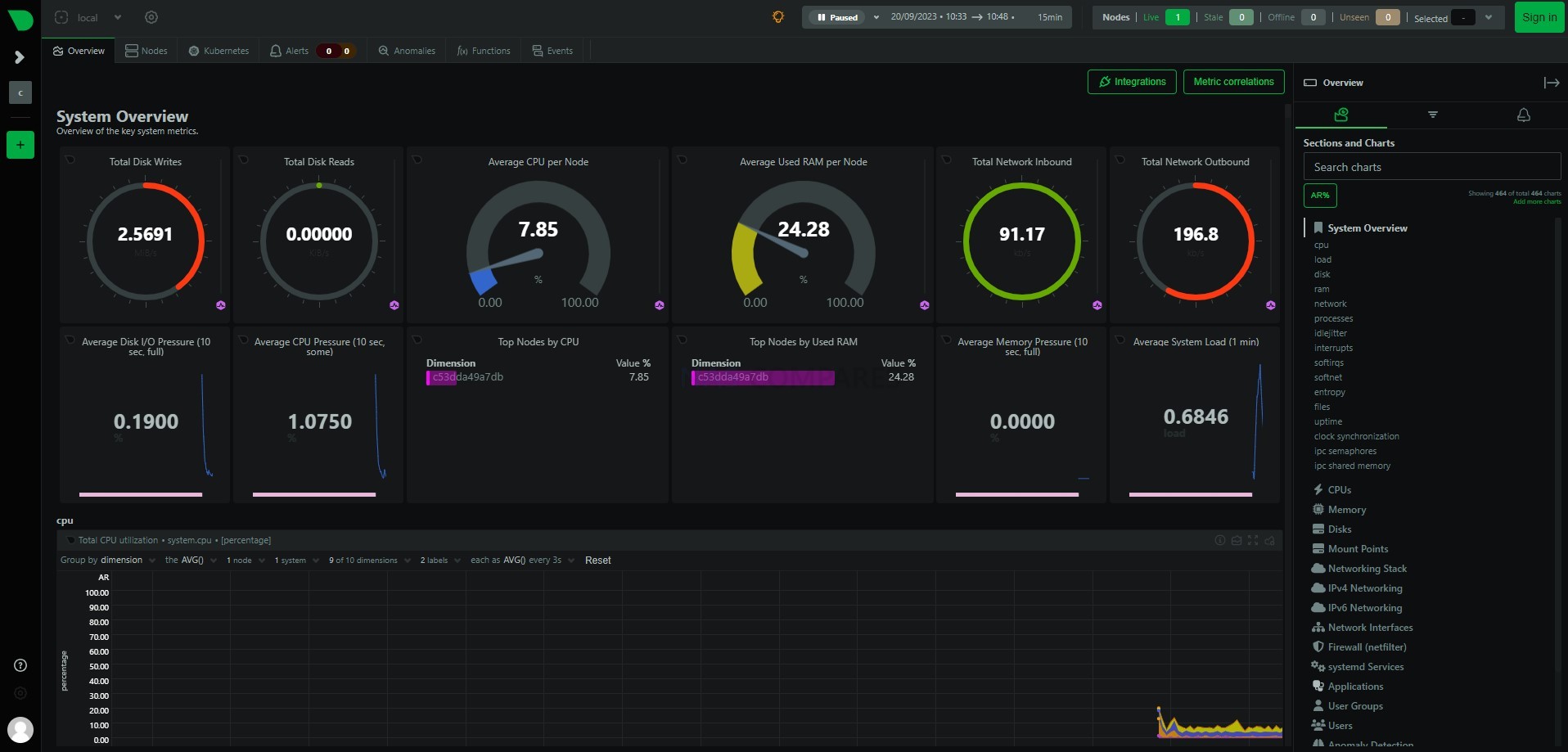
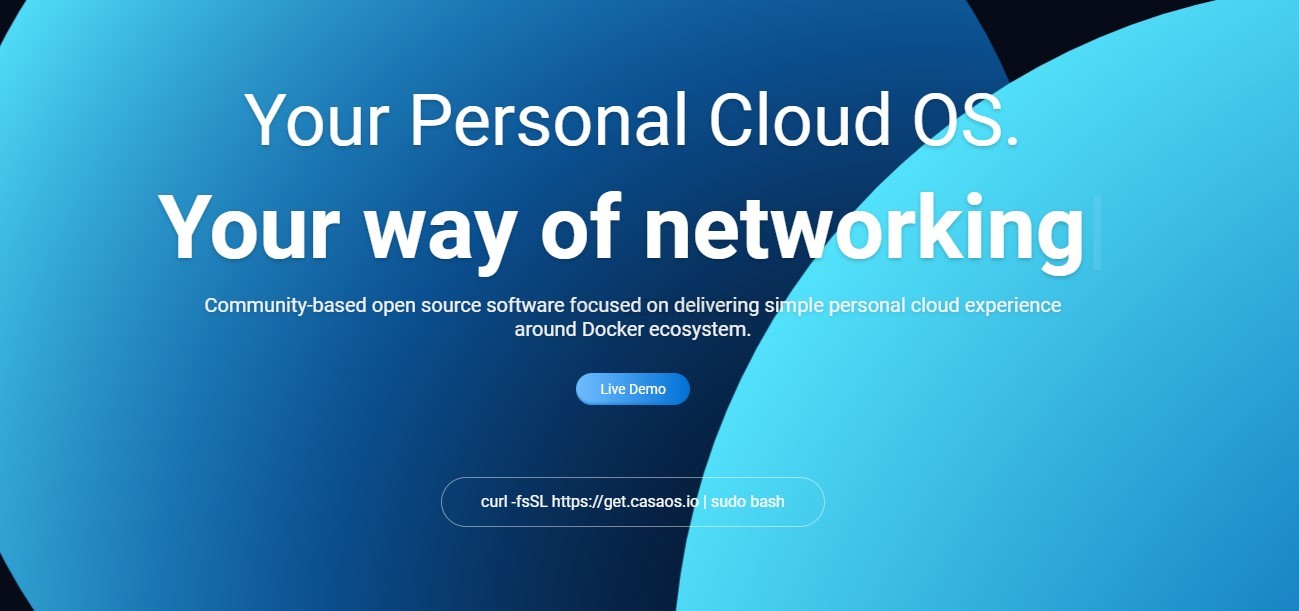




Really good overview, appreciate the frankness
REPLY ON YOUTUBE
I was looking at this case to re-use my older mini-ITX board, with RTX2080 Super as a home server/tv console unit but might continue on my search.
You continuously mention the same few negatives, we get it, but hearing it multiple times… A list at the end of pros/cons would allow you to recap your gripes. The 8x SATA ports with modern X570/X870 mini-itx boards coming with 4x SATA is a huge oversight (maybe in the future we’ll get more but super unlikely with m.2 drives now the standard on all mainboards).
The PSU pass-through is one of the least worrisome thing, unless you’re throwing through 1200W and using all 1200W, that cable isnt any sort of fail point. Improper installation is the most likely failure port. The 2-slot PCIe slot also keeps most gaming gpu’s out of this case as well (might as well get the N5 for mATX+4slot, or N6 for eATX but youre looking at 10+ SATA trays which is crazy). The complete oversight on trays versus that rubber is definitively a pain-point, I don’t think many people want to game on this chassis (with a bonus NAS component throw-in as a feature).
As you said, the NAS component really is setup for 1 thing, a PCIe SATA expander, but then youre forced into an APU setup, which those CPUs are fine but maybe not that great for encoding or transferring large sums of data at once and might be limited? Maybe the future of APUs will improve this.
I feel the N3 would’ve been better with a mATX setup, so you can put in your 1-slot GPU for video output and a 4x slot for the SATA expansion. Though this would increase the X/Z axis, but you can solve this with a vertically mounted PSU in the bottom half and use that extra space for a PCIe riser card for the x16 slot.
REPLY ON YOUTUBE
perfect for a 8700g build with stock fan, if you are like me and hoard a lot of videos and anime and game as well
REPLY ON YOUTUBE
Wait, the fact that they used allen screws over flat head screws is the criticism here? You said flat head Phillips screws, to be fair, but that’s not really a thing so even if you meant Phillips screws and not flat heads, I still view this as a 1000% positive regardless of whether or not they provide a place to store the key or even if they provide a key.
REPLY ON YOUTUBE
I’m interested in comments from other N2 builders – what did you do with the rear case fan and connection?
I found the connection on the SATA back plane spun the fan up to 100% creating a lot of noise, even with a Noctua 12×15. I ended up threading it through to the mobo sys fan header which brought the noise down considerably.
REPLY ON YOUTUBE
“if you lose this allen key, getting in there will be an effing nightmare!!!” – a bit dramatic, eh? I’d think most people building computers have some sort of handy tool kit. This isn’t some esoteric bespoke tool. It’s an allen key. 🙂
REPLY ON YOUTUBE
I think those are USB 2 connectors on the motherboard . If you connect those others to it with adapters they will be very slow .
REPLY ON YOUTUBE
I use JellyFin it’s free and good and for playback on a phone i use a diffrent player VLC it works great and 4K HDR10 HEVC works perfect
REPLY ON YOUTUBE
You talk too much and say too little.
REPLY ON YOUTUBE
lmao mate…. if you’re putting fans in there… it’s not passive anymore isit?
INIT?
Lmao word salad master.
REPLY ON YOUTUBE
So did you ever find adapters to connect the case front panel stuff to the TopTon board? I’ve been looking for some and haven’t found anything yet.
REPLY ON YOUTUBE
This really is a great video! Very detailed for how to build a NAS. Unfortunately the cost of the case and the MOBO has risen to the point now that it is no longer a feasible alternative for me to build a NAS. I can buy a UGREEN 2 bay NAS cheaper than what all the parts needed to build the fully operational unit. Possibly the price points of the individual components will fall in price and make it feasible again. CWWK’s MOBO appears to be declining in price which would be an option. Thanks for this instructional video!
REPLY ON YOUTUBE
I’d love to see an updated version of this, I’m considering the 4800 plus or DIY… it’ll no doubt drop again to 479 on the green, it seems to every other month lol, so prime day ‘deal’ is budget at 479, can we do better DIY??
REPLY ON YOUTUBE
Great video, however the case does have standard usb 3.0 and usb c connectors, the issue is the motherboard
REPLY ON YOUTUBE
Flimsy Design of Drive Bays for sure, that’s a deal breaker for me
REPLY ON YOUTUBE
Does the backplane support SAS?
REPLY ON YOUTUBE
I’ve been looking for a ITX MB that supports 8 sata ports and has a pcie slot
REPLY ON YOUTUBE
Nas playing at the beginning is too good ????
REPLY ON YOUTUBE
I highly value the joy of learning how to do this and then doing the assembly of the NAS. For me. Invaluable.
REPLY ON YOUTUBE
i still dont know how is this a 6 bay casing?
where is the 2.5″ placed?
i watched like 10 of N2 build videos nobody 4kin ever put in a 2.5″
weird shit
REPLY ON YOUTUBE
always build the entire system on a table to make sure everything is working before placing them into such a tiny and troublesome casing
REPLY ON YOUTUBE
why make things so complicated
just make it larger
jeez
REPLY ON YOUTUBE
No space for air to flow between the drives, those drives will be cooking. They would been better of making it 7 drive. Or can you keep them cool replacing the fans on it?
REPLY ON YOUTUBE
Excellent vid. Very detailed. I like the case.
REPLY ON YOUTUBE
CWWK 12th Gen i3-N305 N355 N100 N150 2*Intel i226-V 2.5G NAS Motherboard 6*SATA3.0 6-Bay Soft Rout 1*DDR5 4800MHz Firewall ITX Mainboard…. where can i get the manual to view the front panel connections?
REPLY ON YOUTUBE
Topton has no quality whatsoever, I bought it from Aliexpress and threw my money away, they didn’t accept the return of the product or give me my money back and there’s no repair. Friendly advice, don’t buy this crap.
REPLY ON YOUTUBE
really hope the n6 will be this like bottom full drives top matx at least cuz cmon itx is just so limited and annoying and better cooling which makes the psu plcement the only big issue
REPLY ON YOUTUBE
BE CAREFUL WITH TOPTON PRODUCTS, TOPTON COMPUTER, TOPTON LAPTOP, TOPTON MINI-PC, TOPTON NOTEBOOK, THEY ARE POOR QUALITY PRODUCTS AND THERE IS NO TECHNICAL ASSISTANCE OR TECHNICAL SUPPORT AND ALIEXPRESS IS NOT RESPONSIBLE FOR ANYTHING.
REPLY ON YOUTUBE
For the build/manual etc. we have you/YouTube.. ????
REPLY ON YOUTUBE
A real shame about this case. So long as Jonsbo continue to stupidly insist on those terrible rubber handles, all Jonsbo cases are DoA.
REPLY ON YOUTUBE
No dustfilter? That is a no no to not have a filter for a system running 24/7
The PSU solution was a very odd thing to.
This would no get into my build
Thanks for a great review
REPLY ON YOUTUBE
Looking at building this a year later and it’s more than twice expensive now. And the mobo isn’t available.
REPLY ON YOUTUBE
I think the n5 has now fixed nearly all of the complaints. If anyone here is about to buy the n3, please take a look at the n5 once before you pull the trigger
REPLY ON YOUTUBE
I love seagulls ????
REPLY ON YOUTUBE
I know I’m a year late, but fantastic walkthrough – inspired me to build one myself! Subbed and will dive deeper down this rabbit hole, thank you!
REPLY ON YOUTUBE
I bought a Topton computer on Aliexpress and I was so angry with myself, it was a poor quality product, without technical support, it was money thrown away. If you want some advice from a friend, look for another brand.
REPLY ON YOUTUBE
Loved your vid, TrueNAS is a bit sketchy to first setup but does it job after a while of tinkering. The 6 port sata controller based on the ASMedia 1166 chipset is the way to go? Works great with TN instead of the JMB585… Don’t cheap out on that one. I used a PCI x4 card, neater and cleaner with cables. And btw, for the money and quality of parts stop using the Ali bords and just buy an Asus N100 or something… Good bios, great hardware and you can support local or national companies
REPLY ON YOUTUBE
I bought a TOPTON computer on Aliexpress and I don’t recommend it, it’s a disposable and maintenance-free product. I don’t recommend it either.
REPLY ON YOUTUBE
tl;dr: get an 8bay server. With lights-out management, more ports and options than you can shake a stick at, redundent power supplies, sensor information and then some, drive bays made to not irritate each other with vibrations, an air flow concept validated to support a full load of drives, a backplane with ventilations slots, the list goes on. For your stuff at home, if a microserver with 4x20TB won’t do you need to look for enterprise solutions.
Thorough review, though.
REPLY ON YOUTUBE
I bought a Topton computer and threw my money away, it is a low quality product, without technical support. Friendly advice, look for another brand.
REPLY ON YOUTUBE
I am still thinking to made by your guide around 300-350£ or buy Synology 423+ different 100-150£ + good warranty , quality .
REPLY ON YOUTUBE
It’s incredibile how an N4 cost less than N3 and N2
REPLY ON YOUTUBE
#1 NAS man on YT, thank you for the review!!
REPLY ON YOUTUBE
45:26 …what did you spill onto your fan cover filter? The world wonders.
REPLY ON YOUTUBE
I miss what is wattage usage of this setup .
REPLY ON YOUTUBE
You FAILED, I can buy used HP Z800 with 128RAM 2x XEON, for 300Eur. I is way better then any china crap you have here, the Synology or QNAP is even more overprices china crap.
REPLY ON YOUTUBE
6:20 You have seen nothing. I once received a server power cable packed in a box which was larger then the case box on your desk. Bit shorter but much wider. It was also packed in all kinds of bubble wrap. A fricking standard power cable! ????
REPLY ON YOUTUBE
Its xpenology compatible?
REPLY ON YOUTUBE
Cavity is not the same as a hole. Cavity is empty enclosed space, like a mini cave.
What you call cavities are simply holes or openings.
REPLY ON YOUTUBE
my Synology 215+ still going strong after almost 10 years lol. even gets updates.
REPLY ON YOUTUBE
Horrible overrated case (good video though). What if you want to put SSD drives in those drive bays without drive trays? Doh!!
REPLY ON YOUTUBE
I was about to pull the trigger on that case which is listed for 165$ Cad on Aliexspress, until I saw the 110$+ shipping fees ????
REPLY ON YOUTUBE
I have an ex2 by WD. It’s time to increase my capabilities. I was going to build an old pc and fill it with hdd. This is a great option.
REPLY ON YOUTUBE
I’ll just buy a used Dell power edge instead. That’s actually designed for 24/7 operation.
REPLY ON YOUTUBE
I’m wondering how does it handle HDR10+ and Dolby Vision content?
Those require more horsepower, more bandwidth and different transcoding protocols.
REPLY ON YOUTUBE
Great review, you will save alot of people countless hours money and effort to find this info out
REPLY ON YOUTUBE
So you get the unraid license for free? So your nas cost hundred bucks more. And it is an Motherboard and a io shield.
And proxmox is a hypervisor and has absolutely nothing to do with network attached storage.
REPLY ON YOUTUBE
thank you
REPLY ON YOUTUBE
Yo what’s that track at the beginning???
REPLY ON YOUTUBE
it’s too expensive for what it is
REPLY ON YOUTUBE
Thanks for making this video. I’ve ordered all the bits and pieces to put a Jonsbo N2 NAS together.
REPLY ON YOUTUBE
U leaving off cost of unraid? Not that good after adding or close to other with vendor’s support
REPLY ON YOUTUBE
make videos less than 1 hour …
REPLY ON YOUTUBE
Would you advise another psu which is at least gold rated or are you satisfied with yours for 24/7 usage?
REPLY ON YOUTUBE
Can you power the zimablade from a atx 12v psu?
REPLY ON YOUTUBE
HI! I am struggling to find the adapters for the N2 front panel USBs to Topton USB pins, could you link youir solution? thank you!
REPLY ON YOUTUBE
Hi there I am trying to set up a system for streaming media, home assistant, some containers and light virtualization. I am thinking about running TrueNAS Scale on Zima Board or Blade with Jellyfin container. I am a bit worried about transcoding 4K tho. Is it possible to run this system I described and still being able to access and display 4K content from other devices? What about Dolby Atmos? Thank you very much 🙂
REPLY ON YOUTUBE
Hi there I am trying to set up a system for streaming media, home assistant, some containers and light virtualization. I am thinking about running TrueNAS Scale on Zima Board or Blade with Jellyfin container. I am a bit worried about transcoding 4K tho. Is it possible to run this system I described and still being able to access and display 4K content from other devices? What about Dolby Atmos? Thank you very much 🙂
REPLY ON YOUTUBE
best video ever
REPLY ON YOUTUBE
Car sick Mate!
REPLY ON YOUTUBE
How are the hdd temps it that? They seems to be pretty crammed and that I/O boars seems to cover whole fan.
REPLY ON YOUTUBE
Excellent video as always.
REPLY ON YOUTUBE
Thank you. I’d love to see the next steps: actually connecting the box to the internet and your in-house network and configuring the system to function as intended. Good job!
REPLY ON YOUTUBE
what an unfortunate intro…
REPLY ON YOUTUBE
Anyone who’s building PC’s should already have a toolkit with allen key bits, surely. Getting hung up on one of those seems a little over the top. Either way, nice case, seems like an iron plated pain in the posterior to get one after a quick look around. A Supermicro Mini-ITX mobo with an Atom processor on would be a great combo with this, some come with 12 SATA ports. My main concern about this case are all those small and thus noisy fans. I’d have liked to see a big-ass 20 cm fan on the rear or something to suck air through the whole thing.
REPLY ON YOUTUBE
Does ZimaBoard is cooler than the ZimaBlade and handles the heat better?
REPLY ON YOUTUBE
Do I need a sata power splitter cable?
REPLY ON YOUTUBE
Helpful hints:
1) first boot the motherboard outside of the case. If it is dead you don’t want to be wasting time installing it and routing cables
2) never use a cheap USB drive. Use a Samsung Fit or Bar USB Drive. You can do a search for the guy who tested them out and they beat out the rest. I am not sure but I think you can clone the USB. If so get two so when the first one dies you are not scambling looking for configurations.
3) update the BIOS. If the board dies it can be RMA’ed.
4) Use the Preclear tool in Unraid on the hard drives before using them. Side note, if you want a really nice NAS case SuperMirco offers a 4 bay one. It is not cheap but it will last and also keep your drives cool. best of luck.
REPLY ON YOUTUBE
back when i build my nas , i buy a full atx lga 1150 with 2pcie 16x 2pci 6 drives 4dim , for 70eu , and got a celeron for 40 that i later upgrade with i5 , got a 10gb nic , and still got a free pcie for gpu or extra storage , and house everthing in old style case that had 8 drive slot , and 4dvd slots , yes is bit bigger and you may need more time to swap a drive , but is much more powerful and upgradable ,
REPLY ON YOUTUBE
The fan runs at full speed, sound like a helicopter up side is hd is very chilled even if they are stacked next to each other. The 4 alan key screws can be replaced with the 4 Countersunk computer screws. This case is really big even for a mini itx.
REPLY ON YOUTUBE
Very helpful thanks for taking the time to put this together ????????
REPLY ON YOUTUBE
I got the information from the truenas scale community to avoid these sata extender however they gonna look like (pcie, m2, etc) because the chips on them aren’t that stable overall. Also the chip which comes with the motherboard. Therefore there recommendation is to buy a isa 9300 hba card and use the pcie slot for it.
REPLY ON YOUTUBE
It’s really crazy how budget you can go! ATM I’m looking at a total budget of 200usd for a NAS with 16TBs of storage in a raid 6 config no idea how I did it but it’s an amazing thing crazy utility.
REPLY ON YOUTUBE
Are you pointing the power supply fan INTO the case? Is that correct?
REPLY ON YOUTUBE
you deserve a like and sub
give this man a like
????????????????????????????????????????????
it’s rare to find legend people nowadays
Thanks man that was super helpful
❤
REPLY ON YOUTUBE
“nicker” is a risky word to use
REPLY ON YOUTUBE
Those connectors for front panel are standard front panel connectors. They’re not on your motherboard because you bought a cheap ITX one.
REPLY ON YOUTUBE
Wow. another great video. Thanks so much for all the excellent content. I’ve been gearing up to replace my old Dell PowerEdge r510 12-HDD server. It’s such a noise generator and power hog. I wonder if you could maybe do a video that focuses on daisy-chaining servers for more space. I don’t want to manage multiple Unraid instances. What I’d like to do is set up one server and then attach multiple SANs as my library grows.
REPLY ON YOUTUBE
Thaks a lot for this! It made building my N2 NAS a breeze. Different motherboard, different power supply, but this video is an excellent resource in any case.
REPLY ON YOUTUBE
Are you getting laid by the word? Lol
REPLY ON YOUTUBE
Be Real ,,, just Sellect qnap !
REPLY ON YOUTUBE
Can you fit small GPU and m.2 nvme 10gbe nic card in the 2 pci slots?
REPLY ON YOUTUBE
Great experiments! May I ask What’s the power consumption of this DIY NAS? Also if we don’t mind put the power block into the case, can I use my old pc regular power block to power up this DIY NAS? Many thanks!
REPLY ON YOUTUBE
Upvoted for the bird
REPLY ON YOUTUBE
In the days of lore, way back, when Drobo first appeared and later all the little NAS boxen were born; I decided that they were too expensive and way under-powered. Then I found a way to build my own home lab NAS, one where I could host containers as well as serve shares, etc. This predates Unraid and TrueNAS. Many pros were building rackmount 4U servers but then came along some very well suited m-ITX server boards. Supermicro, Asrock, Gigabyte, etc. The first build utilized Joyent’s fork of OpenSolaris and their base image called SmartOS, providing ZFS, Zones, networking, etc. in a private cloud. Then Linux became capable of the same (Joyent was bought by Samsung and development slowed). I switched to Ubuntu Server with LXD to manage native containers and VM’s and Microk8s for Kubernetes. I was even able to import my zpool. But now I am thinking I may switch to TrueNAS Scale and build a 3rd generation NAS with a Jonsbo NAS case. Newer m-ITX boards have come a long way. The advent of those M.2 PCIe SATA adapters, will free up the 16x PCIe slot allowing for dual 10GbE network card. Ultimately, home builds can be built for less but if you put a bit more power into the build, you get a lot more out of it. However, you will end up being more expensive but your NAS will be more of a home lab server.
REPLY ON YOUTUBE
Also resale value of turn key is something worth considering. DIY resale close to zero once components get old. Whereas synology keeps value well.
REPLY ON YOUTUBE
The hair is a nice touch, funny
REPLY ON YOUTUBE
How reliable is apevia?
REPLY ON YOUTUBE
Little late to the party, but they give you more than enought rubber grommets for the drives that you can use four on each drive plus the pull on the front of them.
REPLY ON YOUTUBE
I have the same NAS case, and I’m curious about your hard drives’ behavior. Mine are always active and noisy, even when not in use. Do you experience the same issue with your setup?
REPLY ON YOUTUBE
9:00 Fascia = Fay-Sha
REPLY ON YOUTUBE
The PSU extension cable is common on SSF or compact cases. Most of my SFF Caselabs or Sliger cases uses them.
REPLY ON YOUTUBE
nice unit thanks for the honest review of the os
REPLY ON YOUTUBE
Perfect system! However, I’m VERY curious what the power consumption (in Watt) this system averages in with all HDD’s spun down?
REPLY ON YOUTUBE
Great, informative video as allways, thanks a lot. Would you deploy Plex on a Diskstation (mine is a 918+ and a 1621+) or rather on a zima blade/ board? I recently got my ZimaBoard and I am quite happy with it. Only thing is, that I like the look of the Blade more than the board 😉
And I agree: I’d prefer the blade over the Raspi.
REPLY ON YOUTUBE
Would you make an episode about what’s better? UnRAID or TrueNAS? What gives more possibilities? What is updated more often? And what, in general, will be a better solution?
REPLY ON YOUTUBE
very informative easy sub from me
REPLY ON YOUTUBE
You said at 10:28 that it is a 64 bit x86 Celeron. x86 is 32 bit. But still Thank you for all the good info.
REPLY ON YOUTUBE
I’d like to see a build done that doesn’t rely on chinese parts. I really don’t trust them in my network.
REPLY ON YOUTUBE
I have been using this case for a couple months for my Unraid server which hosts PLEX. It’s an amazing case. I use an Intel 12500t which is pretty powerful for my needs and low power usage but I also have an RTX 3060 in the case because I got a really good deal on it and use it to auto convert media to be more compatible with families playback devices. It’s overkill but it’s awesome and this case handles it all fine. The GPU gets fresh air from the side vent and I added two 80mm Noctua fans to the top back for exhaust so they pull in air from the front and sides which gives fresh air to the CPU cooler and gets rid of all of the hot air in the top section. This little case for me holds 164 TB. 160 in HDD(8x20TB) and a 4TB Sata SSD for a cache drive and for Unraid/PLEX meta data. I could use an M.2 for cache but it’s not needed.
I have my PSU so it pulls in fresh air from the front of the case and exhausts it out of the side and for the extra data ports I used an M.2 to SATA adapter. it has 6 additional SATA ports so with all of what I have I still have an available data slot.
If you want a great case for a NAS or home server and want to keep it pretty small, this is the way to go. There are smaller options but this one has the benefit of amazing cooling performance…at least for a NAS case.
REPLY ON YOUTUBE
Thanks for the great info.
I have just built my home made NAS based on this tutorial with Unraid and it is spinning away happily on my table.
I deviated slightly by going with the Node 304 case which I purchased locally from eBuyer for £74 delivered and the same board with 4 GB memory and the 128 GB NVME from Amazon for £151. With the saving I also added a 10 Gbe PCI card from Ali Express for £71 and a Hisource 4 port 2.5 Gbe + 2 10 Gbe uplink ports for for £29 from Ali Express
I have to admit that getting the 10 Gbe link working with Unraid (!***!) was a bit stressful, but everything now works as it should.
Onwards and upwards and thanks again.
REPLY ON YOUTUBE
hi, what about the power consumption
REPLY ON YOUTUBE
loved the tutorial but that constant banging on your desk coming through your mic needs solved, very annoying
REPLY ON YOUTUBE
I have two Lacie. One in my office and one at home. Can you do a video on how to link these two so that they act as backups of each other? If you already have done something like that, please send me that way.
REPLY ON YOUTUBE
Wow since you have so many can i have one?
REPLY ON YOUTUBE
Your psu needs to be turned 180°, the mesh on the case is for the psu fan
REPLY ON YOUTUBE
Thank you so much for this detailed video. I used it for my own Jonsbo N2 build and it was so helpful with the step-by-step instructions and guidance on the gotchas. It saved me so much time to pre-plan. Excellent video!
REPLY ON YOUTUBE
Baller nas collection dude ????
REPLY ON YOUTUBE
It’s a SFX case psus are basically always internal.
REPLY ON YOUTUBE
how much power does it max out at?
REPLY ON YOUTUBE
Whats the best server grade psu for this diy NAS to run 24/7?
REPLY ON YOUTUBE
Better than qnap not difficult, better than Synology ? At this price point highly possible
REPLY ON YOUTUBE
Hey, as this vid is 4 months old, I just wanted to ask if the mobo is holding out good? I’ve been considering it myself, just wondering if theres anything you found out later that someone looking to buy one may want to know before making a decision. Cheers for the good vid ????
REPLY ON YOUTUBE
if you review NAS, would’nt average power draw, and especially “IDLE” power draw be a pretty important topic?
REPLY ON YOUTUBE
Do I trust my data to an AliExpress motherboard… But, is it better than a NAS in terms of build quality? Who knows?
REPLY ON YOUTUBE
While I get the confusion about several different screws types used, I do generally appreciate hex screws.
Phillips is a nightmare waiting to strip. For me it could all be torx haha
REPLY ON YOUTUBE
Hey great video just wanted to check what mobo you used for this build as would be really handy as struggling for itx boards. Cheers Phil
REPLY ON YOUTUBE
Ugly.
REPLY ON YOUTUBE
HI, Great vid! I must have watched this a few times now, and am currently building my own. Currently unable to track down the pdf for the header pin layout. Did you ever add the link in for that?
REPLY ON YOUTUBE
Does anyone know anything about the SATA Power Connector on the back plane? I can see the 2 molex connectors powering the drives, but is the SATA necessary or just in case a power supply only has on molex. I’m confused. Jonsbo has answered all of my questions, except that one and of course the instructions are……well you know.
REPLY ON YOUTUBE
QNAP and Synology better start being competitive, or they will disappear.
REPLY ON YOUTUBE
Would love to see more videos like that
REPLY ON YOUTUBE
Looks like you like Nas alot lol.
REPLY ON YOUTUBE
16:00 what is that upgrade card? More sata ports?
REPLY ON YOUTUBE
???? Listening to Nas while building a Nas
REPLY ON YOUTUBE
Am not sure whether to lean towards the N2 or N3 ???? probably go with a ROG mini-ITX board and smash in a decent Ryzen processor and bags of memory as-well. Wish to have something that can leave on 24/7 that will run Proxmox to cover all my needs ie. PfSense/OPNSense, Storage and probably a mail server. Would welcome your thoughts please and keep up the great work ????
REPLY ON YOUTUBE
N3 интереснее, спасибо за обзор. Хотя ваш язык я не понимаю, но видео сняли доходчиво.
REPLY ON YOUTUBE
I think the biggest pro for Synology is the software package and ease of use and not only putting together a case, a board and a JOBD.
REPLY ON YOUTUBE
The Floppy Disc Sounds killed me really … ????
REPLY ON YOUTUBE
Thanks bro!
REPLY ON YOUTUBE
This video is really well done. I have been trying to give an answer to this question for four years now. The problem is summarized at the end of the video. My time costs much more than what I save by building it myself “from scratch”. But on the other hand I am too stingy , and I like to build things myself. Frustration.
REPLY ON YOUTUBE
Have we figured out the power plug weirdness? I am also doubtful that three plugs are required, what makes the most sense to me is one dedicated cable plug for molex, and one dedicated cable plug for sata since most modern psu will only have one cable for molex, i have this on order and want to try it but it seems everyone just plugs in all three
REPLY ON YOUTUBE
Did anyone suggest Xpenology DSM (open source Synology OS)?
REPLY ON YOUTUBE
Hi, the Zimacube NAS seems like a very interesting device!
I have just finished a power efficient unraid build on a topton
I have a few questions before i’ll crouwdfund the pro (i5) version.
1. Whats the idle power usage when the server is doing nothing (with something like Unraid running) and all disks spun down?
2. Does the bios have an option to always power on the system when power is provided to the system no matter if the system is cut off power abrubtply or a propper shutdown (i like to shut down my server unraid after midnight and start it by activating a smart plug when i need it and my topton mobo )
3. Are there really 2 DDR5 SoDimm slots in the i5 version and do they support 64Gb of (non eec) memory because i have 2 dims on the shelf.
Thanks in advance!
Rgds,
Mart
REPLY ON YOUTUBE
This looks really interesting. I’m looking to replace my dead Drobo 5 bay Direct Attached 5D box. I’ve got about 16 TB of data on 5 drives (currently backed up onto a single 18TB USB drive which scares me.
Does anyone know if A) Can the CasaOS mix and match drive sizes like the Drobo does so elegantly so that I can upgrade from the 14TB drives I have to put in the ZimaCube to get going with 18TB or 22TB drives as they become affordable and my 14TB drives age out or fail?
B) any possibility of just putting my old Drobo Drives in and having CasaOS recognize them and use them so that I can just start slowly swapping them out one at a time for the newer 14TB drives I have? (saving me tons of copy time) and keeping lots of folders and installed software working maybe.
Thanks in advance and thanks for the videos!
REPLY ON YOUTUBE
I am kind of sad that I got this case now. Looks like I am stuck with max 4 drives if I want to do 10gb fiber NIC. I tried to find a way to do bifurcation that would allow 10gb nic + the 8 drives sata. I did buy an NVME to SATA but only support is 3.0 and its rather slow when booting. Not sure I really trust it either for the long hall that would allow 8 drives to be used. But then you loose ability to do mirrored cache pool. Just every little road block that makes this thing not ideal and as stated having it in a bigger form factor would be way better. It would be nice if you could do the ultimate Jonsbo N3 build and show us how to overcome what I perceive are limitations. Support all 8 drives, 10gb network and dual mirrored NVME cache pool.
REPLY ON YOUTUBE
Thank you for posting this video ????. You have a new subscriber. Kindly keep up the great ???? work..
REPLY ON YOUTUBE
Would love you to take a look at the CWWK J6412 NAS/6 SATA/Dual M.2/ITX/i226-V enclosure/motherboard combo. Looks like a pretty interesting case.
REPLY ON YOUTUBE
Good job. I always advice to just use an old pc or used mini pc you have and it would do the mainly same job if DIY. Easy upgrade and maintenance.
REPLY ON YOUTUBE
How does it handle full blu ray rips and you didn’t put though handbrake like you put a blu ray disc in make mkv and once it’s done put it on Plex how does it handle that cuz that’s what I do with my gaming pc an I’ve been thinking of putting my Plex server somewhere els so it’ll use less electricity
REPLY ON YOUTUBE
The price of the shipping from Aliexpress not only varies, but can make or break your budget so it should definitely not be left out. For example here are the prices as of Nov 2023:
Jonsbo N2 (Aliexpress): $93 + $97 shipping to the US = $190
Jonsbo N2 (Amazon): $150
Jonsbo N2 (Newegg): $140
Jonsbo N3 (Aliexpress): $117 + $99 shipping = $216
Jonsbo N3 (Amazon): $170
Jonsbo N3 (Newegg): $162
As you can see, if you are in the US it’s a no-brainer to buy the case from Amazon/Newegg as Aliexpress offers an inferior shipping experience.
REPLY ON YOUTUBE
I built a NAS with a Raspberry Pi4B and a 18TB USB HDD. Beat that.
REPLY ON YOUTUBE
https://www.google.com/search?q=pcie+m.2+plus+sata+sata&client=firefox-b-1-m&sca_esv=583637472&tbm=isch&source=lnms&sa=X&ved=0ahUKEwju7qDF-M2CAxVJNzQIHYRaC7oQ_AUIBigB&biw=707&bih=280#imgrc=pS5kKsh3FjAeQM
Fill with 2tb ssd/SATA – viola 4tb software solid state raid 5
REPLY ON YOUTUBE
Watch this video in x2
REPLY ON YOUTUBE
The videos are wonderful, but the volume on the music transitions is a touch too loud compared to your voice, it makes the transitions jarring. Keep up the great work!
REPLY ON YOUTUBE
You can call me crazy
But I would love to see DIY video for all NVMe NAS (like flashtor 6 alternative)
REPLY ON YOUTUBE
Imagine they would’ve gone for mATX – its entirely possible in that size and they come with up to 3x PCIe Ports and sometimes 6 SATA ports too …
I also really don’t like how they’ve not even tought about the possibility of someone using these slots for 2.5 inch e.g. for SATA-SSDS.
A backplane like this makes it really hard to use without any kind of attempt in proper design by the manufacturer (port multipliers, adapters, what gives, what takes … in the end you can only remove the backplane). For me these two points make these sadly a hard pass 🙁 – as I would gain nothing from those extra 3 slots.
Who in the world uses just 8 mechanical drives. SSDs are so much better for many things (power consumption too), and are nothing special but more or less a given use-case for many of us looking into slowly adopting many parts towards flash storage as they become cheaper and cheaper …
REPLY ON YOUTUBE
Prices seem to be very much higher than anticipations, and about 600 for the base and over 1000 for the higher model.
Or have I misunderstood this very confused campaign?
REPLY ON YOUTUBE
Do you know if a Deep-ITX would fit in there ? That would be EPYC xD
REPLY ON YOUTUBE
Which diy NAS would you recommend to someone who is going to use it as a Jellyfin server for movies and transcoding movies to phones. Also might use it to hold basic documents/photos.
REPLY ON YOUTUBE
Is there any way to cram two more 3.5″ HDDs inside there at all?
REPLY ON YOUTUBE
I love the Jonsbo N2 and N3 builds but if you’re running RAID-6 you really want a minimum of 8 x 3.5″ drives not just 5. Are there any good NAS cases for this?
REPLY ON YOUTUBE
Looking forward to the build
REPLY ON YOUTUBE
0:00: ???? The Zimmer blade is a cheap DIY home media server with pros and cons.
3:37: ???? The video discusses the features and customization options of a small and customizable PC system.
7:14: ???? The Zimmer system is impressive and comes with an OS that can be deployed immediately.
10:05: ???? The majority of suppliers do not provide a means to upgrade the memory in Raspberry Pi, which lacks direct out-of-the-box PCIe connectivity and relies on bridging hardware.
13:45: ???? The older CPUs used in Synology and QNAP NAS devices are outdated and less efficient compared to more modern CPUs.
17:32: ???? The reviewer criticizes the cable provided with the device for only allowing one hard drive to be connected at a time.
20:35: ???? The video discusses the throttling issues, limited bandwidth, and heat dissipation problems with the Gen 2 Intel Celeron NUC.
Recap by Tammy AI
REPLY ON YOUTUBE
I am thinking about to follow this route but going with Truenas. Is that a bad idea? Bottleneck?????
REPLY ON YOUTUBE
Now that the KS campaign is live, the ZCube Pro is priced at $900+$40 for shipping (approx) to USA. No option for RAM. There’s an add-on option for a single port 10GbE (UTP) at $80 (?) and a few more items. Based on that pricing (-$300 for Early Birds) then the total price to add 2x32GB of RAM, and a 3rd party NIC 2x10GbE (UTP of SFP+) would take the price to (again, approx) close to $940+180+180 = $1300. A system I would compare this one could be Terramaster T9-450. It’s about $1200 on Amazon with 8Gb of RAM and inferior CPU capacity. T9 has 9 slots vs 6 but the ZCubePro provides 4 NVMe +2 onboard for extra storage AND 2 Thunderbolt4 ports.. hm… I think I will pledge for ZCubePro. I would like a rack mount option but hey, I have an old QNAP that’s desktop form factor and sits on a rack shelf. I’ll make space for the new box. After 6 years with QNAP, I’m stuck with the old OS, not easy ways to install another OS, and I don’t appreciate that… boxes like TerraMaster and ZimaCube or a DIY is the way forward for my rack. Oh, one more thing: yes, they should have 2×2.5G AND 2x10G (SFP+ or UTP), PLUS a way for the power plug to be secured… a metal clip or something/…
REPLY ON YOUTUBE
Now that the KS campaign is live, the ZCube Pro is priced at $900+$40 for shipping (approx) to USA. No option for RAM. There’s an add-on option for a single port 10GbE (UTP) at $80 (?) and a few more items. Based on that pricing (-$300 for Early Birds) then the total price to add 2x32GB of RAM, and a 3rd party NIC 2x10GbE (UTP of SFP+) would take the price to (again, approx) close to $940+180+180 = $1300. A system I would compare this one could be Terramaster T9-450. It’s about $1200 on Amazon with 8Gb of RAM and inferior CPU capacity. T9 has 9 slots vs 6 but the ZCubePro provides 4 NVMe +2 onboard for extra storage AND 2 Thunderbolt4 ports.. hm… I think I will pledge for ZCubePro. I would like a rack mount option but hey, I have an old QNAP that’s desktop form factor and sits on a rack shelf. I’ll make space for the new box. After 6 years with QNAP, I’m stuck with the old OS, not easy ways to install another OS, and I don’t appreciate that… boxes like TerraMaster and ZimaCube or a DIY is the way forward for my rack. Oh, one more thing: yes, they should have 2×2.5G AND 2x10G (SFP+ or UTP), PLUS a way for the power plug to be secured… a metal clip or something/…
REPLY ON YOUTUBE
Couple of things the video conversions are actually referred to as transcodes and Noone absolutely Noone is interested in 8k video. It’s not a relevant use case for much of everything since you would have to sit so close to the screen to see the detail it would hurt your eyes
REPLY ON YOUTUBE
*Update* – You can find the (now LIVE) Zimacube Kickstarter Page here – https://bit.ly/47mjSTY
REPLY ON YOUTUBE
*Update 3* – You can find the (now LIVE) Zimacube Kickstarter Page here – https://bit.ly/47mjSTY
REPLY ON YOUTUBE
Your website appears to be down bud.
REPLY ON YOUTUBE
Physical drive NAS are like modern record players… they should be making NVME NAS systems with 25Gbit ethernet
REPLY ON YOUTUBE
fantastic video mate.
I do have some questions, if you aloud me to ask.
privately.
Thanks so much
REPLY ON YOUTUBE
Got an email today that the Kick Starter is Live.
The prices are pretty high as expected for a high spec unit.
REPLY ON YOUTUBE
I signed up for the 1$ reservation fee and now that the kickstarter is live it seems to be that the 1$ reservation fee was a total 100% scam. There is NO DISCOUNT for those with the reservation as promised. There is NO RESERVATION, anyone can buy. The only thing a reservation holder has, is 1$ less in his pocket. Also the prices are really quite high for a new brand with ZERO reputation. And I wonder if customs charges are included or will be added (I’m in the EU – the FAQ does not mention anything related to duty/customs/tariffs).
REPLY ON YOUTUBE
This would be my first time purchasing something like this. Does anyone happen to know if these come with RAM already provided at a lower configuration and later on able to upgrade it or do I need to provide my own RAM and this is like a barebones system?
REPLY ON YOUTUBE
It’s live now
REPLY ON YOUTUBE
Put in my $1 for “Creator” (includes Nvidia graphics card) and it goes live 1 PM EDT today.
They plain i5 model was “sold out”. Some AI libraries use Nvidia as a math co-processor using its “Cuda” language.
Otherwise I might just remove the graphics card. Very impressed with hardware specs; very concerned about software.
The lack of integration in CasaOS reminds me of Windows 3.1. TrueNAS is too complicated for my modest Docker needs.
So, I might try UnRAID either with this system or the LincStation. Although my Docker needs are modest, I do need access to command line Docker see the book, “Docker for Data Science”. Although CasaOS permits command line Docker, it generates confusing messages in the CasaOS dashboard. See my “competent_borg” rant. What I am looking for is a system that makes it easy to load and go PostGIS/PostGIS (PostgreSQL) container and Juypter data science containers. Not just for my own use, but to do so like “cattle” (not “pets”) for other users. There are a lot of use cases for “maps and crosstabs”: epidemiology, census demographics, politics and marketing. I am working open source, but as a stand alone product think Tableau.
REPLY ON YOUTUBE
The Kickstarter page is available on preview from a few hours ago.
– Goes LIVE at 17:00 (London Time) on Fri 03 Nov 2023 ✅
Assuming they don’t change the details, from the preview page…
– ZimaCube: 3905 HKD / 499 USD / 410 GBP (NO Quad NVMe adapter!)
– ZimaCubePro: 7035 HKD / 899 USD / 740 GBP
– Delivery: March 2024 delivery!
Prices above for those who paid the $1 to get access to the ‘Early-Bird’ pricing (Max-500 backers), everyone else is $100 more.
This Kickstarter is said to close around 12-Dec-2023
REPLY ON YOUTUBE
Someone know when it will be released and shipped?
REPLY ON YOUTUBE
It’s got that 1970s retro look and that killed it for me, not sexy enough. I’ll stick with the Asustore Pro 12x, the large CUBE shape is no longer needed. I do admire the specs but naw, no cubes..
REPLY ON YOUTUBE
Most interesting broadcast. 10Gbe is a showstopper (alternative product is Asustor FS6712X). If 6 x Rotating Rust, and 4 x NVME, then correctly using NVME as a fast file system cache would be a win for all customers……..
REPLY ON YOUTUBE
Would definitely like to know how much power the Zimacuba consumes with and without drives.
REPLY ON YOUTUBE
Signed up with the $1 reservation fee today (both standard and pro), purely as it’s piqued my interest. More than anything, the question about 3rd party RAID OS is what I’d like confirmed if you do get a unit. Started playing with UnRAID and quite like it, and for my needs this hardware should be ideal (and convenient!)
REPLY ON YOUTUBE
hello someone know what is creator pack?
REPLY ON YOUTUBE
Just for an email to “reserve a place” so it’s going live in a few days on kickstarter
REPLY ON YOUTUBE
I think the mayor missing features is using an i7 which allows AMT support, together with 2x10GbE
REPLY ON YOUTUBE
The Amazon reviews of that TopTon board are awful! 🙁
REPLY ON YOUTUBE
does it have mobile client?
REPLY ON YOUTUBE
haha quality intro – happy anniversary
REPLY ON YOUTUBE
0:09: ???? The video discusses the Zimma Cube, a crowdfunding product in development, and addresses common questions about it.
3:30: ???? The video discusses the features and pricing of an Intel i5 uh with six satBay, Gen 2 and vme Slots, and PCI upgrade ability at Gen 4.
6:55: ???? The Thunderbolt 4 connectivity on the device allows for seamless network switching and direct connection to Mac devices.
10:21: ???? The video discusses the connectivity and lane speeds of the M.2 NVMe slots in the Zimma Cube OCTA and Pro.
13:35: ???? The video discusses the possibility of using third-party operating systems on the Zimmer board and the cooling system of the device.
16:56: ???? The video discusses concerns about the lack of information on thermal and cooling data in the upcoming Kickstarter campaign for a barbecue product.
20:27: ???? The N3 system has additional active cooling, more space for CPU fans, and the possibility for more aggressive CPU coolers.
23:45: ???? Users are annoyed about the use of external power supply units (PSUs) in NAS devices.
27:17: ???? The video discusses frequently asked questions about the dimensions and compatibility of the Ice computer.
Recap by Tammy AI
REPLY ON YOUTUBE
Just a couple notes on this as I have the same case. First if you did NOT use the angled sata cables on the backplane they won’t warranty the case. Second I found a flat dual molex adapter that saved me even more room. Between the angled sata cables (same slim blue your using with 90 degree one end), and the molex adapter I was able to replace that loud inefficient 15mm fan with the standard 25mm one. Also replaced those grates on both side with basic wire grills. Both those things got me better air flow as well as less noise.
REPLY ON YOUTUBE
Seems like the Pro version will be quite expensive, at the indicated price.
I suspect I could build a functional PC system with Thunderbolt for less, which might be the better option ????????♂️
REPLY ON YOUTUBE
Why answer straight forward questions with bloated vague responses filled with “wank words”. Whatever happened to “Yes” or “No”?
If they can’t commit to simple answers, I can’t commit $.
REPLY ON YOUTUBE
“Risks of Default Passwords on the Internet”
https://www.cisa.gov/news-events/alerts/2013/06/24/risks-default-passwords-internet
REPLY ON YOUTUBE
That’s an awful lot of marketing speak which I’d be wary of on Kickstarter. They have past successful campaigns as a plus, but even that’s no guarantee (looking at you, Pebble). PS – your chapter timings are somewhat out of whack.
REPLY ON YOUTUBE
I like the external PSU. Power supplies are a common failure point, and having a external one removes the need for disassembly and cable routing during replacement. In addition to saving space in the box, they remove a large source of heat.
REPLY ON YOUTUBE
The only thing that’s an improvement over the N2 is double slot PCI-e support. You can bifurcate PCI-e and use 2 single slot cards.
REPLY ON YOUTUBE
Still leaning DIY with that pricing but thanks for keeping an eye on this. I’m not a fan of the external PSU either, as the one on my Synology comes unplugged very easily compared to an ATX plug.
REPLY ON YOUTUBE
N100 only has 9 PCIE lane(gen 3.0), 1235U has 20 PCIE lane(gen 4.0).
For anyone considering an N100 NAS either DIY or pre-build, it’s a good choice on paper, but with very limited PCIE lanes, and poor E-core performances, you will have a decent NAS but with nothing fancy.
REPLY ON YOUTUBE
*UPDATE 2* Since this video was first published, I was able to send over most of the questions below in the comments directly to the creators, IceWhale, about the Zimacube (covering PCIe, 10GbE, ECC Memory, Price and more). You can watch the Q&A video here – https://youtu.be/jhA6jb1sUcc or read them in full here – https://nascompares.com/2023/10/25/the-zimacube-nas-kickstarter-the-10-most-common-questions-answered/ )
REPLY ON YOUTUBE
thanks to you, I just built DIY NAS, based on Jonsbo N3 and Topton N6005. Added 2x32GB RAM and 4x 6TB WD Plus. Added 5 Noctua fans (including replacement of CPU one). Total cost: 930GBP
REPLY ON YOUTUBE
Hi, just a short question unrelated to Zima Cube. What do you think of using the intel datacenter U.2 SSD instead of M.2 NVME for storage or cache. Recently Ive seen a lot of second hand Intel U.2 SSD in the used market therefore I’m interested to know what do you think?
REPLY ON YOUTUBE
FWIW, another reputable site mentioned early bird pricing — which apparently came from IceWhale — of $300 for the Cube and $800 for the Cube Pro. The $500 and $1000 tiers you suggest is likely to lower the ceiling for their potential market, and would definitely make DIY a rather more attractive option for many of us. And the TrueNAS Mini and Mini+ are probably better comparisons for the Pro model than the QNAP TVS-h674 despite 5 vs 6 HD bays, and much closer in price, at least for a storage-focused device.
REPLY ON YOUTUBE
CASAOS Questions (setting up my ZimaBoard)
1. Update: Does the “CasaOS update” update the underlying Debian operating system? My natural instinct when seeing a Debian or Ubuntu command line is to run sudo apt update. When I ran apt update with –yes it seemed to override some hand crafted CasaOS settings and wanted to update the firmware. If CasaOS does not update Debian and Debian update is not recommended then how does one deal with the evolving threat environment CVEs?
2. Admin / Admin vulnerability — By default Port 22 is left open with default userid, password and host name. This is similar to Admin/Admin on a router or Raspberry Pi where the default user with admin privileges is Pi with a password of Raspberry. At least Raspberry Pi encourages users to change the password.
3. Terminal — the default web based terminal seemed to lag and it was not recommended for command line “curl” command updates. Windows 10 has an OpenSSH client built in (and an optional OpenSSH server). In the Raspberry Pi documentation I saw instructions for connecting to Raspberry Pi using Windows Terminal with SSH using an SSH Key rather than a password. Also in Raspberry Pi documentation I saw connecting to Raspberry Pi using VS Code on Windows which would be similar to using VS Code to connect to WSL on Windows for Docker. This is mostly a documentation issue, so I would suggest looking at the Raspberry Pi documentation to get a model for security and connectivity documentation. You don’t have to reinvent the wheel you just have to make sure it works with CasaOS.
I have shutdown and unplugged my ZimaBoard because I do not want to leave it on in an unprotected and potentially unsafe state.
REPLY ON YOUTUBE
Been thinking if I should wait for this one, or build a custom one based on i3 12th gen (dont really need 4x eth ports in pro version, while N100 not sure if its not too slow)..
REPLY ON YOUTUBE
What a load of marketing wank.
REPLY ON YOUTUBE
Are the ‘merged drives’ still unstable? Its Debian under the hood so I dont see why RAID cant be built into the base.
REPLY ON YOUTUBE
Hi there! Has anyone used one of those china boards a little longer? Can they be trusted the data to throw at them in the long run? What is your opinion?
REPLY ON YOUTUBE
Thanks for the video. I watched it until the end. Skipped some during the video but watched minimum 90%. I may try this at home. ????
REPLY ON YOUTUBE
You’re a paid shill. This is a mediocre product, as other (professional) reviewers have found.
REPLY ON YOUTUBE
i’m a bit disappointed, your title said you were gonna build a NAS, but you just assembled a NAS :/ (i was expecting electronic component tinkering, not computer parts tinkering…)
REPLY ON YOUTUBE
I have just built a TopTon board (Same version) with a Jonsbo case. One note is you can actually fit that board out with 64Gb Mem so Truenas has plenty of spare capacity. I also spec’d out a lot better power supply just for the peace of mind. Wish you had done this review earlier as I would have gone with the case you had.
REPLY ON YOUTUBE
This is looking more serious than storaxa with all the features I’m after (nvme cache, sata 3.5″ support and 10gb sfp+ capable)
REPLY ON YOUTUBE
hell yeah
imma build this
REPLY ON YOUTUBE
Thanks for sharing. You’ve had it for at least a month now. How have the drive temperatures been? Cooling on that case seems like it might be an issue.
REPLY ON YOUTUBE
We are definitely not all humans. Both trolls and robots in here…
REPLY ON YOUTUBE
Hackable ????
REPLY ON YOUTUBE
Hackable ????
REPLY ON YOUTUBE
Looking forward to your N3 build with the i9 mobo – I am planning a very similar build and would love your feedback on the setup (power draw, performance, etc).
REPLY ON YOUTUBE
Looking forward to your N3 build with the i9 mobo – I am planning a very similar build and would love your feedback on the setup (power draw, performance, etc).
REPLY ON YOUTUBE
Looking forward to your N3 build with the i9 mobo – I am planning a very similar build and would love your feedback on the setup (power draw, performance, etc).
REPLY ON YOUTUBE
You mentioned a D7 case? Who makes that?
REPLY ON YOUTUBE
It’s not an environmental disaster until you dispose for the packing in the wrong way. RECYCLE!
REPLY ON YOUTUBE
The limitations and drawbacks of this N3 case as you outlined really shoots some major holes in the feasibility of this DIY NAS. Looks like I’ll be sticking to my Synology 8-bay or Asustor (for cheaper 2-6 bay setups) units for awhile longer it seems.
If Jonsbo ever does a N4 with the fixes/limitations worked out…maybe then I’ll start weighing a “might-try” then. Probably a year or two more wait, I guess…with also more stability with pricing and availability to come as well. Cheers.
REPLY ON YOUTUBE
I’m a little confused… Did you show the correct extra parts (Re: video ~35:00)? Of the four parts shown, it seems that I would need (1) of the parts shown (top & bottom right side parts), but nothing from the left top/bottom parts. Additionally, if I select either top or bottom right side parts then I now have (2) 20-pin connectors (one from the front panel USB and one from the adapter (top/bottom right side parts)) which now need to go to a 20-pin + 20-pin splitter (not shown on your display of parts). Unfortunately, my Topton MoBo has not arrived yet so I can’t reference what is there in order to understand what’s what with all the parts you showed. Can you provide any more clarity to this? Thank you so much and thanks, again, for making this very informative video!!!!
REPLY ON YOUTUBE
i just bought, 10/19 will have 10/21 amazon. ????
REPLY ON YOUTUBE
Investing that much time and effort probably isn’t worth it unless you have time to waste or very specific possibly high-end applications.
Also, you may want to got get a more current ITX board + CPU for more performance and RAM in this case.
Honestly for a simple setup like that it probably is better connecting something like a TerraMaster D5-300C or ORICO-NS500RC3 to a Raspberry Pi.
REPLY ON YOUTUBE
I dont think you save so much time going turn key as you have to learn the software. Easiest is take an old machine, install Nas software learn how it fits in your life. Then upgrade hardware later. As a person whos built many computers, the hardware part wasnt the issue. Learning the Truenas/Proxmox/Unraid interface probably didnt take longer than the Synology interface. Now I have a machine which can grow cheaply if needed.
REPLY ON YOUTUBE
The Erying motherboard you’re getting, only has two SATA ports, how are you making a NAS from that?
REPLY ON YOUTUBE
Those front USB connectors are standard, USB3 and USB3.1 for the Type A and Type C connector respectively, and are found on most modern motherboards. That Topton board is made as cheaply as possible, so it only has basic USB2 connectors, which is why they wouldn’t fit.
REPLY ON YOUTUBE
I know your werewolf, dont try and deny it.
REPLY ON YOUTUBE
whats a nicker?..
REPLY ON YOUTUBE
Totally a great replacement for another orange channel. You explain everything that you had to go through and other options to tackle those issues. Great vid! It s subscribe for me bud!
REPLY ON YOUTUBE
Ive been waiting for an n100 with sata outs
REPLY ON YOUTUBE
stop banging the desk man… or move your mic.
REPLY ON YOUTUBE
2nd Hand HP Microserver G8 is better.
REPLY ON YOUTUBE
In my limited experience with CasaOS, there aren’t any tools for managing a RAID, or for general system management like putting the device on a schedule.
All that can be done with the underlying OS (since CasaOS isn’t an OS at all, but just a web GUI frontend for Docker management and a few helpful additions), but it certainly is a bit DIY to do. Not quite like having Synology’s or QNAP’s default apps available. There are backup solutions in their app store, but just a few and not necessarily very tailored in the default config to work with the rest of the system.
Of course, you could also just install unraid or TrueNas or anything else on one of these.
REPLY ON YOUTUBE
I agree to rubber handles are naff – the cost difference . . . rubber handles versus plastic trays – must be minimal
REPLY ON YOUTUBE
34:29 I see where the 3.1 connector is different, but what’s with the 2.x? Also the ali link for Topton doesn’t seem to come with ram or ssd anymore?
REPLY ON YOUTUBE
This looks awesome so long as the community is there for software this will take a chunk outa Synology/Turnkey solutions. I built a AMD Linux Rig with TB3 to test how well that actually works.
REPLY ON YOUTUBE
Is this finally what will make it worth to upgrade my DS716+? Looks like it if pricing remains reasonable. It will hopefully push Synology and others to finally properly upgrade their systems instead of recycling older hardware.
REPLY ON YOUTUBE
I worry about any company that spells Ethernet as Ethemet (see video time 15:06). If you visit the webpage it is still spelled this way. Time will tell if this product ever gets past crowd funding…
REPLY ON YOUTUBE
Very informative video. Could a person substitute a standard ITX board with a low end processor in your build?
REPLY ON YOUTUBE
Interesting. I’d slap 64GB of RAM into it and install Proxmox or XCP-NG on it and turn it into a combo NAS/firewall/video/docker server.
Plex for serving video, pfsense for firewall duties, and then a separate VM/CT for running small docker applications.
REPLY ON YOUTUBE
I am desperate to know the name of the container that enables the GPT for files.
REPLY ON YOUTUBE
Seen too many crap Kickstarters go to shit so I will wait until it’s actually in production and shipping before even thinking about buying.
REPLY ON YOUTUBE
As of power delivery. It is not going to have internal PSU. As you can see in pictures and specificatons, it will use DC power of 19V. That means it will use a external “Laptop Brick” power supply. The reason for it is that motherboard will not have ATX connector. The CPU is Alder Lake-1235U which is laptop CPU that is very power efficient. It also uses SO-DIMM memory which is found in laptops and Mini-PCs. So definitely no internal power supply, which they can utilize for more space like extra drives. The case will roughly be of the size of Jansbo N2. Technicaly if you had Mini-PC like HP Pro Mini 400 G9, you can remove motherboard from it becasue it is the size of ITX and put in Jonsbo N2, and you will not need SFX power supply anymore becasue it will be powered by extrenal DC laptop Brick. You can use space of power supply for 4 x SSDs. Print custom bracket using 3d Printer or just use double sided tape or Velcros to join those 4 SSDs together.
REPLY ON YOUTUBE
No Kickstarter donations. If they have a shop with 2 years warranty it’s worth a consideration.
Also I am still waiting for a Zimaboard with ECC memory.
REPLY ON YOUTUBE
If this turns out like I think, this could be a killer for my oldest server… Looking forward to the next bits of information.
REPLY ON YOUTUBE
That is not monstrous but pretty poor instead. Only 6 storage bays. 2.5GbE instead of 10GbE is also not really up-to-date any more. And most importantly – no ECC memory.
But they certainly know their marketing BS – “ChatGPT For All Your Files”. Muahhahaha
REPLY ON YOUTUBE
And again another zima advertising.
Do you get paid by them or are getting free products?
You are even using the usual advertise-scam “features up to 9000.. costs starting from 1..”
The basic cheap zima cube is lowend! And all the “good stuff” you are advertising is in the pro version which will cost multiple times of the cheap stuff.
Sorry but you are behaving like the iPhone fanboys since you’ve started with zima.
All other videos were enjoyable and neutral, but now..
REPLY ON YOUTUBE
Put me down for the N100. I bought one of those generic AliExpress specials and that thing is seriously impressive.
REPLY ON YOUTUBE
Mate any spare Nas ????
REPLY ON YOUTUBE
Can’t figure out the use case of 4 x 2.5 GbE ports. Wouldn’t you just plug this thing into a switch rather than all of your devices into this thing? At least if you want to do things the right way.
REPLY ON YOUTUBE
the i5 equipped Octa is enticing but the N100 should be no slouch!
REPLY ON YOUTUBE
The host is so much smarter than me and knows so much… but for him to feel this doubtful about very clearly obvious DC brick psu being used is so weird… It will be like HP does their microserver and its great news for people who want to save some watts.
If this one shipped with N100 be around 400€ it be good. As jonsbo n3 cost south of 200€ and n100 mobos cost around 100€ but then its SFX psus are bit pricey or going pico psu with brick is not cheap…
but one thing is… those 8 positions with N3 feel like a lot. Like you know you will be sorted out for years to come… that you can use hdds that you would maybe skip.. and you will have space left to put in some new hdds in future years when you but 2x 30TB.
REPLY ON YOUTUBE
Hope there will be a way to cool the M2s as they seem very close to the frame in that one picture. Will be interesting to see the price but it makes the decision wether or not to buy a Zimablade harder.
REPLY ON YOUTUBE
Their website states you have to sign on via zima to access your files. So this is safe?
REPLY ON YOUTUBE
Thunderbolt to PCIE expansion will also be beneficial. This might be my next NAS. I was considering pulling the trigger on a Synology 1821+, but I may hold off till I see the price of this. If this had 8 bays and 64GB or more ram expansion, it would be the dream NAS.
REPLY ON YOUTUBE
Thank you so much for the content! Have you come across a product like the Minisforum AD650I? It looks like a quite powerful solution, especially considering the increasing popularity of M.2 SSDs and the ability to build, for example, a RAID 6 (4+2) setup on the 2-4GB ssd. I would love to see a review from you and hear your thoughts on this product.
REPLY ON YOUTUBE
if they sell mobo itself for i5, i might buy it. you know most of lga 1700 came with 4 ports.
hba card power consumtion is too big and at same time pcie sata card have chance to break earlier
REPLY ON YOUTUBE
Just got the survey through from Icewhale and they’re talking about choices between the “Quad” and “Octa” models. Have they changed the specs and naming scheme already? The Mainpage still shows Zimacube and Zimacube Pro; and the i5 is a ten core CPU, whereas Octa suggests eight core.
REPLY ON YOUTUBE
I’m definitely a fan as I’ve given Icewhale a lot of money over the last year. I have 3 (432) zimaboards, 3 (832) zimaboards and just ordered 2 (zimablades (16gb memory)). I’m going to order one more Zimablade to bring it to 3 total. So, I already know I’m going to jump on the zimacube as well.
REPLY ON YOUTUBE
I wonder if this will a come with battery similar to a laptop would. That would provide some built in power failure protection.
REPLY ON YOUTUBE
improvements but serious consumers will look into building in something like a fractal7 xl where you can cram even more drives, people will want to get 2 – everything breaks
REPLY ON YOUTUBE
Office 365 backup? It’s as much about the software as the hardware, which is why Synology is still (by far) the market leader…
REPLY ON YOUTUBE
cool
REPLY ON YOUTUBE
The N100 would be great, provided its cost effective. Otherwise, if its close to Synology or even QNap, it’s a hard pass.
REPLY ON YOUTUBE
I don’t like it does not support ECC, important for a server.
REPLY ON YOUTUBE
I can’t imagine this thing is going to be cheap. can’t wait to see what the pricing looks like.
REPLY ON YOUTUBE
06:00 The NAS will definitely be able to do TB to TB Networking as it’s a supported Linux kernel feature. But you’ll need to modprobe the thunderbolt-net driver for it to work.
REPLY ON YOUTUBE
Yes it’s a game changer, from Zima products I can’t expect any better since I was going for a Blade NAS kit. You bet I am holding off
REPLY ON YOUTUBE
TB 10G Ethernet is not great. The drivers are often weak and the devices run quite hot. A card would be much better. TBH the i5 should have 10Gb. Speaking of NAS have you seen the video for the AD650i motherboard by ETA Prime? 6 NVME drives & 2 SSD all on miniITX. i7-12650H Under $400.
REPLY ON YOUTUBE
I think if you’re going tyhe ‘DIY’ route, the Jonsbo is the better option. I recently bought 2x BKHD N5105 mobos on AliExpress (Better than the Topton boards as it has a PCIe port which they lack).
With this ZimaCube setup, you just know your going to be railroaded into 2 specific configurations, and given that it’s a kickstarter you’ll pay over the odds for something that you could build cheaper with already available parts. Don’t be sucked in by the nice looks of this case. OK, It has drive trays, woohoo, calm down. How often, seriously, are you oing to need to be ejecting drives for replacement? Once every 3-4 years, tops?
It’s re-inventing the wheel, and then charging you, the ‘consumer’ a premium for it. It would suit people who want to move away from turnkey solutions, who maybe don’t have the nowse, or time to go down the full DIY route, but again, this is not DIY. It’s a pre-specced solution… on Kickstarter. So chances are, by the time you actually get your hands on the hardware (assuming it doesn’t bomb due to lack of support in the first place), it will likely already be halfway to being obsolete anyhow.
Oh and Robbie, had you taken more than two seconds to look at the ‘specifications’ pictures, and the key printed below, you would of seen that it uses an external PSU, just saying.
REPLY ON YOUTUBE
man… six is such a stupid number of hard drives, just make it 8 already.
REPLY ON YOUTUBE
Almost perfect, but needs ECC.
REPLY ON YOUTUBE
Someone should sell a SOHO 10GbE or 25GbE switch with a couple 40Gb USB4 ports. If you’re close to the switch you can then connect via USB without having to install an Ethernet card. It would be clean way to add faster ports to a NAS like this.
Six NVMe drives at just x2 each is 12 lanes PCIe. There’s also an x16, x4 and an x1, so 33 lanes plus whatever is needed for the 2x 2.5 GbE, 6x SATA, and eMMC. How are they going to plug all that into an N100 PCH that only has 9 PCIe lanes and 40Gb/s to the CPU?
REPLY ON YOUTUBE
More and more ventures into the NAS space – Synology, QNAP et al might have to start competing.
REPLY ON YOUTUBE
Cool review and really cool case. The lack of ECC is a bummer and I am not sure DDR5 is enough to comfort me. Of course I say that as I have multiple external USB3 drives on their third year without ECC making me nervous. I can get Intel procs through employee discount which saves a few hundred $$$ on a higher end. If I can find a decent mini-ITX W680 board I could add ECC and use the Jonsbo N3 which is the case I like best. I might have to get micro-ATX though which would be a bummer. I’d like at least 2×2.5Gb, option to add a GPU for video analytics so there goes that PCIe slot, and hopefully leave a upgrade path to 10Gb through a future m.2 slot should I want it. I am still researching. I can’t find a micro-ATX or ATX case that I like that isn’t monsterous.
REPLY ON YOUTUBE
Cool!!
REPLY ON YOUTUBE
Would be good if you could arrange an interview with them, perhaps right after they launch their campaign and unveil their pricing.
What would worry me, more than the external PSU, is the potentially proprietary format of the mobo.
Hence : would it be possible to install a standard mini-ITX mobo inside this case, in the event that the factory-issued one died ?
REPLY ON YOUTUBE
Please do not use the swap screens just before 0:48 it made me feel sick.
REPLY ON YOUTUBE
Icewhale appears to be crushing it with a choice of platforms that address everyone’s needs and budgets.
REPLY ON YOUTUBE
That ChatGPT part is a real turn off for me. I hope that would be a feature you can turn off. The last thing I want is Microsoft (or any other company/business) keeping stats on my content to be able answer questions–and in the years I’ve used my NAS for multi-media server, I’ve never had the need. Maybe I’m a niche. Also, does this infer the unit has to be online to internet to function?
REPLY ON YOUTUBE
But casaOS seems not coming with those nas raid things right ?
Their merge storage will need to add more function to made it more likely a NAS thing
REPLY ON YOUTUBE
Yeah, no. Already fell for one Kickstarter NAS.
REPLY ON YOUTUBE
i am wondering the price
REPLY ON YOUTUBE
I recently bought Terramaster F4-423 and I am satisfied. But if I knew about ZimaCube, I would wait for price information on Kikstarter 🙂
By the way, thanks for all the information about NAS on this channel, it was very helpful in choosing mine.
REPLY ON YOUTUBE
Where has your main channel gone ?
REPLY ON YOUTUBE
This Nas server claims to be the perfect multimedia server for your home!
REPLY ON YOUTUBE
Airflow is a concern
REPLY ON YOUTUBE
How in the world can Chinese & AliExpress companies get current Intel & AMD CPUs but US NAS companies will only offer products with CPUs already 2-4 generations old? Is it just a case of US company greed?
REPLY ON YOUTUBE
lack of 10Gbe is fine, since people may decide between copper and fiber to put in PCIe slot, and some may even jump onto 25Gbe eventually
REPLY ON YOUTUBE
Yes! Zima Cube overcomes the limitations of the Intel Celeron architecture!
Celeron limits RAM to 16 GB and there are not enough lanes to fully utilize M.2 NVME and PCIe expansion slots.
The 10 gbs network issue primarily impacts Apple Mac video editors who want to use NAS NVMEs as if they were internal to their Mac; for that use case the Asustor 12 NVME model with built in 10 gbs network port makes sense In general at this point spinning hard drives are primarily for backup and archival storage — not working storage. SSDs are now cheap enough for working storage. The long term danger is SSD bit rot.
REPLY ON YOUTUBE
I wish they could have stretched to at least an i5-1240P CPU, can’t imagine running all my apps on just the 1235u. Also, no ECC so I’m holding out for storaxa – hope they sort their issues out
REPLY ON YOUTUBE
Been watching this channel for years, never had a NAS but always appreciate the work you guys do. This cube looks like the solution I’ve been waiting for????
REPLY ON YOUTUBE
those nas companies need to get into their heads that 4 x 2.5G =!= 10G … why you need 4 on a nas box ? to poor to buy a switch but still can afford a NAS ? really think that those 4 ports will give you brilliant pfsense solution rather than a proper 4 port passthrough pcie ? preferring to have exotic multi port solution rather than a one large pipe ?
REPLY ON YOUTUBE
*UPDATE* – A few things have been confirmed in the time since this video was recorded. Regarding the injection/delivery of those M.2 NVMes, IceWhale have confirmed that the M.2s are injected via a 2x/4x PCB that is loaded into a U.2/U.3 slot on the backplane, which can be removed to add/remove M.2 SSDs as needed. Regarding the PSU, it is 100% confirmed to be an external 220W PSU brick (how/if this differs on the N100 vs i5 version is still TBC). Finally, the case is a completely new case that utilizes modular panels on all sides (not just a removable panel on the top as found on the Jonsbo N2). If you have further Questions, I see if I can get them answered and add them to the Zimablade article here (https://nascompares.com/2023/10/13/the-zimacube-6-bay-nas-new-exciting-nas-in-coming/) and/or make a follow-up video with the most common Q’s being answered. Have a great weekend!
REPLY ON YOUTUBE
Robbie, Robbie, Robbie, …. ;
Stop the-Tempting me soooooo-much
Fingers-crossed, it’s still !DS1824+ or Bust! (Synology, don’t forsake-me 😉
REPLY ON YOUTUBE
This could be good IF the price is right, but I expect it will be overpriced to the point I’d rather just continue parting out a build to do for myself.
REPLY ON YOUTUBE
Great overview. Octa seems comparable to the QNAP TVS-H674-i5-32GB-US, which is $1,979 on Amazon (as of Oct 2023), with one notable exception – inclusion of 2 TB4 ports. If it comes in substantially lower in price than the QNAP, might be compelling. However, TB4 is a red herring for some of us, namely those who have built PC’s using AMD. My two kits (Threadripper 3970X on MSI TRX40 Creator and Ryzen 5900X on Gigabyte Aorus Master) have zero support for TB; and that includes PCIe expansion cards, which shocked me in a recent search. These MB’s don’t have the seemingly required JTBT header, nor can I find any other mention of TB support for these systems. Really disappointing. My two Lenovo T14S Gen2 laptops have TB4 support, but they’re also already rigged with external TB-10GbE adapters so I don’t see much benefit connecting those to the NAS over TB. If I succumb to a Mac PC some day, I suppose TB4’s will be useful again – maybe.
REPLY ON YOUTUBE
Ice whale ???? really needs to be careful. They almost cannibalized this project. I was seriously (not that i still can’t) considering building a NAS just like this using the Zima blade. Of course it would be a step down from ZimaCube, but still functional for a small home.
I really like Zima cube build a lot. I can’t wait to see the pricing. Given their track record so far. Id put my money ???? on it.
REPLY ON YOUTUBE
As you saw, it looks like there’s a barrel connector, labeled number 6, on the back for an external PSU.
REPLY ON YOUTUBE
11:05
There’s no 10gbe coz they are using CWWK motherboards and just rebranding them with kickstarter.
Essentially, we are just paying them extra for the case+power supply only. They didn’t do any motherboard design whatsoever, just off the shelf motherboard.
REPLY ON YOUTUBE
Ooooh I’m genuinely very intrigued by the ZimaCube, 6 bays for hard drives, and 4 SSDs “integrated”, perfect, I really like the blend of fast and mass storage on my QNAP TS-464, I just wish it had more SSD slots and the PCIe slot wasn’t limited on my QNAP.
My guess would be with the SSD tray is it will just be PCIe hot swappable, either actually hot swappable like the server U.2 connector into a backplane (connected over PCIe (either underneath the motherboard or routed to the top/front), or it’s just a cable the connects to a M.2 slot. Now, the real biggest question related to the the 4x SSDs will be how many lanes, will say Gen3 or even Gen4 be able to run all drives at full tilt or will they be sharing lanes and suffer the same issue as the QNAP TS-464 (and similar models) face with the PCIe lanes being limited, with both the M.2 slots and the PCIe slot.
100% the power will be an external brick given it’s DC 19V, both the turn key NAS’s and the AliExpress Alder Lake boards have a DC power jack port and external brick.
If this is priced well it would be serious contender for those who want a compact form factor, mostly ready to go, but with all the extra storage and networking options you struggle to get from the turn key NAS manufacturers without paying through the nose for it. I really want to go more than 4 hard drive bays, but couldn’t justify the increase in price, and I’m not quite ready to mess about with a full DIY NAS, even if I’ve built computers in the past.
REPLY ON YOUTUBE
It could be a nice NAS but for me it’s missing ECC RAM
REPLY ON YOUTUBE
That’s an odd looking “PCIE x16 slot”: https://youtu.be/0TF2b7jrMkE?si=weiyxeFtMvgPoeGQ&t=254
REPLY ON YOUTUBE
Maybe it has external PSU ….
REPLY ON YOUTUBE
For running Linux or FreeBSD based OS’s, have the issues with utilizing E-cores been resolved?
REPLY ON YOUTUBE
So my guess was wrong ???? 12th Gen i5 and TB4!? Very Interested, I might be ending up with a Storaxa and ZimaCube ????
REPLY ON YOUTUBE
Hi , can you do reviews on Orico Nas products that have weline OS.
REPLY ON YOUTUBE
If my Storaxa never turns up, I know where I will be throwing money next!
REPLY ON YOUTUBE
Your link to the ZimaCube is wrong – looks like you’ve included an extra “www”.
REPLY ON YOUTUBE
Could it be the perfect replacement for my old HP microserver – because it’s actually smaller in two of the 3 dimensions – and only looks to be 11mm wider.
REPLY ON YOUTUBE
If it’s priced reasonably I might jump on.
REPLY ON YOUTUBE
ECC
REPLY ON YOUTUBE
First
REPLY ON YOUTUBE
Great review. I bought this case, it took a very long time to arrive, but when it did the things you pointed out on video is what I felt too. I think the bit of this case that annoys me the most is they use 100mm fans at the back (bottom) and 80mm at the top. 100mm is a odd size, to the point you cannot really buy fans. As in noctua dont make a 100mm. Moreover, I agree with no caddies, dont like the rubber bits. Also the hdds do rattle a lot, so dont feel its that well dampered. I would say its a good case for the money, 8 drives. But I wish the cooling was on the drives, not at the back, which means drives dont get great cooling. Overall, 6/10 for me
REPLY ON YOUTUBE
Those CPUs aren’t just old, the N3450 is discontinued and the N3350 is just as old and not far behind. It’s just a cash grab to dispose of junk parts that are unsuitable for new designs and I’m surprised that this video isn’t just a straightforward “no”
REPLY ON YOUTUBE
according to Topton, the pin headers on their motherboards (N5xxx and N6xxx) is only USB 2.0, were you able to confirm/deny it? The blue ports on the mobo however are indeed 3.x
REPLY ON YOUTUBE
You have made video on DIY NAS. Can you also build a DIY Thunderbolt DAS?
REPLY ON YOUTUBE
Is it possible to connect more than one PCI cards simultaneously?
REPLY ON YOUTUBE
Can you tell me what model of power bank you have in the video?
REPLY ON YOUTUBE
I recently bought a cooler master cosmos II. Plan on putting a decent primary build in there with a nas, and then use proxmox to add these as a HA cluster all in one chassis.
REPLY ON YOUTUBE
For the most part, I like the Zimablade. But it uses noncompliant USB-C power and that’s a deal killer for me. It has a 12V only power supply.
I refuse to keep such a power supply in my house. If you get your chargers mixed up and plug a 12V only into your phone/tablet/laptop, you could fry your device.
And, on the flip side, you can’t use any USB-C power supply laying around to power the Zimablade because the board doesn’t have the power delivery circuitry to negotiate a proper USB-C power supply up to 12V (another reviewer tried and it just wouldn’t work with normal USB-C supplies).
REPLY ON YOUTUBE
This is a good device for prototyping a device based on an X86 Docker container that is a minimal viable product (MVP). The Zima Board and the Zima Blade are small enough to be packed with a laptop and taken to a prospective customer (try doing that with a prosumer 4 bay). If your prospective customer says, “I like what it does, but its too darn slow” then when you ask them how much more they would be willing to pay for more speed you have a paying customer and a budget to find a more suitable NAS/Docker server in the prosumer or rackmount tier. With the coming of the Zima Cube one might even be able to stick with CasaOS and the Zima brand. But there are price sensitive customers and at the opposite extreme there are regulated electric utility monopolies and the military that will pay top dollar premiums for reliability. Beyond that there are the spy and nuke agencies that will pay top dollar for maximum performance super computers. The consumer equivalent of that would be hard core computer gamers.
REPLY ON YOUTUBE
Now that the N100 is out, that is kind of my baseline for any low power computing device, anything less than that as a new device to purchase, very hard sell.
REPLY ON YOUTUBE
It is an interesting product.
PCI Express 2.0 (×4 link) theoretically has 2 GB/s bandwidth. That’s plenty for spinning rust array. Attach older PCIe RAID card flashed to IT mode or budget HBA network? Network in going to be a bottleneck even if CPU isn’t.
The eMMC storage is a problem. Especially for some OSes.
I’d suggest that boot/OS HDD or SLC SSD drive via USB might be a better option.
REPLY ON YOUTUBE
I honestly think the Raspberry Pi 5 looks much more impressive than this
REPLY ON YOUTUBE
It feels to me like a product that will be an immediate regret purchase.
Under powered CPU, lots of cables, USB blobs, a PCIE card hanging off it like a ZX81 RAM pack and power supplies sitting round it for storage: and a pain to store or carry around.
The custom build will be interesting though. Especially OS choice as high quality Linux drivers for WiFi 6E are thin on the ground and you need a USB dongle that uses a decent chipset (Mediatek) and they cost about the same as the Zimablade alone (they are cheaper on AliExpress though).
REPLY ON YOUTUBE
I purchased the Zima Board instead of the blade this week. Same gen 2 pcie and the temperature complaints kept me away from this one. Although that usb 3.2 gen 1 looks nice
REPLY ON YOUTUBE
Good review
REPLY ON YOUTUBE
i tried casaos and… everything runs as root? the files are all owned by root? no authentication on samba by default? and that’s when i terminated the VM and forgot about it.
REPLY ON YOUTUBE
5:08 what power supply would you add to power more HDDs?
REPLY ON YOUTUBE
Am I the only one who think it is expensive?
REPLY ON YOUTUBE
Could you actually use it as a plex server connecting a Qnap TR-004 in RAID 5?
REPLY ON YOUTUBE
i think it’s pronounced zee-mah because zima means winter in certain slavic languages, which means “winterboard”. kinda cyberpunk there.
REPLY ON YOUTUBE
“Nas Is Like” at the beginning. Excellent touch ????????
REPLY ON YOUTUBE
if it was slightly bigger even m atx would be awsome
REPLY ON YOUTUBE
12:34 my solution was picking up an M.2 to 5x SATA thing when picked up the Erying board.. seeing as it has 2 m.2’s.. 1 for a 120 GB boot drive and one for SATA ports..
REPLY ON YOUTUBE
Mine is in the mail, with the Erying 11500H having landed already.. It’ll be nice to get out of the Synology ecosystem
REPLY ON YOUTUBE
casaOS responsive?
REPLY ON YOUTUBE
So, do you have the full sata bandwidth available on this system ? If you’d put sata ssd for example, would you be limited by the pcie lanes of the celeron ?
REPLY ON YOUTUBE
Can you compare this with node 804?
REPLY ON YOUTUBE
If they made a 10 bay that supports micro atx or atx they would sell so many of these
REPLY ON YOUTUBE
On a b550-i strix you can easily use a 5sata port m.2 adapter, use it on the front m.2 4.0 slot and use a nvme boot drive on the back m.2 3.0 port and you have the 2slot pcie slot free for a GPU or whatever. And you were complaining about having 4 pegs on the drive to go into the rail….. In your video you are missing the pegs that screw into the middle of the drive to guide it on the rails.
REPLY ON YOUTUBE
Looking at this the N3 for just a bunch of drives, I initially thought about using 2.5″ SSD’s with adapters in place of the 3.5″ drives. But with the price of NVMe drives nearing the price of 2.5″ SSD’s I am mulling over stripping out the SATA board in the bottom of this case and installing a powered USB hub getting power from the molex on the PSU and installing a bank of individual USB enclosures populated with whatever NVMe drives I choose – connected to the USB 3 motherboard connector. Any thoughts or suggestions or limitations on my idea?
REPLY ON YOUTUBE
Thinking of a small Postgres database server. Could one duct tape a Samsung 2.5″ SATA drive to the bottom of the device and u-turn the SATA cable? I saw a video of adding Portainer to CasaOS. Can one directly connect a notebook with an Ethernet cable without a router?
“How to update Portainer on Casa OS”
https://youtu.be/136nD6ooFBM?si=RJGvgO1cv7VP-KeQ
REPLY ON YOUTUBE
Thks Robbie;
But I haven’t seen the Eddie-nator (or heard from the Sea-gull-nator 😉 for quite a-while.
REPLY ON YOUTUBE
You can use an M.2 breakout card for more SATA connections, for example if you have two M.2 slots or a free WiFi slot the “ChenYang M.2 M-Key PCI adapter” for full length or “MZHOU M.2 SATA Adapter” for WiFi slot length.
REPLY ON YOUTUBE
Still prefer the Fractal Node 304 … 6x 3.5 drive bays and much cheaper and smaller overall, can use a standard psu and a miniITX mb
REPLY ON YOUTUBE
Nice review, but if we are looking at these kind of cases, wouldn’t it make more sense to look at cases like the Fractal Design Node 804, which offers much more flexibility?
REPLY ON YOUTUBE
a.) Yes, the PSU should slide-in from the back. IDK why they mount it inside the case.
b.) You can get PCIM-Key M.2 to 6X SATA 3 adapter and put it the mobo’d 2nd M.2 slot, if you’re willing to give up mirrored boot drives.
c.) If rubber drive mounting washers really bug you, print some rails to replace them. Still have to deal with the rubber handle, though.
Would be nice to know about the SATA power connector on the drive backplane. Also, the maximum size CPU cooler that will fit.
REPLY ON YOUTUBE
Your point of not being a ATX compatible is a very sore point. Then the build could accommodate a PCI to SATA expansion and a 10 gigabit Ethernet card. This is not good.
REPLY ON YOUTUBE
great run down. cant wait to see the build video.
REPLY ON YOUTUBE
Maybe it’s just me, but I would never buy this to do anything other than handle data and I don’t need an ATX motherboard to do that. I use a board similar to the one you used in your N2 build, but it was designed for openwrt and has a N6005 on it. I have the N2 and I’d never want it or the other anywhere near me due to fan noise (it lives in the garage with the car). While I see your point about the GPU vs using a 10gbe card, I’d rather just go with 2.5gbe as I really don’t think my zfs setups would benefit very much and most modern itx boards will have 2.5gbe. I also love the way they do drive mounting as it cuts down on a ton of vibration. Unless you are taking the drives out all the time, not sure why you need a tray. Yes, if I have a drive failure, it will take me more time to change the drive as I will likely have to take the back off to help push the drive out. . but I still really like the rubber mounting system. My only complaint on the N2 would probably be the same for the N3 – fan noise. I guess I’ll have to wait an see how the PSU goes into that unit, but the N3 is a few years away for me.
REPLY ON YOUTUBE
A few critiques of the review:
1. It is common for ITX boards to have a front and back m.2 slot. Running a 5 or 6 port m.2 to sata adapter is inexpensive and doesn’t interfere with expandability
2. I’m not sure (and you didn’t really say) why you are hesitant about PSU extension cables, but as long as it is a sufficient gauge (which it is), it’s fine
3. You can use any two power connectors to power all 8 drives
REPLY ON YOUTUBE
I don’t understand the obsession with the ITX NAS cases. Any economy of savings you might enjoy by the DIY nature are absolutely murdered by the limited selection and significantly higher costs ITX mobos present. Give me a full ATX or even mATX any day of the week…
Personally, my NAS is currently living in a Rosewill Blackhawk ATX case repurposed from an ancient PC build.
REPLY ON YOUTUBE
This was oddly relaxing to watch, but maybe I have issues if watching a bloke build a NAS before bed is my idea of a good time ????
REPLY ON YOUTUBE
I like to see this case with MicroATX, you can find some with enough sata plugs, 2 nvme for TrueNAS, a 10G card and a GPU for Transcoding.
REPLY ON YOUTUBE
In Australia I had to order my unit through Ali Express. Their store is atrocious! The title of the page CLEARLY stated: “JONSBO N3 N2 N1 Mini NAS Case ITX …” but then the ‘colorway’ defaults to “N2 white’. You had to make sure you pick the right unit (N1, N2 and N3) through the COLORWAY! I didn’t check and purchase the N2 instead of the N3 and they refused to allow for return because it’s CLEARLY stated. I would dispute that. Don’t get me wrong, I have no issue with the product itself. I agree with your assessment that the fan size is effing crazy! Who makes 100mm and 80mm fans! Other than all that, I like the case. It feels high quality built, it’s the smallest form I can find on the market to fit 8 HDDs!
REPLY ON YOUTUBE
i like the video, but how i wish we can have the smoke test thing to see how the air circulate
REPLY ON YOUTUBE
Jonsbo seems to make some great cases but the N3 is in a bit of a weird spot for me.
Though the N3 has some marked improvements over N2, personally I think it is best to either stick with the N2 for a compact NAS, or if you are after more expandability, might as well choose a mATX case for almost the same footprint as the N3 and gain not only more drive slots but also more PCIe slots and usually cheaper motherboards as well.
REPLY ON YOUTUBE
Just got mine inna few days ago $114 shipping was brutal but i needed something i could build a great powerful Nas without gimped Arm CPUs.
REPLY ON YOUTUBE
Well, I think this wasn’t a very good/informative review. More like 25 min of rambling, why this is a very bad case. Is it a bad case though? The conclusion and the vibe I good during the video are very different.
REPLY ON YOUTUBE
Im rather surprised, that there is no mention of the lack of holes for cooling in the backplane. Those two included fans are going to do nothing without them.
REPLY ON YOUTUBE
5:50 The N2 does have drive LEDs, but they’re not visible if you use 3.5″ drives. The backplane has 2 surface mount LEDs for each drive, green for power and blue for activity. If you use 2.5″ drives with a backplane-compatible 2.5″-to-3.5″ adapter, you’ll see diffuse blue flashing through the case’s front as each drive does its thing (the green LED is blocked by the adapter/drive).
Jonsbo seems to be listening to feedback and improving their designs with each iteration, and I think that’s why the N3 moved the LEDs to the case panel instead.
REPLY ON YOUTUBE
“because of you” I will be building another PC after what: 40 years or so 😉 All arrived apart from Jonsbo, but I ordered both: N2 and N3
REPLY ON YOUTUBE
just looked on Amazon (US) and it arrives in 4 days, total price $170 (usd)
REPLY ON YOUTUBE
What about small mATX boards like the ASRock H610M-HVS or H610M-HDV? Both of them are around 2cm larger than a mITX board and they usually fit in mITX cases that are a bit more roomy
REPLY ON YOUTUBE
you can load it with side fans if must
REPLY ON YOUTUBE
Tape the Allen wrench to the bottom/back of the case so you can find it later. Or just go buy another one.
REPLY ON YOUTUBE
you can use a breakout board, like risers to make use of the the 2 slots, i have looked through them, and i came up with a pretty nice idea how to do it
REPLY ON YOUTUBE
I would love a microATX compatible case with 8 hotswap bays + option to install 2×2.5 in a small form factor.
REPLY ON YOUTUBE
On nas compares web page you indicate the middle/top builds in the cons section higher power consumption, how much more we talking compared to a synology/Qnap 8 bay? considering the price of energy now a days and with these on 24/7.
REPLY ON YOUTUBE
YANV. Yet Another NAS Video. ????
REPLY ON YOUTUBE
Perhaps we should look to using a short rack mount case or a mini tower with 1 or 2 of those hot swap modules that fit in drive bays.
REPLY ON YOUTUBE
Mine was just delivered yesterday. I begin building tonight.
REPLY ON YOUTUBE
Can’t wait for the build video. Watched your N2 build video and looked at your guides and saw the N3. I knew I wanted the N3 for my dream NAS.
As for the issue with the drive pull, perhaps for those with access to a 3d printer, there may be some solutions on Thingiverse or similar sites. I know it’s not something we should be forced to resort to, but it’s an option.
REPLY ON YOUTUBE
I wish there would be a case that supports 8 HDD bays but accepts ATX MoBos.
REPLY ON YOUTUBE
Your unit suffer from the same problem mine has, the SATA power connector is not attached to the harddrive backplane. It is not soldered to the backplane.
REPLY ON YOUTUBE
@NASCompares – There are M.2 to Multi Sata connector cards as well, and you could get an ITX board with Multiple M.2 or use the internal Sata Drive for OS or a CACHE drive.
REPLY ON YOUTUBE
The case is good. Its the mobo offering that sucks. All we need is an itx mobo with 10gbit, ecc ram, 8xsata, 2x m.2 and something like N100 for that 6W TDP passively cooled cpu. For… hmm… 250€
REPLY ON YOUTUBE
I think you miss something about the rubber disk mounts. Certain types of rubber under prolonged exposure to heat can disintegrate. In a NAS case a few years from now, it will go sticky and rot away. What then?
REPLY ON YOUTUBE
Great vid!! Amd itx mobo w onboard 2.5gbe?
REPLY ON YOUTUBE
That’s really a drag about not supporting mATX. I won’t be getting this case. What are the best matx nas cases?
REPLY ON YOUTUBE
Would love to see a video on the 45Drives HL15 (Homelab 15 bay)
REPLY ON YOUTUBE
This case is probably one of the best options, but it still has so many problems. That one from Silverstone supports ATX, but supposedly the backplane is shit and the HDD cooling is not good.
It would just be nice if there was a NAS case with a good backplane, good ventilation for drives, good cooler support, ATX support, good HDD trays, etc.
REPLY ON YOUTUBE
8 bay but still ITX board, cable management still a mess(backboard still use SATA connection instead of SFF-8643), terrible PSU options, HDD tray feels terrible.
REPLY ON YOUTUBE
that psu thing is confusing… The N3 looks like such a nice upgrade from n2 but deeper look makes me happy with my n2
REPLY ON YOUTUBE
This may be a language difference, but on this side of the ocean, we call them either motherboard or mainboards. The term card is generally reserved for ‘add in cards’. Additionally, PSUs in weird places is somewhat normal for small form factor cases.
REPLY ON YOUTUBE
Been waiting for this video after informing you there was this new case incoming.
Could you not use a nvme sata adapter that has the data ports on them, yh I know it will use the slot up but some itx mb have more than 1
REPLY ON YOUTUBE
Why is there no dust on all that stuff around?
REPLY ON YOUTUBE
Is there a DIP switch on the backplane to control staggered power up on this?
The new ones come with it, you can adjust 200ms/400ms/or no staggered on the DIP switch.
REPLY ON YOUTUBE
your antiquated selection is crap in 2023.
Fractal Design Node 804 – Black
MSI PRO B550M-VC WiFi ProSeries Motherboard
Ryzen 7 5700G 8-core, 16-Thread Processor
Thermalright AXP120-X67 WHITE ARGB Low Profile CPU Air Cooler
Corsair VENGEANCE LPX DDR4 RAM 32GB (2x16GB) 3200MHz
WD_BLUE SN570 1TB M.2 2280 PCIe Gen3
IBM M5015 Array Card, Megaraid 9260-8i SATA/SAS Controller RAID 6G PCI-E x8
INTEL Original X540-T2 Ethernet Converged Network Adaptor X540T2BLK
8×3.5 drives, + 8x 2.5 drives & small cage
REPLY ON YOUTUBE
Congratulations on the 100K it is quite an accomplishment. Brilliant video. Fantastic presentation. I have a big unraid system featuring a Xeon E3 with 16 bays. but I do EVERTHIING on this. I have never regretted building my own NAS.
REPLY ON YOUTUBE
@35:00 – I love the very cool special effects in your video.
REPLY ON YOUTUBE
Congratulations on your 100k+ subscribers! ????
Is Topton a trustworthy brand?
I’ve never heard of them?
REPLY ON YOUTUBE
Nice job, what about the power consumption?
REPLY ON YOUTUBE
Did you miss the license cost of the unsaid software? You come close to the cost of a synology 6 bay.
REPLY ON YOUTUBE
Would this case take a low profile GPU like the gigabyte rtx 4060 low profile?
REPLY ON YOUTUBE
Define “better”!
One of the slower builds I have seen but for next time:
Step number ONE:
Test 100% of the components BEFORE cramming them into the case!
REPLY ON YOUTUBE
Those USB cables are USB 3.x and it appears that the Mobo you picked has only USB 2 headers.
REPLY ON YOUTUBE
Very nice tutorial. So thorough and complete. My hats off to you.
REPLY ON YOUTUBE
Beautiful build, nicely done, and I love the “on the cheap” side of things (so much, must be the Scottish in me ????) Makes me want to do this rather than get another Synology. I have the skills, but Synology just made things so “easy” that I got lazy. Thanks for the video and congrats on 100K! Here’s to the next 900K ????
REPLY ON YOUTUBE
have you been able to do any performance testing on this build?
REPLY ON YOUTUBE
Hm, Is design got influenced by Love, Deat &Robots: Zima Blue?
REPLY ON YOUTUBE
WTF the Jonsbo N2 price is double what you paid for, and I’m in continental Europe so if anything I should pay less than you! that’s insane, the price doubled in a month…
REPLY ON YOUTUBE
Browsing around Aliexpress I find you can get a M-ATX motherboard with 9 SATA ports (6 SATA3, 3 SATA2), 2 M.2 PCIe 3, 4 USB 3.0, 4 USB 2, 1 PCIe x16 slot and 1 PCIe x1 slots. This plus 32GB of ECC DDR4 and a Xeon E5 2680 V4 (14 cores, turbo of 3.3GHz) for about $120.
Which would make a better Plex/NAS server?
REPLY ON YOUTUBE
audio is scuff’d, buzzing
REPLY ON YOUTUBE
TopTon makes a mini router with 4×2.5G, 6 x sata plus optional 4×2.5G or 2x 10G. Has anyone tried to use this for a NAS solution by moving to NAS case?
REPLY ON YOUTUBE
<3
REPLY ON YOUTUBE
What about when adding an eGPU?
REPLY ON YOUTUBE
Can we review your glorious watch next?
REPLY ON YOUTUBE
So the million dollar question. Should i buy this setup instead of a prebuilt?
REPLY ON YOUTUBE
The 4 corw chip you list has an 8GB RAM limit.
REPLY ON YOUTUBE
Great video, and the case has standard USB 3 and Type C cables and plugs, the board is the problem, with only 1 USB 2 socket onboard.
REPLY ON YOUTUBE
This is super cool for the price but it’s certainly not replacing my AMD Epyc Plex server anytime soon.
Sure mine was 2.5x the price ($250) from a China eBay seller for the 1st gen 16c/32t Epyc and Motherboard. But it’s missing critical things like the 128 lanes of PCIe for my HBA, 10g network card, x4 Nvme card, etc. These kinda single board computers are so cool until you want to get into big boy things like ZFS pools and setting up metadata cache so your 16 hard drives have a nice Nvme pool to speed things up, or chucking in some second hand ram and doing things like ZFS cache or transcoding cache. These days a used Nvidia Tesla is $95 and will do something like 28 simultaneous hd transcodes. (And Intel quick sync is amazing if you’re team blue)
Any i3 or higher 8th gen or newer Intel chip is probably fine for most people and with a moderate motherboard will have plenty of PCIe expansion for tons of hard drives and a couple of Nvme’s
REPLY ON YOUTUBE
Shit made me sad. Every single one of his Nas in that pile of shit he almost calls it. is better than all the backups I personally have .. my clients do get the near best though.
REPLY ON YOUTUBE
Im disappointed that you keep mentioning that this is a $64 server yet you are testing the quad core version which is not the same server its the more expensive version, Its still good value but its not $64. either test the dual core or tell the correct value please.
REPLY ON YOUTUBE
Why should i go for a n5105 board instead of a equal priced n100 …. newer more performance less power draw …
REPLY ON YOUTUBE
Erm, HEVC (High Efficiency Video Codec) is h265, not h264. H264 is also known as AVC (Advanced Video Codec) and needs about double the bit rate as h265 for the same apparent quality.
REPLY ON YOUTUBE
Thank you so much for the videos, appreciate your thorough and critical takes!
REPLY ON YOUTUBE
First
REPLY ON YOUTUBE
Was also curious if it was actually using HW transcoding or just raw CPU, otherwise great video
REPLY ON YOUTUBE
I’m disappointed you didn’t even verify if its HW transcoding or not, facepalm.
REPLY ON YOUTUBE
I have a laptop and would love to run PC cards!
Is there something like the Zimablade SBC that allows you to plug in any type of PC card standard (ISA, PCI, PCIe/PCIex16)?
I’ve heard that because of DMA, a USB3 to PCI is not possible, so most people use a Thunderbolt3 PCIe Expansion Chassis.. but I’m looking for a PC solution!
REPLY ON YOUTUBE
I really want one of these. They look so cool.
REPLY ON YOUTUBE
First
REPLY ON YOUTUBE
???? “Nas is like”!!!! Respect ????
REPLY ON YOUTUBE
this watches like a car salesman meets infomercial. but still hooked because it is very informative.
REPLY ON YOUTUBE
I built one from used parts on eBay, for the magic price of about £187, 10 SAS 2tb drives i picked up for 80 quid, Dell H200 perc 24 quid( needed firmware changing to LSI SAS 9210-8i ), the motherboard (FM2 with 8gb of DDR 3 and 500w PSU) came to together from what someone was tipping, 64gb SSD OS disk i picked up for around 7 quid, eBay again, the only build that was new was the Mini SAS 36Pin SFF-8088 to 4 x 29Pin SFF-8482 SATA Power Cable 0.5m 20 quid, 2 x Molex to 4 SATA power cable 10 quid and a new ATX case from Amazon for around 30 quid, i manage to pick up 6 BEQUIET 120mm fans for 16 quid, i used TrueNas 12 at the time, now been updated to version13, it runs as my SMB and plex server, its on a 1Gb Lan of which i can use nearly all of the bandwidth maintaining 110MB all the time download(single user at a time), at the end of the day, i really enjoyed building it, it was fun, Im planning on building more, good stuff
REPLY ON YOUTUBE
Every good #MOTHERboard should tell their sons living in the basement to purge unused files and make their bed!
REPLY ON YOUTUBE
the terminology you use is pretty non-standard. the controller board is a motherboard.
REPLY ON YOUTUBE
Hmm, given that an N5105 fan less PC with 4 2.5GB ethernet ports, an M.2 slot, a mini PCIe slot, 2 SODIM slots and a SATA port can be had for circa $120 (in a case), this doesn’t seem like that good a deal.
REPLY ON YOUTUBE
I can afford to buy a branded NAS, but I prefer to go through similar to what you see in this video, not because I want to appear tech savvy, but because of the drinking involved during and after the build. I especially relish the heavy drinking involved when it fails and I have no one to blame but myself. Cheers!
????????
REPLY ON YOUTUBE
This is such a breath of fresh air. I’ve been trying to get into NASes for years now. My father got a Synology and I’ve been practicing with it and maintaining it for him but it’s been cost prohibiting to get one for me so far. This could be it, it’s so damn affordable and I just need a place to keep my Plex library for now
REPLY ON YOUTUBE
I am super interested in purchasing one!!
Please can you do an indepth video on how One might use this for a multimedia “NAS Like” server.
If I can grasp the concept of how this works, I’ll buy a few.
Maybe you can help me out with a better understanding of what the boards are capable of.
I’m trying to run a radio station and be able to have my own local cloud storage to be able to access the entire library of music from one central location using a URL link to access the files over an internet connection.
The way I was going to do it was buy a synology Nas (5 Bay, 20 tb HD) ((& then back up with another Nas. However, as you see, that’ll add up quickly.)) I was going to be running DSM & then accessing all the music files through the login portal which will them be played throughout the studio system etc.
REPLY ON YOUTUBE
I have the NAS kit on order.
I have the Zimaboard that is hosting my NextCloud installation, with 2 1TB SSDs and a 2.5gb network card in the expansion slot.
REPLY ON YOUTUBE
The processors in the zimaboard/zimablade products are pretty old – Apollo Lake cpu’s from 2015 and 2016. That’s why they’re limited to PCIe gen 2 with only 6 lanes. If they’d use a newer Jasper Lake N5105, they’d get PCIe gen 3 with 8 lanes. The newest Alder Lake-N cpu’s like the N100 (essentially E-cores from Alder Lake 12th gen) are even faster and have 9 lanes for the PCIe.
Edit: Huh, I see someone already made a similar comment. I think the Jasper Lake N5105 would make a good compromise in performance vs cost in this product. Very plentiful on Aliexpress and Amazon.
REPLY ON YOUTUBE
A Radxa Rock 5b is so much better with nearly the same price. No need to buy this old crap. 😉
REPLY ON YOUTUBE
With a 1Gb ethernet port, no thanks, my wired system is all a 2.5Gb network. I mean I do have a USB 3.1 to 2.5Gb adapter I could use on it. But no I’ll pass on this.
REPLY ON YOUTUBE
Still the hard rock music clip between segments ????
REPLY ON YOUTUBE
It’s only using DDR3L Memory?… that’s disgusting.
I will never buy Zima products if they’re pushing inferior parts sold at a premium…
REPLY ON YOUTUBE
am i missing something about how it performs and power consumption? Will that come in a later upload? Thinking of trying the motherboard/cpu combo
REPLY ON YOUTUBE
The J3455 is the same processor that was in the Synology 918+. I used to run multiple transcoded 2K & 4K h.264/h.265 streams via Plex off that box. This is a great deal for the price.
REPLY ON YOUTUBE
The price is nothing special as almost all stuff that has Apollo lake on it (7 years old new stock) is about that price. It’s only the consumer plug and play nas market that uses stupid prices for really old 3th world hardware. If you build your own with Aliexpress build systems or motherboards you get about the same price. I would not buy this at all as i would like a box that does it all and not just be a nas. And that old hardware cannot deliver that. A new n100 or n200 is borderline for me, if i want something low power and powerfull that can run everything at once then maybe a n305 or a AMD 5825. As you can get those with multple 2.5gb nics muliple m2 sata and the 5825 can run with 64gb memory so you can spin up a whole battlefield of vm’s. I know some people will complain that everything from Aliexpress is bad quality and should not be compared, i do not agree. But for those people i can also buy a new sealed Asrock board with a J3355 for €65,- from multiple shops in my country. So nothing special just the price this older stuff is worth. If you pay 2 to 3 to 4 times more for this like said in the video you have been ripped off.
REPLY ON YOUTUBE
For me this platform is a no-go. It has J3455, so it is likely to “feature” the LPC issue, same as J1900, N3350, J3355, J3455 and N4200. And that issue is why I don’t use my qnap T-251 anymore, it just stopped working and fix is temporary.
REPLY ON YOUTUBE
You gave a hint about Plex and then not even touch it. Does it work that bad? No hardware accel? No 4k/HDR transcoding?
REPLY ON YOUTUBE
I’m kinda impressed and not impressed at the same time :D.
REPLY ON YOUTUBE
PCI-E 2 ? Not 3? Why? Is the CPU from 2007?
REPLY ON YOUTUBE
I got a white one before, really a nice NAS case!
REPLY ON YOUTUBE
Tht looks like a fake AMI bios, but I guess if it works it works 🙂
Interesting little board
REPLY ON YOUTUBE
EX fkn ACTLY
REPLY ON YOUTUBE
We need this with a N100 or N5105, at least 1 NVME built-in, and at least PCIe 3.0 I think. then again the size also makes it usability limited. hmmm.
REPLY ON YOUTUBE
It seems more like a downgrade. I expected 4-8 cores, 2 x DDR5 sodimm slots, 2×2.5 aGbe Intel and 2 x SFP+ Intel. 2 x nvme, 6 x SATA, 1 x pcie x8…
REPLY ON YOUTUBE
Thank you, is there a linux ubuntu client?
REPLY ON YOUTUBE
WHY do they use ancient CPUs when the Intel N100 and similar CPUs are SOOOOOOOO much faster? 🙁
REPLY ON YOUTUBE
It would be interesting, if it wasn’t running a 2016 era cpu that Intel has already put into end-of-life status (or in case of J3455, will officially be end-of-life in a few days, on the 30th).
REPLY ON YOUTUBE
Seems with the size that it would be good with a couple 2.5 sata ssds instead of hhd, since a new generation nvme’s might be wasted with an adapter. Then you can have something that is small and quiet. Just a thought though.
REPLY ON YOUTUBE
Very cool design I like ZimaBoard and ZimaBlade designs, but not CPU choice. I have AMD 415GA thin client and it’s a bit slower then N3350 from Zima (but remember used thin client compete price with cup of good coffee). Open PCIe expansion is game-changer, yes, but it’s only one slot, what’s really missed – no m.2 slot. All cheap SSD are nvme now, and cheapest good sata is MX500 – cost more then good nvmes. For me this thing were interesting even with this CPUs if add m.2 and 2.5G NIC with free PCIe – then I’ll love this thing, but for now – CWWK cost more and gives more with N100 and quad 2,5G.
REPLY ON YOUTUBE
We all know that Apollo Lake N3350 and N3450 processors died for no reason. The same was true for Synology with these processors. If it’s not an N3350E or N3450E, I wouldn’t go with this motherboard 24/7
REPLY ON YOUTUBE
Could you please do a PURE usb only nas solution using this or something similar. Kinda scarce on the internet.
I have a bunch of wd elements 16tb, 5 of them, and would like to just plug all to a server using a usb hub. I’ve seen many people do it for chia but not for nas though. Would be great if you could do it.
REPLY ON YOUTUBE
This is the first I’ve heard of this board, and it might be just what I’m looking for for a project I have in mind. See, I want to build a music PLAYER- something that sits in with my stereo system. No streaming services, no cellphone control, just basically an overgrown version of my Sandisk player. The Raspberry Pi has a great solution for playing the music, with it’s available touchscreen running one of the many programs for playing, but it lacks in storing a huge collection ripped to lossless. So, what I’m thinking is one chassis with the Pi’s display on the front and the Pi dedicated to playing the files- but also inside the chassis something like the Zimablade running headless acting as the server storing all the music. Connect them with a short network cable, and BOOM- the product that I want without all the bells and whistles that I won’t use (that companies are charging over a grand for right now).
REPLY ON YOUTUBE
Will it stand with 24/7 365 days usage?
REPLY ON YOUTUBE
Intel arc say that both Celeron CPUs support 8GB DDR3 L NON ECC RAM and have 6 PCIe -2.0 Ver LANES. That means that any card which need 4PCIe Lanes Ver.3.0 will not work efficiently on these boards.
So forget 10Gbps net cards and external NVMe as they will underperform because of lanes population and version 2.0 .
Transfer speed is limited in best case at 1Gbps or 100~130 MB/sec max. for hi quality Ethernets.
I do not find worth to spend money on eight years old stuff , as it is outdate and INTEL has stopped support these CPUs since 2022. (No drivers in th future for these platforms)
I think that somone can built times better and future retundant file server with 200~250 US$ with DDR-5 platform and 20 PCIe 4.0 / 5.0 lanes which can support almost everything on addon cards ,like hardware RAIDs,GPU, 40Gbps USBs (hi speed DAS) 2x 10Gbps QSFP+ ,etc.
REPLY ON YOUTUBE
Thank you for this! Didn’t even know such a product existed. Hope to see a follow-up video on how to use this to assemble and configure a 2-bay personal cloud server compared to existing solutions from QNAP/Synology/etc. Also curious about what you mentioned about using this with DAS’s.
REPLY ON YOUTUBE
I want this but have no idea what to use it for
REPLY ON YOUTUBE
I didn’t know they were sending out review units. I’m about to order the Nas Kit version. Would love to do a review for my production company.
REPLY ON YOUTUBE
Using beelink n5095 with Ubuntu box for casa os. The pi4 was at its limit. These look interesting
REPLY ON YOUTUBE
I got a Zima Board recently and it’s great. Would love if you could do a video on how to access the storage outside the network via something like Nextcloud. So far I have it as a NAS for the home network but would like to expand the access
REPLY ON YOUTUBE
On small mb, most of system will go to arm cpu but this has celeron
REPLY ON YOUTUBE
Ok I don’t mind appearing dumb, a lot of jargon but would love to see what it actually does. Say I have an m.2 card loaded up with flac music files, can this stream to my dac ? If so I connect a screen, but what software do I use ?
REPLY ON YOUTUBE
Zima – can it do zfs on linux? 2 ssds in a zpool with remote access. Zfs is native to linux and free to use. Keep making videos, we love your work.
REPLY ON YOUTUBE
thank you for always keeping us up to date.
REPLY ON YOUTUBE
1st time here on you channel good video but your set made me very jelly all those nas’s just sat around doing nothin lol ” glances over at my curcial x6 plugged in to my nano pi neo 3 ”
REPLY ON YOUTUBE
This is impressive. I can’t wait for @Hardware Haven to take a look at this.
REPLY ON YOUTUBE
I got the same mobo (justo with the intel N6005)… there’s an internal USB port… just sayin its safer tu put the usb in ther so no one “accidentally ” pulls it out… huge mistake I made with going with a pico PSU… changed it to a 400w… no working fine… thank you for your videos! ther really helped deciding what to get!… went also with unraid
REPLY ON YOUTUBE
Not sure if I get it correctly from the video, would it be enough type c charger with power delivery in order to run the board and at least 2 3,5 Hdd? Can anyone clarify?
REPLY ON YOUTUBE
Nice! I like it, but I don’t need it )
REPLY ON YOUTUBE
Exactly what I wanted, a cheap network work attached Time Machine/ cloud backup mirror. I don’t need all the things a full nas provides.
REPLY ON YOUTUBE
Impressive design and power efficient and silent with it. I am looking forward to what this company brings out in the near future. In my opinion, the relatively older Celerons may put some potential customers off?
REPLY ON YOUTUBE
What is the best NAS platform for backing up iOS devices? Or does it not matter?
REPLY ON YOUTUBE
… if you love this device please try the Protecli VP4670 then you’ll take off …
with greetings,
max.
REPLY ON YOUTUBE
When my Storaxa never turns up, I will be picking up one of these ????
REPLY ON YOUTUBE
Anything limited to 1gbps should immediately be labeled as NOT future proof. Hell, 1gbps limitation isn’t even acceptable today…
REPLY ON YOUTUBE
You can get a ASRock n100 mobo for less than $200.
REPLY ON YOUTUBE
Those Apollo Lake processors are pretty old (2016) and slow in 2023. I think the gemini lake ones like J4125 is much quicker. Even better would be a N100. But that’s probably too new. Although there are plenty of those mini PCs on AliExpress already.
REPLY ON YOUTUBE
Do those HDD not need cooling?
REPLY ON YOUTUBE
It’s rubbish if you don’t have a processor with ECC memory. Unless for a creepy DIY project.
With such success, you can get Synology/QNAP/Asus NIMBUSTOR 2 new or used for ~200-300 Euros with case, software and similar hardware.
REPLY ON YOUTUBE
Only thing which stopped me from ordering either of the zimba’s was the parent company being located in Hong Kong, China.
Maybe it’s just me having the jeebee with clients data within my local closed networks but I’d probably hook this up within it’s own dmz or closed separate network ????
REPLY ON YOUTUBE
“Best Jonsbo N2 Build for Under/Around £250”
You need a maths lesson, parts included in this comes to around £300 not £250 (based on your pricing shown)
Also pricing is a lot higher than you stated form the sources you stated, and you use both £ and $ which is confusing /constructive criticism use one or the other
REPLY ON YOUTUBE
49:16 Well I personally usually chek that 127 other things in the BIOS to make sure I don’t have to reinstall the whole system just because I changed something like SecureBoot only after I installed the OS. 🙂
REPLY ON YOUTUBE
Thanks for the Video! Very nice and interesting! Mind doing some plex transcoding (4k hdr) tests with this system
REPLY ON YOUTUBE
Hey – nice job here. There is also the value of the learning that is in depth – you can also upgrade individual components to go with as you need. The cost of upgrading a turn key is quite a bit larger – you have about the same 2x factor I think. Interesting – worth the hour invested to watch here!
And congratulations!
REPLY ON YOUTUBE
It is a lot more work to set up your own but it is so much more powerful and cheaper. There is no comparison really. I used a retired PC and bought a multibay drive caddy.
REPLY ON YOUTUBE
I just built one for my friend, N6005 + 16 RAM + H6 case + 1 TB NVME SSD + 250W PSU + Unraid Plus, and spent nearly £330.
Of course, I was building this while in China, so the shipping cost is way lower, but spent another £25 mailing it to UK.
REPLY ON YOUTUBE
Hey, I’ve been looking for an alternative to my NAS as mine is currently my old gamingpc, which is complete overkill and higher than ideal power consumption.
Can I as, why this wouldn’t be good to use with TrueNAS at it seemingly fits their hardware requirements.
I’m a bit new to all this, so please excuse me if this is a dumb question.
REPLY ON YOUTUBE
I’ve been wanting to build a NAS for months. Why has it taken this long for the algorithm to recommend this channel? – Subbed
REPLY ON YOUTUBE
One of the best channels on youtube
REPLY ON YOUTUBE
I *loved* this build video. So much detail, great explanation, and it is clearly a done with love for this topic. I’d be interested in a similar build video if you can find a low-cost build with drive trays rather than those off rubber-pull attachments.
REPLY ON YOUTUBE
Kudos to everyone who made this video to happen
REPLY ON YOUTUBE
Awesome video.
Thanks for the good work!
REPLY ON YOUTUBE
It’s not just about the time spent. It’s about how much your data is worth. If you’re not thinking about things like patrol reads and notifications on disk failures. Rebuild processes for the array. Those types of things… you can end up with bit rot or data loss when not noticing hardware failures.
REPLY ON YOUTUBE
It’s so weird to me that JONSBO is a brand of NAS now, when fifteen years ago JONSBO was a line of table lamps at IKEA. (Rather nice ones, too!)
(Unlike a lot of other IKEA product names, JONSBO does not appear to be a Swedish placename, but there was a 20th Century Norwegian artist named Kåre Mikkelsen Jonsborg so maybe that’s the etymology idk)
REPLY ON YOUTUBE
Congrats for 100K! Is there any plan to do test on this system? since I think it is only lack of that right now
REPLY ON YOUTUBE
Does anyone know a small 2.5″ NAS Case ?
REPLY ON YOUTUBE
When i go shopping for the sheep build on Amazon i get the following prices:
case Jonsbo N2 = €225
N5105 Motherboard 8MB RAM/ 128GB NVMe=€221.93
SATA cable = €14
etc,
REPLY ON YOUTUBE
Pretty Nice Video of this build! But the most important question i have is how high is the power consumption ? Is it the same like the Qnap / Synology or is the power consumption much higher because Qnap / Synology did some optimization of their used components ?
REPLY ON YOUTUBE
Congrats on 100k! Another great video of course but one complaint…… holy ads!
REPLY ON YOUTUBE
“Sorry Captain Planet” you had a few clever comments. I have a Synology DS213 that I now realize is 10 years old but it’s all I need with 2 1TB WD Red drives in hybrid. If I had the need I’d be into building my own.
REPLY ON YOUTUBE
New to your channel. NASCompares and you’ve never built a NAS from scratch before?! You can build one better than any QNAP, Synology, etc. for less. As for the USB connectors from the case. They match EXACTLY what they are since one is USB 3.0 and the other is USB-C 3.2. There is nothing non-standard about them. The issue is your motherboard only has USB 2.0.
REPLY ON YOUTUBE
Good video but it’s missing something very important at the end.
And it’s speed test on sub file system for example.
Also with/without cache
REPLY ON YOUTUBE
Very educational. Thank you!
REPLY ON YOUTUBE
There was no throughput test results ???? Cited MB comprises 1 SATA shared by 5 interfaces. That’s the main drawback for this NAS. Or is it meant to be for the first DIY device?
REPLY ON YOUTUBE
Brilliant video! This is the best tutorial and guide I’ve seen for building a fully-functional, do-it-yourself NAS. I especially appreciated the step-by-step details, and your objective, brand and device-specific recommendations, evaluations, and critiques of each of the components. The Unraid solution allowing the use of such an enormous variety and size of SATA disk drives is likewise amazing. You have motivated me to take this on myself. Thank you! Now subscribed.
REPLY ON YOUTUBE
You’ll send it on skipe? What’s that
REPLY ON YOUTUBE
been a sub since 25k and your HDD info helped me on my zfs nas build years back haha, glad to see your channel grew and helping new viewers !
REPLY ON YOUTUBE
Did you get the PSU in the right way? Looks like the fan is blowing in to the case? Good job and congratz to 100 000.
REPLY ON YOUTUBE
UI’ve built Jonsbo N2 nas a couple of months ago. It is important to order the angular SATA cables. I also advise 65mm cpu fan.
REPLY ON YOUTUBE
699 squid is too high
REPLY ON YOUTUBE
Been down both paths for 20+ years. If I want to impress my peers I build my own servers. If I want to impress my family get a Synology. Played with Unraid to make hardware pass through setups with Windows XP/98 systems and 3DFX and Creative EAX cards and its an ongoing project, fraught with many many issues. They are fun projects, but you will get to the stage that other hobbies call you and a Synology is the way to go. After all, we don’t live forever and the kids will inherit them, so they need something less IT knowledge base intensive.
REPLY ON YOUTUBE
I’ve been looking to upgrade my Synology to a DS423+ or similar, that’s what brought me here.
But, from what I could see, this build is just not worth the cost or hassle when I can get a pre-built unit with Synology’s DSM that is basically plug and play. Great if you want to build your own system for the hell of it, but personally I just can’t justify the time.
REPLY ON YOUTUBE
One recomendation I would make is using a way better power supply like an FSP or Sparkle to enhance the reliability and stability of the build (start with a good foundation) and to turn the power supply around so the vents allow the power supply to suck in cool air and the rear to exit the heat. Most newer motherboard do use the USB3 connectors provided by Jonsbo. The rest of the video is great. Congratulations to your subscriptions! Dr. Dave
REPLY ON YOUTUBE
unraid is so expensive you can buy more powerfull hw and go with truenas and be better off
REPLY ON YOUTUBE
I’m just wondering.
Wouldn’t it be better if the vent grill of the PSU face the left side of the case?
REPLY ON YOUTUBE
Hmm way less money then i thought. Built my own stuff sense my early teens but never looked in to NAS. Now days whit all the data we have on our hands this might be a good time to start my first NAS project. Grats on 100k and thanks for the info.
REPLY ON YOUTUBE
What a fantastic guide! I THANK YOU!
I’ve assembled PC last time probably 35 years ago – not many things have changed since then I can see.
Btw why did you go with 5105 rather than 6005? No big price difference there…
You have kept the t-shirt but you have changed the watch between the recordings – even 2 times !!! 😉
REPLY ON YOUTUBE
you inserted the PSU wrong side in…. correct it pls.
REPLY ON YOUTUBE
Hate to be the one to say it: no ECC
REPLY ON YOUTUBE
I gave up halfway through, too many ads, it’s unbearable!
REPLY ON YOUTUBE
The good thing is that the fan is not at all cluttered by all those badly managed cables, and the air circulates perfectly well.
REPLY ON YOUTUBE
No, thank you for the fantastic video. Hope you hit 200k soon you guys deserve it. Really appreciate the thorough details My one tip would be to invest in a build mat for that poor old scratched table, helps dampen noise, stops things rolling, can be anti static or have a brand logo.
REPLY ON YOUTUBE
Could you provide a download link for N5105 motherboard technical layout pdf? I’m curious about the details of the various headers on the mobo you used in the build.
REPLY ON YOUTUBE
Congrats on 100k! This was an interesting video… I look forward to seeing you put it through it’s paces. It’s a shame that the Jonesbo case only holds five 3.5″ drives, though… if it at least held the full 6 that motherboard and cable supported, it might be more of a contender for my next upgrade dollars, once my 4-bay Synology is no longer adequate. (Doesn’t seem worth the money to upgrade and add only a single drive)
REPLY ON YOUTUBE
After seeing the GUI of Unraid and the price of the total project, I am very happy that I decided for a Synology solution ….
REPLY ON YOUTUBE
Why call a motherboard, a controller board? BTW get a magnetic dish, try are great keeping all the screws etc together.
REPLY ON YOUTUBE
Synology DSM beats any other NAS OS… for most people.
REPLY ON YOUTUBE
Congratulations on 100K I have been interested in building my own NAS and have been watching your channel for some time now. Tons of information you guys are doing a great job!
REPLY ON YOUTUBE
How about the new n3 case build?
REPLY ON YOUTUBE
I don’t understand why people put those awful N series Intel CPUs in these devices, a 5600u/5800u at 15-25w is so much better it isn’t funny.
REPLY ON YOUTUBE
I watched this vid and got the Tipton, I can’t work out how to turn down the fan header which seems to run at full whack all the time which is annoying, I don’t see it in the bios only the cpu. Is there another way to control the fan header?
REPLY ON YOUTUBE
For a future video, I would be interested to know how that Jonsbo N2 case handles the heat of a 13th gen i3 or i5 or i7. Does it throttle badly? Does it cook the drive underneath?
REPLY ON YOUTUBE
congrats on the 100k I can’t believe you don’t have more. You’ve been around for a long time and have helped tons of people me included. Thank you for all you do.
REPLY ON YOUTUBE
Would a modular PSU eleiminate some of the cables? More expensive I guess.
REPLY ON YOUTUBE
I am happy that you mentioned the TIME too, but how much do you think the time taken cost you?
REPLY ON YOUTUBE
_Off topic:_
I *love* your watches!
You switched them a couple of times. How many retro-watches do you have?
REPLY ON YOUTUBE
I’ve built many computers over the years. For me, assembling the hardware is fairly easy, configuring the software/OS is what will be a challenge for me. I have two old synology NASes and they’re ok. I’m looking to upgrade, so having the option to build a new NAS is a good thing to have. Knowing me, I probably won’t build because the software seems like something I would have to invest time into learning (and I don’t have the time unfortunately). The detailed guide on the website is really good and I will be bookmarking it in case I change my mind.
REPLY ON YOUTUBE
That’s the pink g-shock square i’ve never seen before.
REPLY ON YOUTUBE
Thanks guys. Congrats on 100k subs.
REPLY ON YOUTUBE
Congrats on 100k subs
REPLY ON YOUTUBE
Congrats on 100k subs! I also built a NAS/HTPC (with TrueNAS) in this case recently. For the most part, I love it and would absolutely recommend it for DIY NAS/HTPC builds.
Regarding the not-so-quiet case fan: if your motherboard has an extra fan header, connect the fan to that instead of the drive backplane. The backplane has no speed control and runs it at 100% speed 100% of the time. But hooked into the motherboard you can set the speed in the system’s BIOS. Mine now runs very quietly while still keeping the drives at 30-45°C (depending on load).
My only gripes with the case are:
1/ I wish the shank (the unthreaded part) of the bolts for the drive track grommets were longer so that they could be screwed in tightly.
2/ Why is the dust-catching mesh only on the side grills of the motherboard section but not on the top grill? It should be the opposite since the top is where most air intake will be happening and the sides would be exhaust (or they could have put mesh on all the grills). I removed the mesh from the sides of the motherboard area and hot-glued a mesh to the top.
3/ Too many different bolt types for the exterior. One part has Phillips thumbscrews, another has small hex flat head bolts, another has Phillips truss head bolts, and still another uses the standard Phillips hex head case bolts. If those hex flat head bolts were Phillips instead, the whole case could be managed with a single Phillips screwdriver. And the truss head bolts could have just been standard case bolts.
REPLY ON YOUTUBE
That front USB3 is standard, it’s just not included on the board you chose.
REPLY ON YOUTUBE
Recommended Jonsbo N2 NAS Builds for $250, $500, $750 and $1000 – https://nascompares.com/guide/recommended-jonsbo-n2-nas-builds-for-250-500-750-and-1000/
REPLY ON YOUTUBE
Just to point out the metal thing you call “backplane” is actually called “i/o shield”. There’s a backplane on this case though and that’s the green board on the drive bay where you connect your drivers.
TrueNAS would’ve worked, although it’d have complained about not enough memory. it would’ve probably been fine though.
And congrats on 100k subscribers mate.
REPLY ON YOUTUBE
What an epic intro!!! And congratulations ????
REPLY ON YOUTUBE
Actually great to see this option being shown, between an off the shelf ready to go NAS and a rack mounted NAS (but not everyone has the space for 1U, 2U or even 4U racks). I might go down this route next time.
If you can find one get the Intel N100 board instead, for a little more money (coz it’s newer) it’s way more powerful then the N5105, I’m running pfSense on the Intel N100 as my router, but I haven’t seen a board only version on Aliexpress yet although the search is terrible, it’s just what I’d do, especially if you wanna run lots of containers or CCTV recording, the N5105 can do that just fine, coz I’m doing it on my QNAP TS–464, just thinking more longer term.
Robbie, one thing that might be worth testing is PSU orientation and temperatures, I see you put the fan facing inwards, would be interesting to see if temps on the motherboard and in fact drives were higher or lower if the PSU was facing out through the case vents, and thinking about after seeing Gamers Nexus test a Fractal Design mini ITX case, if there’s any sound difference the orientation.
REPLY ON YOUTUBE
Robbie, how about a video where you give us a glimpse of your upcoming videos and open the comments to request videos. I watch a lot of your older videos as I tackle new projects and find that many are out of date due to software updates, many need clarification ( I need the Step By Step Guide For Complete Idiots type instruction), and asking questions generally gets no replies from anyone.
REPLY ON YOUTUBE
Nice project but some improvements are possible. For example some cable management should be in order in the space behind your fan. As it is now the cables are obstructing the airflow to the Sata backplate. And the airflow is already disputable as it is with such constructions. And by the way: that “backplate” is also known as an i/o shield.
REPLY ON YOUTUBE
Congratulations on 100K subscribers.
REPLY ON YOUTUBE
Great video, exactly what I was looking for.
I would like to point out a detail that was left out about the total cost, standard low budget PSUs normally have abysmal power efficiency under light load which means that the PSU could even pull double the required wattage from the wall (so, half goes to waste because of inefficiency), over a span of 5y this could add up to a substantial difference in the final price.
(this is based on the fact that normally a NAS comes with a 12V power supply which is designed for that type of load while a standard PSU for PCs has 3V, 5V and 12V rails and the unit normally has its peak efficiency around 50-65% load)
REPLY ON YOUTUBE
Hi, do you have a video tutorial complete for how to do install matiadb on nas qnap and setting all for Kodi in best way? Thanks.
REPLY ON YOUTUBE
I’ve been thinking about building a NAS myself but conflicted with platform. I want storage but also the ability to run a plex server and a small vm or two for system monitoring and other random things.
Would a topton N6005 board suffice for this or, do I need to go with a ryzen 5700G?
REPLY ON YOUTUBE
N3 is even cooler
REPLY ON YOUTUBE
100K congrats.
REPLY ON YOUTUBE
Danke!
REPLY ON YOUTUBE
Danke!
REPLY ON YOUTUBE
Great video, and congrats on the 100K although I’m only just finding the channel now. Currently running 3x Buffalo Linkstation units on RAID 1 each and looking for something to increase my capacity/drive use efficiency and this has been a huge help. Any recommended 6x 3.5″ bay cases out there?
REPLY ON YOUTUBE
“Nas is like” for the ringtone is just sublime! ???? Congratulations on 100K subs! This channel guided me on HDD choices for my Jonsbo N1 NAS. Keep up the great work!
REPLY ON YOUTUBE
Great Video. I got motivated to build my own NAS, but when I checked out current prices on the recommended parts, I ended up with a $500 shopping cart on Amazon. Bummer. I guess word got out. That’s generally what happens. Still looking to keep the cost to about $250 – $300 . . .
REPLY ON YOUTUBE
Does any air actually flow out between the drives? I mean, that’s the point of that case fan right?
Why would you run the OS from the USB stick? Wouldn’t it be considered better practice to use the nvme or the last sata for a small ssd?
REPLY ON YOUTUBE
This video is really heplful to beginner want to build nas, for my case i think i’ll replace mobi with b660m itx + i3 13100f.
REPLY ON YOUTUBE
Really helpful
REPLY ON YOUTUBE
Gotta love Amazon over package. I’m about to build similar, but using a Fractal Nice 304 for £70 from Amazon.
REPLY ON YOUTUBE
I was planning to build exactly the same thing with the same board. This will be useful once I got around to building mine. Thanks much!
REPLY ON YOUTUBE
I may have missed it, but was there a power consumption figure mentioned for this? PSU efficiency is quite important when you’re leaving something running 24/7! I was tempted to build one with a pico itx psu but daisy chaining power connectors is very frowned upon to get the necessary molex/sata connections!
REPLY ON YOUTUBE
Congrats on 100k – well deserved! Loved the video and it was very cool to see the whole process – especially for the price!
REPLY ON YOUTUBE
I purchased the QNAP tvs-h874 with the i9 processor. Now I need to build this DIY NAS:-(
REPLY ON YOUTUBE
UK retailers sell that case and btw the N3 case is coming very soon.
REPLY ON YOUTUBE
Nice video, thankyou congratulations to 100k subs. I am horrified by the psu. This thing looks like fire hazard, I would not connect anything to it. Was probably the cheapest shit money could buy.
REPLY ON YOUTUBE
Wouldn’t it be better to put the power supply the other way around, so the fan is drawing the air through it’s dedicated grill on the NAS side? Or there was a particular reason to not do that that I haven’t noticed?
REPLY ON YOUTUBE
What be a better board for this with a more powerful cpu?
REPLY ON YOUTUBE
congrats Robbie
REPLY ON YOUTUBE
Congrats on the 100k subscribers!
REPLY ON YOUTUBE
Congrats on 100K from Ukraine! What its power consumption on idle? I’m lookin for power efficient configuration.
REPLY ON YOUTUBE
Congrats and fun build
REPLY ON YOUTUBE
Fun! Wish I had build it like this myself last year, but that motherboard didn’t exist back then. Man, what a beautiful case. Mine is huge.
Just as you’ve described, both NAS solutions have their ups and downs. I like both. My Asustor has been nice to me. The ones I built are used to back it up.
REPLY ON YOUTUBE
Been waiting for this video… Same as intro, surprised you haven’t done one ????
Great vid, thanks very much Robbie
REPLY ON YOUTUBE
Where is a space for your YouTube badge? Congratulations… Well deserved.
REPLY ON YOUTUBE
And what is the average power consumption in 24 hours
REPLY ON YOUTUBE
It came in the anti-static bag, but how about the foam that was inside?
REPLY ON YOUTUBE
Congrats, for lightweight use should of gone Open MediaVault (OMV) nice easy JBOD system. Works really well for my home NAS, and of course it’s cheap and open source.
REPLY ON YOUTUBE
Still laughing at the floppy disk drive sound.
Congrats on the 100k!!!
REPLY ON YOUTUBE
We’re still not gotten rid of that molex connector, huh? 🙂
Rather have seen a sata power connector on the board.
REPLY ON YOUTUBE
Congrats on 100k!
REPLY ON YOUTUBE
Another great video, and congrats on the 100K subs.
You’re gonna have to do A LOT more content with this new bad boy. Detailed setup, apps, containers etc. Can’t wait for more!!!
REPLY ON YOUTUBE
Thanks!
REPLY ON YOUTUBE
Thank you! Great video.
REPLY ON YOUTUBE
Something tells me he’s not really talking to anyone at the beginning of the video……just a hunch.
REPLY ON YOUTUBE
Im curious about power supply install. Is the PSU fan supposed to be facing the interior of case rather than the “slotted/vents” in exterior wall of case?
REPLY ON YOUTUBE
Massive Congratulations to You! 100K and many more for you and your insanely interesting content. Thank you.
REPLY ON YOUTUBE
this is for direct play right? for 4k bluray transcode which cpu do i need min. ?
REPLY ON YOUTUBE
You should have gotten the jonsbo n3 instead.
REPLY ON YOUTUBE
not sure if the motherboard has a fan header but that would help with the fan noise, using the motherboard instead of the backplane
REPLY ON YOUTUBE
Congratulations on 100K Robbie! Well deserved!
REPLY ON YOUTUBE
It the max ethernet speed 2.5gb? What are the extra ports for?
REPLY ON YOUTUBE
Cool video idea. It would have nice to see some performance testing on the DIY vs professional NAS. Nice budget build for sure though!
REPLY ON YOUTUBE
Sweet! What’s the idle power consumption on this bad boy?!?
REPLY ON YOUTUBE
Thank you so mutch @Robbie and eddy for the great videos and geting to 100K you both deserve this and more @NASCompares ps how about a DIY nas with a APU 8 or more cores and 32 gig of ram or 16 gig 6 m.2 0r 6 sata ssd`s and a nic 2.5 or 5 or 10 gig so on you get what i mean then plex test it with a vm and prox mox thanks as ever Kenny
REPLY ON YOUTUBE
The sad thing is that buying a modular PSU and short cables, in order not to have to deal with cable management, would cost more than the entire build.
I really would ike to see a standard to make PC builds as cable-less as possible. Think about HP and lenovo workstations, or the old Mac pro.
Congrats on the 100K milestone.
REPLY ON YOUTUBE
Great video! I’d love you to do a higher spec version of this video and see what you can put together on a £1000 budget. Even if it’s just a demo of what components you’d put together on that budget without the actual build! Would be great!
REPLY ON YOUTUBE
It’s not the peace-of-mind that’s worth the difference in price between the home built unit and a, say, Synology unit. It’s the support you get on an off-the-shelf unit and, specifically with Synology, it’s the software suite; DSM and all the wonderful Synology packages.
REPLY ON YOUTUBE
U drivin me crazzee! Pounds, quids, knickers! Don’t make no $cents to me.????????????????????
REPLY ON YOUTUBE
I do not yet have my first NAS. Even so, to my mind, these videos are informative, helpful and entertaining . Well done and Much appreciated. 100K well deserved.
REPLY ON YOUTUBE
So the total cost in cash terms (but not time clearly) would be in the same order as say a TERRAMASTER F4-423 at around £450. So on that basis what does your DIY approach offer over the prebuilt solution? ????????♂
REPLY ON YOUTUBE
Great video, how long did it take for the Jonsbo case to arrive?
REPLY ON YOUTUBE
Congratulations on 100k keep up the good work I enjoy watching and maybe one day you’ll try xpenology on that build
REPLY ON YOUTUBE
Thanks for the video and congratulations on reaching 100k subs. Definitely a major landmark for any channel.
I’d be very interested in how this compares to the Storaxa if that ever arrives.
REPLY ON YOUTUBE
Congrats!
You’ve read my thoughts with this DIY NAS. But I had some doubts about noise level of each part (PSU fan, motherboard fan, etc.), then got tired of reading reviews for each potential part of this build… Finaly, I’ve bought terramaster and cleaned up my shopping cart at Ali. )))
REPLY ON YOUTUBE
I’ll skip my morning coffee at Starbucks / Costa / Pret until the end of the year and use the savings to buy a Synology.
REPLY ON YOUTUBE
Congrats on the 100k subscribers. BTW i’ve contacted the Build Police so expect a visit anytime soon lol.
REPLY ON YOUTUBE
Robbie, thanks a lot for doing this! I have a couple of questions: (#1) About 23:18 you stacked up all the PSU wires (of the DOA PSU) behind the fan intake guard. Are you concerned about the reduced airflow from the cabling obstruction, and if not, why not? (#2) The RMA PSU came without cables, how did you handle that? One last note, your closing comments on being time rich-money poor and the expertise needed to do all of this are GREAT! So many people just forget about all of that and it’s really important to remember. Thanks again for another very informative video.
REPLY ON YOUTUBE
I love to see real world (random) file transfer benchmarks over a 10 gigabit network as Unraid performs poorly in my experience.
REPLY ON YOUTUBE
Thanks! After being retired for 8 years from IT at a fortune 50 company, I have spent the last 6 weeks watching network and nas videos on YouTube because I got a knee replacement and have lots of time. @Nascompares is one of the better channels and to celebrate thier 100k here’s a tip. If you can afford it, you can too!
REPLY ON YOUTUBE
at 41:48 there is an error that simply states you need to run that BAT file with Administrator privelege level.
REPLY ON YOUTUBE
Yeah, Roll-your-own!… Here goes, DSM.7.2 with RedPill on Xeon E3-1226, 16GB Ram, 10 Sata ports (6 active now), two NVME drives) and a Four Port 2.5GB LAN. All for less than that NAS board plus its ram!. Oh, Container Manager in 7.2 is just brilliant!.
REPLY ON YOUTUBE
Greetings from Germany. I also discovered your channel a few months ago and subscribed. Congratulations on 100k subscribers. I like to watch your channel and it has also helped me in the decision which NAS I buy and then landed on the Synology DS 920+. Self-build is no longer an option for me. I used to assemble my PC myself, but that’s long gone. The professionals can still better assemble a system than me and it’s enough for me if I then only perform the one or other upgrade.
REPLY ON YOUTUBE
Congratulation for you 100k subscribers, well done.
Just a stupid question. Why did you install the PSU with the fan pointing into the housing instead towards the housing? At least I would have installed it the other way around so that it could freely suck or blow air directly outside…
REPLY ON YOUTUBE
If it didn’t have all the foam and well packaged from China, you’d be bitching and complaining if it arrive broken and didn’t have all the packaging
REPLY ON YOUTUBE
Fubar for me!!Dont know what happened video just quit on the video side and voice over. Doc BC
REPLY ON YOUTUBE
Robbie & Eddie congratulations and thank you for the always interesting videos!
REPLY ON YOUTUBE
Great content! Congratulations on a well-deserved 100K!
REPLY ON YOUTUBE
You guys over the pond kill me with the 800 names for money lol
REPLY ON YOUTUBE
I subscribed when there were only a couple thousand subs. I thought to myself that this channel would never break 10K because NAS is such a small market. But here you are, 100K. Congrats!
REPLY ON YOUTUBE
Thank you. Enjoy your shtick 🙂
REPLY ON YOUTUBE
Whe populated all drive and running ,will this case have those humming and noise amplification issue like some prebuild nas ?
Thank you for quality contact
REPLY ON YOUTUBE
Congratulations mate. I’m a recent subscriber, and I don’t watch every video (I mainly skip the ones on low-end NAS’s like the Synology 225X or whatever, as I know I’ll never get those), but you’ve provided great information and even when I feel I have a pretty different lean on a lot of things, I enjoy it nonetheless.
And here I was expecting the 100K special would be Robbie embarking on The Great Seagull Massacre of 2023. Maybe an idea for 200K!
REPLY ON YOUTUBE
Great video! Now…. Let’s do a 2 to 4u rack mount with an Intel I5 or better. Let’s give it some kick. ????
REPLY ON YOUTUBE
BIG Congratulations on 100K, well deserved! Keep it up with the very interesting content!
REPLY ON YOUTUBE
Ok this is going on my watch later playlist. How the hell did you do a complete build for 260 the case itself costs 110?
REPLY ON YOUTUBE
The seagull!!! ????
REPLY ON YOUTUBE
WOW! Best video yet. I will be interested to see if SSDs can be used in place of the HDDs.
REPLY ON YOUTUBE
Thanks for all the great content!
(Everyone else, throw them a tip for 100K Subscribers!)
REPLY ON YOUTUBE
Congrats! Pretty soon you can slap a shiny plaque behind you, or maybe make a NAS case out of it!. A channel I run needs just 8k to hit 100k. Man is it slow going once you start watching the subscriber count 😀
REPLY ON YOUTUBE
This was fun…nice to see you build that in an hour ????
Would have been nice to use a faster motherboard with more memory that can handle more complex VM duties… This seems like something you’d find in prebuilts
REPLY ON YOUTUBE
Congrats on 100K subscribers.
Yeah, I can easily see 10+ hours of build time which at any reasonable hourly rate would easily add $200 to $400 dollars unless one was doing it as a learning experience and was extremely cash poor and time abundant (a student or someone laid off in a severe recession). Reminds me of the old Heath Kits for radios and other electronic devices. Even if one would do it once, would one do it twice, let alone half a dozen times? I am still puzzled by the price disparity between a laptop and a NAS. If I go to my local Target department store I can see laptops from an i7 all the way down to a Celeron. A NAS doesn’t have a large screen or a keyboard why does it cost more to manufacture than a laptop? Or the disparity between a NAS and an Apple Mac Mini. A NAS is brain dead, but has lots of storage, while an Apple Mac Mini has lots of processing power, but little storage and needs a “Time Machine” (which Apple no longer manufactures) for backup. Perhaps there is a synergistic setup between an Apple Mac Mini and a NAS. But, unless there is a new Apple product announcement Docker X86 is crippled on Apple Mac Mini with Apple Silicon (M1, M2, etc) and one is dependent on a limited and aging supply of Apple Mac Minis (which are soon going to lack security upgrades).
REPLY ON YOUTUBE
100k ????
REPLY ON YOUTUBE
Storaxa people crying rivers now.
REPLY ON YOUTUBE
I get the budget objectives of this build but personally I’d want a more standardised components setup. Brand name PSU for sure (e.g. seasonic sgx-500 fully modular), a major brand ITX or matx mboard running a recent gen intel (for transcoding ability so no need for gpu) and a matching case to suit either a storage or performance server bias or both. Unraid has the flexibility for sure I have mine on a 12 year old system running backup for other devices as its main function. I was going to throw it out for ewaste otherwise but it got me thinking with the case it was in being about to hold 10 hdds. That’s often the first time you come across unraid when you wonder what do with old hardware after an upgrade.
REPLY ON YOUTUBE
Congratulations!
REPLY ON YOUTUBE
Those sata cables won’t work. You have to get 90* for the backplane.
REPLY ON YOUTUBE
Congrats
REPLY ON YOUTUBE
congrats on the subs! great video. How high are the heatsinks on the mobo? I have an ye olde HP microserver with nice pro-level drive caddies that I’ve been wondering about updgrading for a while. In the microserver the proprietary size HP Mobo has 30mm high heatsinks, and is squeezed in under the drive bays at the bottom. Do any of the BKHD mobo heatsinks/connectors stick up higher than that? Might work if I can urge the microserver case to develop a new hole for the backplane.
REPLY ON YOUTUBE
Interesting video. But please get your mic off your desk. I listen mostly on headphones and the constant low frequency banging makes the video almost unwatchable. ????
REPLY ON YOUTUBE
How have you never built a NAS on here?! ????
REPLY ON YOUTUBE
Didn’t hear you mention graphics card???? Will it run Plex?? Cheers
REPLY ON YOUTUBE
Well done & congratulations! Thanks for all the great vids ????
REPLY ON YOUTUBE
Congratulation on 100K subscribers. Keep it up and thank you for sharing quality contents and mainly your passion to share unbiased info with us! Fantastic job! ????????
REPLY ON YOUTUBE
Great video. Intrested to see if you can build an all-NVME model without the x1 bottle neck of the consumer models in the market ????
REPLY ON YOUTUBE
Well you got great musical taste… That NAS ringer is ????????
REPLY ON YOUTUBE
Robbie & Eddie – congratulations on 100K and thank you both for the incredible NAS content!
REPLY ON YOUTUBE
X 1.5 is the correct speed to watch this.
REPLY ON YOUTUBE
Well done to reach 100k subscribers!
REPLY ON YOUTUBE
Congrats on the 100k,. Keep going!
REPLY ON YOUTUBE
When a drive fails, how do I know which one needs to be pulled out?
REPLY ON YOUTUBE
I enjoyed this and I appreciate you.
REPLY ON YOUTUBE
Congrats on 100k! Could have done with this vido, when I built in my Jonsbo N2 a few days ago!
REPLY ON YOUTUBE
Congrats on the 100k subscribers. Nice setup. ????
REPLY ON YOUTUBE
Congrats on 100k sub!
REPLY ON YOUTUBE
congrats on 100k
Looks like a nice reference point for comparing the Storaxa review unit 🙂
REPLY ON YOUTUBE
Nice set up … both the intro and the target NAS Jonsbo N2 build idea 😉
REPLY ON YOUTUBE
Can you provide the link to M.2 NVME PCI expansion card you mentioned in the video @17:03. thx! Looks cool.
REPLY ON YOUTUBE
In regard to the PCI slot. Can’t you just use a PCI- e riser cable. They cost what £20, then you can use whatever PCI-e card you want.
REPLY ON YOUTUBE
where is the stackable expandable home lab cluster solution with high speed interconnect bus – oculink, u2 pci, like mixblade, as an alternative to turing pi but x86 based: router – nas/p2p – audio/video – retro/cloudgaming – homeautomation – with a kybernetes type system you could swap the images you currently want to use, and keep a base cluster at 2 units, expanding as needed. only the base (router) unit needs multiple 2.5gbit and various io ports, all the upgrade compute units can be bare bone and smaller.should be standard now, as well as usb-c 3.2 2×2 20gb/s. which brings us to the second unit needed: a 4-5 bay SAS/SATA storage subsystem, 20gb/s and some slots for m2 sds for caching, not as a separate nas, but as a storage focused usb hub – again, due to the overhead of usb-c, the alternative bus would be pciie based, similar to oculink.
REPLY ON YOUTUBE
that quad N3450 celeron is weaker that an 11 years old pentium dual core 2020M that was weaker even then.
REPLY ON YOUTUBE
Because I’m an idiot and like to waste my money I’ve been buying all kinds of devices to start building a DIY or even unraid as an alternative to my Synology Diskstations which I think I’ve out-grown and I have just stumbled across Zimaboard and……using a PCI nvme adapter like you have show in your video to create some kind of frankenstine NAS that will offer out better performance for plex, which I let my family access remotely! I’ve ordered the 832 to expirement with! Great video 🙂
REPLY ON YOUTUBE
Where does it ship from? China?
REPLY ON YOUTUBE
I have a 216 running pfSense like a champion and an 832 running TrueNAS. These things are incredible.
REPLY ON YOUTUBE
I’m thinking of throwing dietpi on the 2GB RAM model. I gotta free ye olde port 53 on my unraid server ????
REPLY ON YOUTUBE
Awesome video you gained a subscriber ❤
REPLY ON YOUTUBE
“crayon friendly”
REPLY ON YOUTUBE
Looks to me like you have a cyborg pc there that requires a very specific use case. I bought a NUC with an Intel N5095, 16GB RAM, 500GB M2 with Windows Pro 11 for under $200. It is an insane value.
REPLY ON YOUTUBE
‘Not upgradable’ simply means it’s just brand new E waste.
REPLY ON YOUTUBE
This thing is overpriced for the specs. Just get an ODROID H3.
REPLY ON YOUTUBE
Intro music: soothing. Transition music: obnoxious.
REPLY ON YOUTUBE
The chips in the zima are long in the tooth now and well overdue an update to Alder-Lake N-series
REPLY ON YOUTUBE
A second version needs POE!
REPLY ON YOUTUBE
Lack of performance metrics is killing me
REPLY ON YOUTUBE
Superb
REPLY ON YOUTUBE
I am curious to see how much better they could do as retromachine (retropie/batocera kinda thing) with a device like this, compared to a R.pi 4B/400.
REPLY ON YOUTUBE
You could also just Dremel down the backplate on PCIE cards
REPLY ON YOUTUBE
When they come out with an N5xxx or N6005-based unit with 16 GB of RAM and 2.5 GbE, then I’d be really interested for use as a Proxmox clustering setup…
REPLY ON YOUTUBE
Ok I’ll tell him. The Tricorder is what the science officer used for testing environmentals. The talking device was simply named the communicator.
REPLY ON YOUTUBE
Casaos is just the web interface for dock containers similar to portainer, running on Debian Linux (the real operating system). You can run casaos on top of any Debian or Ubuntu system.
REPLY ON YOUTUBE
In theory you could use that thing as a plex media server and connect it to an external qnap RAID case. ^^
REPLY ON YOUTUBE
Might be a nice way to update ye olde hp n36l microservers if used with a PCIe 2.0 raid/drive controller card that had the right miniSAS connector to plug into the HP SATA(SAS?) backplane, and use the nice HP drive caddies.
REPLY ON YOUTUBE
Duh, just remove the bracket at the end of the card.
REPLY ON YOUTUBE
So I’ve been searching for something EXACTLY like that card you have at 17 minutes in that’s four lanes of PCIE to four M.2 slots, one lane per slot. Every time I’ve looked I’ve always come up empty, the closest I’d find are adapters that wire up four lanes per M.2 slot (either x4 to one M.2 or x16 to four M.2) or use a single lane to drive two or four SATA M.2 slots instead of NVME. If you’ve got a link to where someone could buy THAT EXACT card you have there it would be very much appreciated!
REPLY ON YOUTUBE
11:10 “… longer than Gen 4 cards inside there.” Did you mean “x4 cards”?
11:24 About the bracket of a PCI-e expansion card blocking the DP port. These brackets are usually secured by 2 screws to the board. The screws+bracket are connected to the ground foil on the expansion board and often some of the pins of the expansion card to provide a chassis ground. The expansion card may work without that. But to be sure, just remove the bracket from the expansion card by unscrewing the 2 screws. Then attach a wire (or ground strap) from one of the holes where the 2 screws were, to the chassis of the Zimaboard or its PSU. Although I wouldn’t know where to do this with the Zimaboard because I do not own one. The other option is to get a really short PCI-e extension cable from Amazon or Ali Express, or wherever.
REPLY ON YOUTUBE
Does it support pci-e video cards and what is a limitation?
REPLY ON YOUTUBE
I don’t believe seagulls seasonally migrate… Their noise is suspiciously absent. LoL.
REPLY ON YOUTUBE
Looks great but I would have preferred paying a bit more for Intel NICs. On the other hand, I’d have been happy going down to a 4-core Atom, just to gain QAT support. I guess I find myself looking at this as a router, probably pfSense where QAT makes a serious difference in performance.
REPLY ON YOUTUBE
A pcie riser cable would solve the clearance issue
REPLY ON YOUTUBE
expensive as hell, better buy beelink u59 pro instead.
REPLY ON YOUTUBE
Can you run home assistant on it?
REPLY ON YOUTUBE